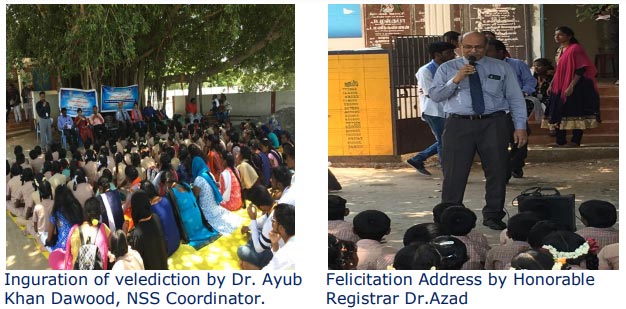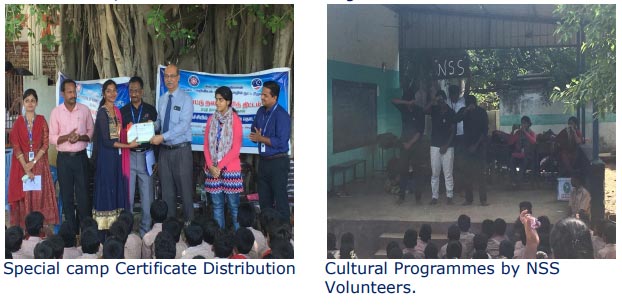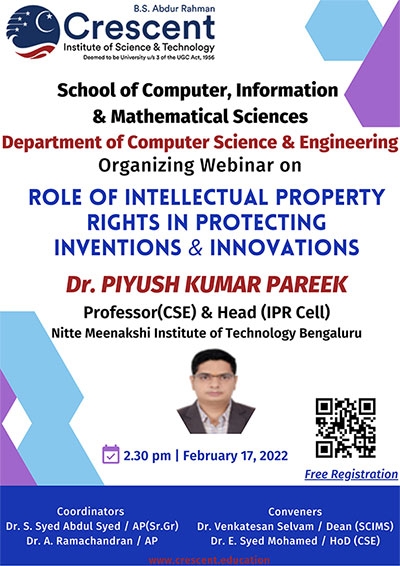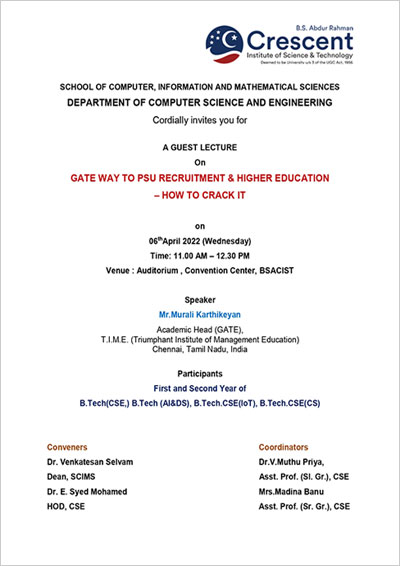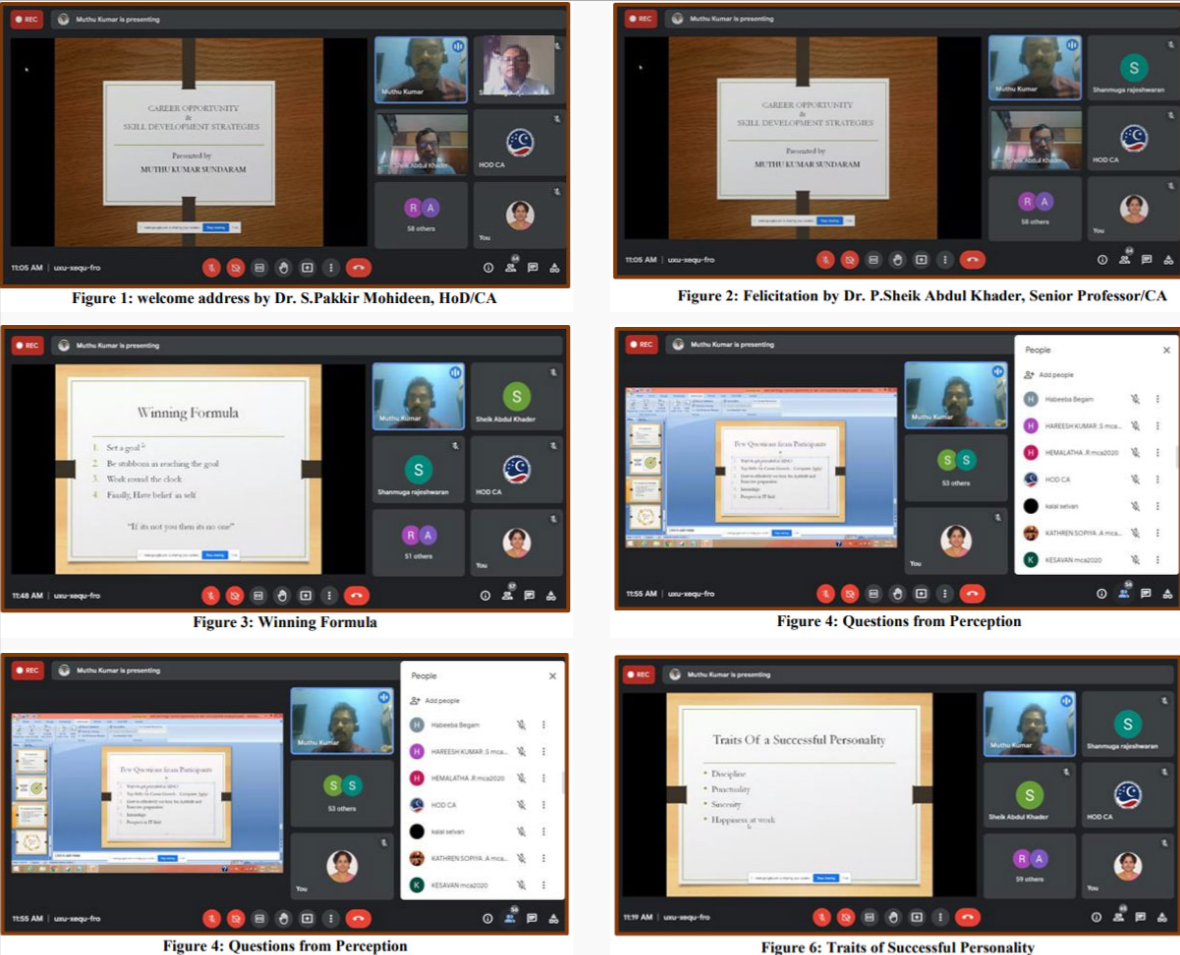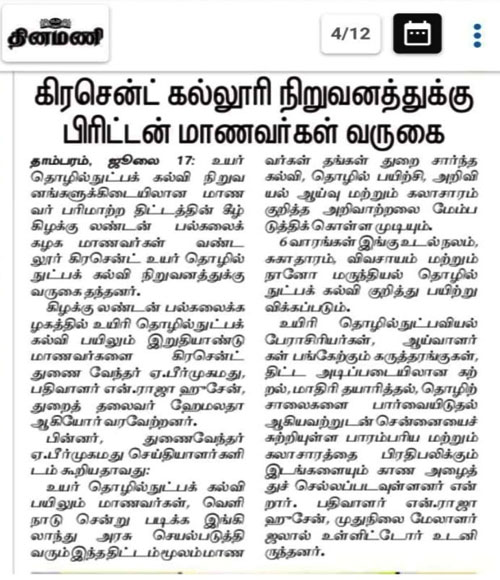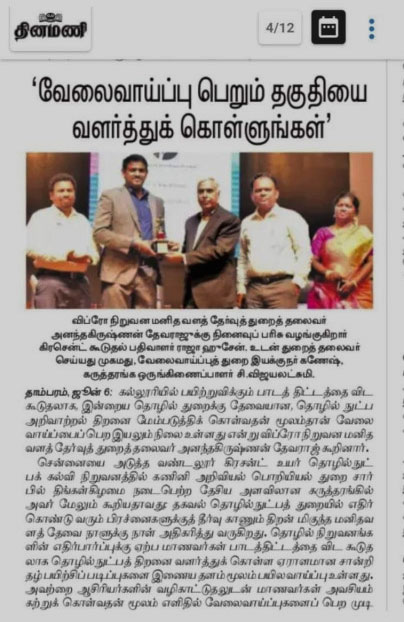Crescent Sustainability Initiatives
Quality Education (SDG 4)

Responsible Executive : Director (IQAC)
Responsible Office : Internal Quality Assurance Cell, Student Affairs, Estate Office, Academic Office, Library and SDG Cell
Contacts : Registrar, Director (IQAC)
4.1 STATEMENT OF POLICY
- Ensure that all girls and boys complete free, equitable and quality primary and secondary education leading to relevant and Goal-4 effective learning outcomes
- Ensure equal access for all women and men to affordable and quality technical, vocational and tertiary education, including university
- Substantially increase the number of youth and adults who have relevant skills, including technical and vocational skills, for employment, decent jobs and entrepreneurship
- Eliminate gender disparities in education and ensure equal access to all levels of education and vocational training for the vulnerable, including persons with disabilities, indigenous peoples and children in vulnerable situations
- Ensure that all youth and a substantial proportion of adults, both men and women, achieve literacy and numeracy
- Ensure that all learners acquire the knowledge and skills needed to promote sustainable development, including, among others, through education for sustainable development and sustainable lifestyles, human rights, gender equality, promotion of a culture of peace and non-violence, global citizenship and appreciation of cultural diversity and of culture’s contribution to sustainable development
- Build and upgrade education facilities that are child, disability and gender sensitive and provide safe, nonviolent, inclusive and effective learning environments for all
- Substantially expand globally the number of scholarships available to developing countries, in particular least developed countries, small island developing States and African countries, for enrolment in higher education, including vocational training and information and communications technology, technical, engineering and scientific programmes, in developed countries and other developing countries
- Substantially increase the supply of qualified teachers, including through international cooperation for teacher training in developing countries, especially least developed countries and small island developing states.
As per the vision and mission envisaged by its founder, the Institute provides educational opportunities to all, especially the oppressed community and women, without any discrimination. The Institute accommodate more students from the local community, especially women students. The network of our student community spread all over the world proves the inclusive education that we offer on our campus.
The Institute takes pride in providing access to education to all, those who seek knowledge and wisdom, regardless of their ethnicity, religion, community, gender or disability.
‘Unity in diversity’ is continuously practised on our campus to build a sustainable future
As the new team of ISTD-C, Onam was our very first event. The event was held on the 15th of September 2022 (Thursday). The first event was “Pookolam event” that was conducted by the art club in the MS block.
After the pookolam event, the actual ONAM celebrations started in the lunch break i.e., 12:40 pm. It started with the introduction of the event by the voice club heads followed by the chenda melam, which was later followed by the various events like music, dance, and fashion walk. The crowd seemed really excited and engaging.
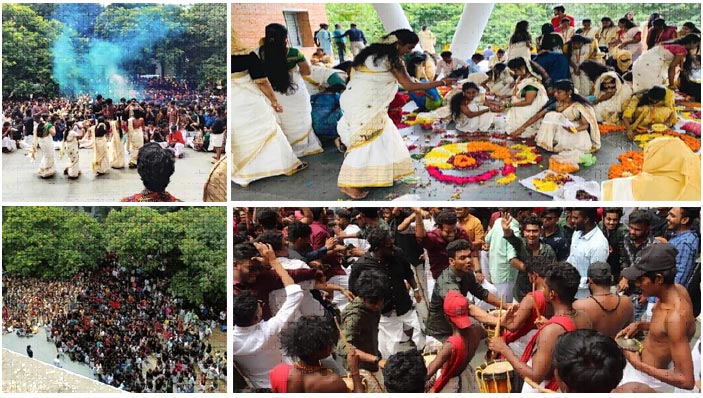
“All our dreams can come true, if we have the courage to pursue them.”
We the Rotaract Club of Crescent, sponsored by Rotary Club of Madras Mount (Rotary International District 3232), had collaborated with Rotaract Club of Madras as Host Club along with 3 other clubs for an online Professional Service Project called “IKIGAI”. This event was held on 25th November 2021 through Zoom meeting.
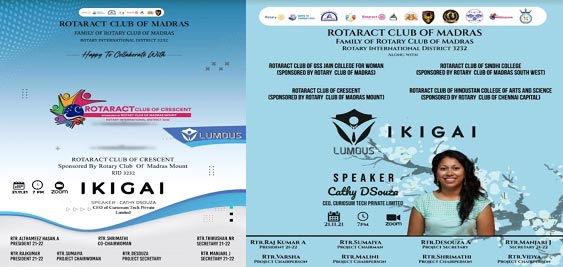
The event started at 7 PM and around 80 participants were present for the session. District Officials, Presidents and Secretaries and fellow rotaractors attended the session. Rtr. Shrimathi was the Co-Chairperson for this Project.


It was a highly motivating session by speaker Cathy DeSouza, CEO of Curiosum Tech Private Limited. Cathy DeSouza detailed upon how she overcame the struggles of being a woman entrepreneur and successfully achieved her dream. She also advised the fellow rotaractors on various topics like mental health, setting priorities, and self-motivation.

We are grateful to the speaker, Cathy DeSouza, for enlightening and motivating us. We thank all the District Officials, Presidents and Secretaries who attended the session. A very special thanks to the board members for giving us their full support to the event by providing their valuable time. We would like to extend our gratitude towards our fellow rotaractors who are the pillar of support for this entire project.
“Passion is the fuel behind a successful career. Do what you love and success will follow.”
Eliminate Gender Disparities In Education
THUNINTHEZHU
“Freedom lies in being bold”
We the Rotaract Club of Crescent, sponsored by Rotary Club of Madras Mount (Rotary International District 3232) has organized an event “Thuninthezhu” a Community Service project. This project was initiated on 1st of July, 2021 (Thursday) at 4.30 PM in Zoom.
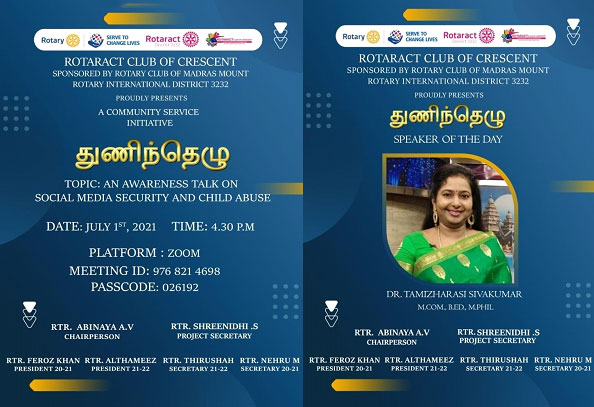
On 29th June, 2021 campaigning was done through social media by our fellow rotaractors. In this pandemic situation, we want to create and share awareness about social media security, women’s safety, child security, so, we organized this event “Thuninthezhu” through online. In order to that we had an educationalist, motivational speaker Dr.ThamizharasiSivakumar as the speaker of the day. Rtr. Abinaya took incharge along with community service team.
We invited our fellow rotaractors, school students and women to take part in this event. Very special thanks to our board members for giving us their full support to the event by providing their valuable time. Also, we would like to thank our fellow rotaractors who are the pillar of support for this entire project.


As per the directions of the National Implementation Committee (NIC), Ministry of Culture, Government of India, National Unity Day is celebrated in India on 31 October to mark the birth anniversary of Sardar Vallabhbhai Patel who had a major role in the political integration of India.This event was organized by the Office of Student Affairs, B.S.Abdur Rahman Crescent Institute of Science & Technology.
An exhibition displaying the contributions of “Sardar Patel – The Architect of Unification” was inaugurated by our Honorable Vice-chancellor Prof Dr. A. Peer Mohamed and Registrar Dr. N. Raja Hussain in the presence of Dr. Karthikeyan Ramalingam, Dean Student Affairs, Dr. Shaheedha, Deputy Dean Student Affairs, Dr. M. Abdur Rahman, Assistant Dean Student Affairs& Dr. Ayub Khan at the ground floor of the convention center building. The inauguration was followed by a very interesting session where students gave inspiring talks on the contributions of Sardar Patel in unifying the princely states of our great nation.
This exhibition was attended by thousands of students and it was on display until 2nd November 2022. Later hundreds of students were made to take an oath on upholding the strength, unity and security of our nation. Following the oath taking event, more than thousand Crescent students participated in the Unity run which was flagged off by our respected Registrar Dr. N. Raja Hussain. The photos of the National Unity Day (RashtriyaEktaDiwas) event are attached herewith.
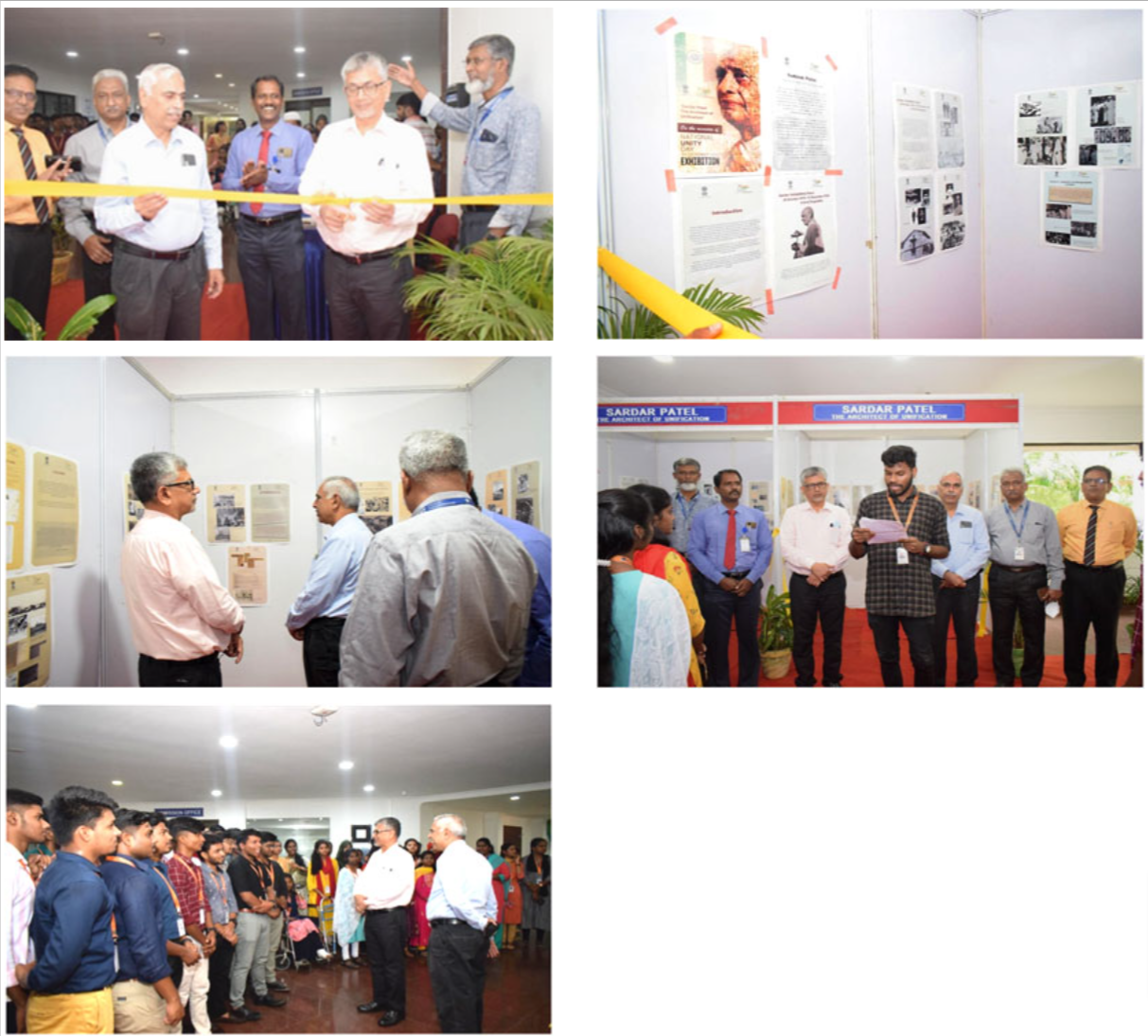
Three-day Certificate Programme on “Entrepreneurial Skill on Geospatial Data Management” was conducted from 23.02.2022 to 25.02.2022 by the Department of Civil Engineering, School of Infrastructure. Resource persons from various institutes such as Dr. G. P. Ganapathy, Professor& Director, Centre for Disaster Mitigation and Management, Vellore Institute of Technology, Dr. Pennan Chinnasamy, Assistant Professor, IIT Bombay, Director – Rural Data Research and Analysis (RuDRA) Labs, Ms. K. Kanmani, Assistant Professor, BSACIST, Dr. M. Sivakumar, Project Scientist, Institute of Remote Sensing, Anna University, Mr. T. Rajesh, Technical Director & Business Development Manager, Geo Lightning Services, Mr. B. Kannadasan, Assistant Professor, BSACIST, Mr. S. Rajesh Kumar, Director, Technical Sales, TechApps Consulting, Bentley Channel Partner and Dr. Iyappan Lakshmanan, Principal Consultant, Magendiran Consultancy Services gave lectures. More than 130 participants from various institutes attended and got benefitted.
Certificate Course in Medical Biomaterials
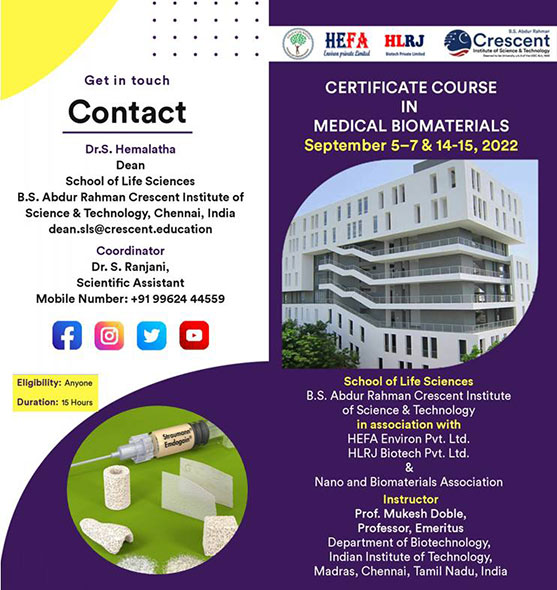
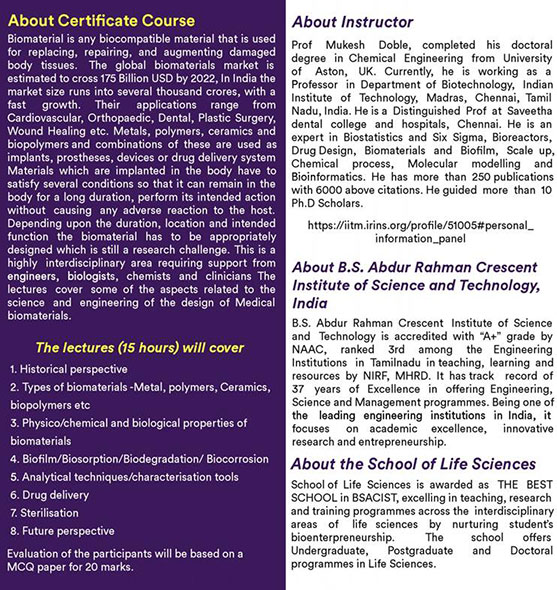
Online Certificate Course on LABVIEW Associate Developer (CLAD)
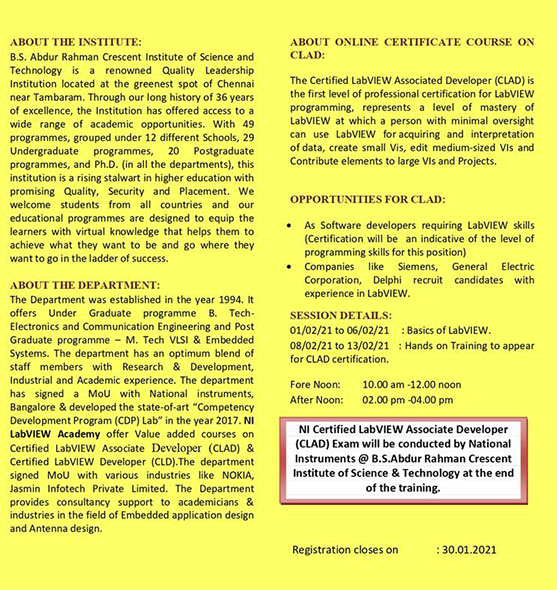
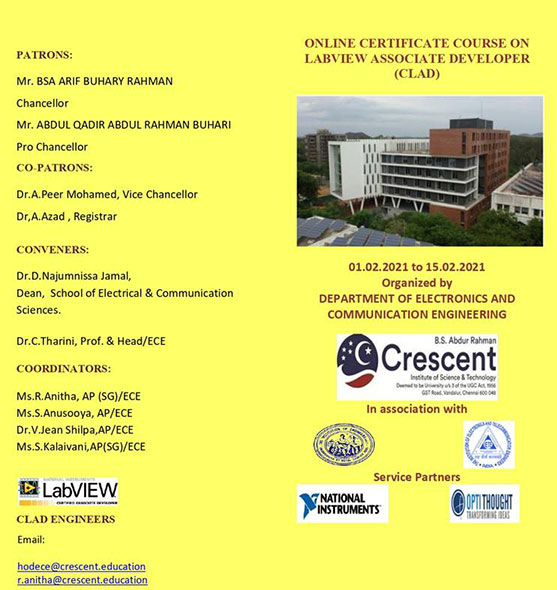
In collaboration with the Chengalpattu district Labour Welfare and Skill Development Department, B.S.Abdur Rahman Crescent Institute of Science & Technology organized a MEGA JOB FAIR for private sector on sunday (20.03.2022).
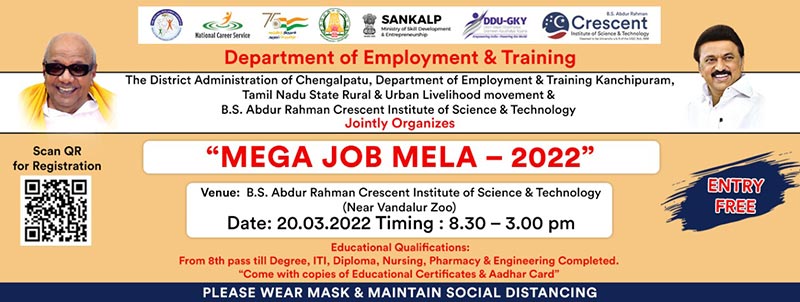
Tamil Nadu Chief Minister Thiru. M.K. Stalin has inaugurated a mega job fair for private sector, said providing everyone a job that suits their qualification, was his government’s aim and his government was improving school and college education towards achieving it. He also inaugurated the programme telecast by Kalvi TV for the benefit of candidates, preparing for various competitive exams.
Minister for MSME T.M. Anbarasan, MP G. Selvam, legislators S.R. Raja, Varalakshmi Madhusudhanan, S.S. Balaji, I. Karunanithi, C.V.M.P. Ezhilarasan, M. Babu, Tambaram Mayor K. Vasanthakumari and Deputy Mayor G. Kamaraj, Labour Secretary Kirlosh Kumar, Director of Employment and Training K. Veera Raghava Rao, Chengalpattu Collector A.R. Rahul Nadh, B.S.Abdur Rahman Crescent Institute of Science & Technology (deemed university) Chancellor Mr. BSA Arif Buhary Rahman and other senior officials were present on this occasion.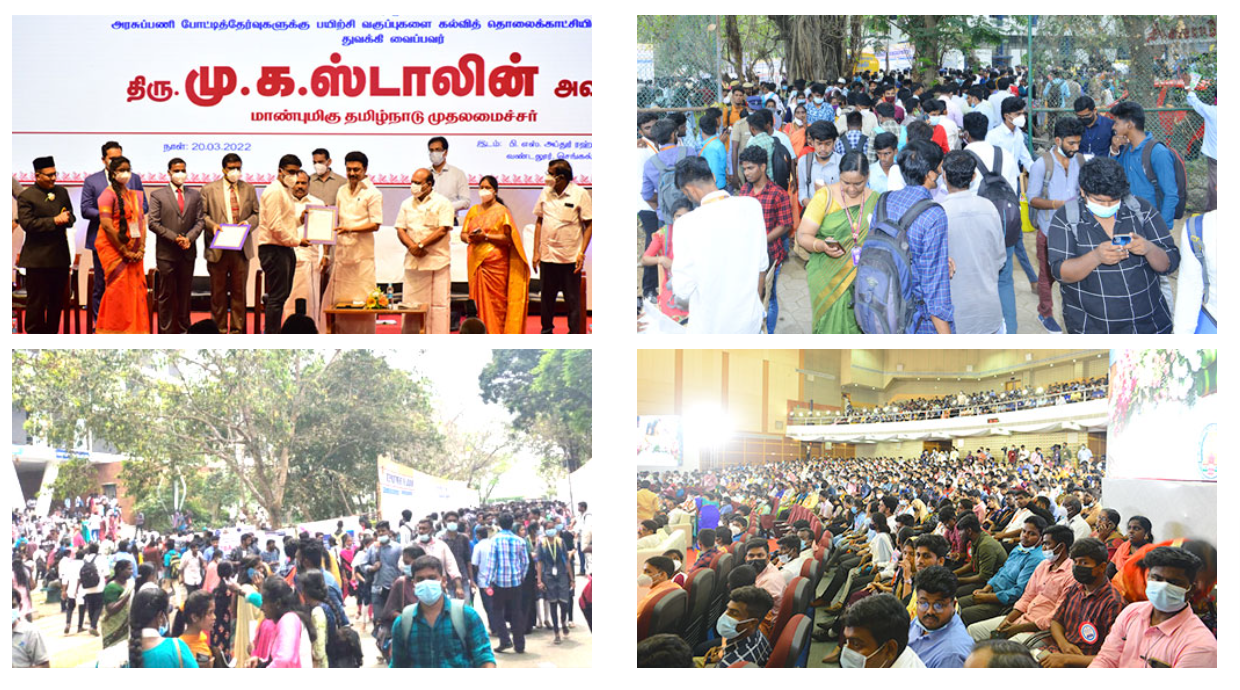
Figure IV – 11: Photographs showing the few snapshots of MEGA JOB MELA – 2022: Inaugural session, Public gathering participated in the MELA.
We are happy to share that we have received an Appreciation Certificate from Thiru. C. V. Ganesan, Hon’ble Minister for Labour Welfare, Population, Employment and Training, Census, Urban and Rural Employment, Thiru R. Kirlosh Kumar, IAS., Secretary to Government, Employment and Training, Thiru. K.Veera Raghava Rao, I.A.S, Director of Employment & Training, Govt. of Tamil Nadu & their team today (31 March 2022).

Figure IV – 12: Appreciation Certificate received from the Government of Tamil Nadu for providing the campus for conducting Job Mela.
The highlight of the event was the mention by the Hon’ble Chief Minister & Minister that such a job mela is the first of its kind in Tamilnadu and Crescent University associated with it and supported in successful conduct of the event. Crescent University is the first University to receive such an appreciation certificate from the Government of Tamilnadu. The Appreciation certificate was handed over to our Hon’ble Vice-Chancellor & team.
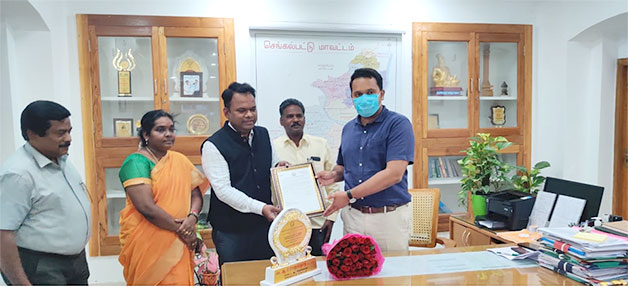
Following are the two objectives related to public access to the resources.
To ensure that access to various facilities, resources, and activities is accessible to all (Faculty, staff, students, alumni and public) regardless of ethnicity, religion, disability, immigration status or gender.
To start Libraries/Digital Libraries and reading rooms for the use of the Public in general.
These objectives were extracted from the Memorandum of Association of the sponsoring body of the Institution and the Rules and Regulations of the statutory body implemented by the Institution.
The University takes great pride in making the world know that the resources of the University can be used even by persons who are not studying on campus. The facility is open to all irrespective of any discrimination. Therefore, the University envisages the promotion of not only its students but whoever is interested in educating themselves.
The aim is precisely, the welfare of society as a whole. For the same reason, it provides huge access not alone to the library but also to the online courses, video lecture materials and other facilities which students/the public want to access. Any student who is endowed with intellectual ability is promoted and encouraged to navigate his skills and achieve great success.
The University has been organizing events in the public domain by conducting public lectures, various events, and educational events and ensure maximum public participation. The University also offers vocational training to the public, free of cost and this has enabled many persons to secure jobs and earn their livelihood. Many families are benefitted from this and in this way the University ensures that it is always in the service of the community. The various departments of the University have also organized many extension activities beyond the campus which has benefitted the students in the nearby schools, the people of small hamlets in the vicinity of the University, the small towns and the city areas which is appreciated by the people who are the beneficiaries of such activities.
Last but not the least, the University takes pride in providing access to education to all, those who seek knowledge and wisdom, regardless of their ethnicity, religion, community gender or disability. This was the vision and mission envisaged by its founders.
School of Mechanical Sciences:
![]()
School of Infrastructure:
![]()
School of Social Sciences and Humanities:
![]()
Crescent School of Pharmacy:
![]()
School of Physical and Chemical Science:
![]()
Crescent School of Business:
![]()
School of Electrical and Communication Sciences:
![]()
School of Computer Information and Mathematical Sciences:
![]()
School of Life Sciences:
Others:
![]()
Click here to view the Website
eBooks
The revolution, which took place in information and communication technology (ICT) has made a paradigm shift in the route to access library & information centres. Realizing the importance of e-access and its advantages, the library has shifted its focus towards open access as well paid subscription to e-Books.
![]()
- National Digital Library of India
- PDF Drive
- Pharmacy
- Engineering – Bookboon
- Engineering – Free-Ebooks.net
- Business & Investing
- Computers Science & Internet
- Directory of Open access Books
- e-Book Lobby containing collection of various subjects.
- Engineering & Technology – Semrush
- Free Online Computer Science & programming Books – Welcome To Freetech Books
- Free Computer Books – Free Technical Publication
- Get Free EBooks
- Globusz is a unique e-Publishing house, specializing in free e-Book downloads
- Gutenberg- more than 20,000 public domain books that are out of copyright and also world’s greatest fiction available.
- Health, Mind & Body
- History
- Humanities
- Law
- Literature & Fiction
- Many Books provides more than 20,000 e-books in various subjects
- Mathematics
- Medical Science
- Nonfiction
- Online Books for children – Big Universe
- Online Computer Books contains details about free computer books
- Online Free E-Books provides various subject e-books
- Open Book Publishers – Publishing open access academic books in the humanities and social sciences.
- Outdoors & Nature
- Pure Science
- Religion & Spirituality
- Scribed, the online document sharing site which supports Word, Excel, PowerPoint, PDF and other popular formats.
- Science & Engineering books for free download
- The Online Books Page is a Listing over 30,000 free books on the Web
- The Public Library and Digital Archive
- Topics like biography, fiction, games, history or tutorials etc.
- Tourism & Travel
- Eduinformer
e-Journals
![]()
- Indian Academy of Science Journals
- NISCAIR Research Journals
- MIT Open Courseware
- Directory of Open Access Journals
- National Digital Library (NDL)
- National Science Digital Library
- KHAN Academy
- Electronic Resources for Mathameticians Science
- Springer Open Access Journals
- Free On-line Chemistry journals
- Wiley Open Access Journals
- Taylor & Francis Open Access Journals
- International Network for the Availability of Scientific Publications (INASP)
- INSPIRE- HEP L iterature Database
- Open Access Journals (various subjects)
- NPTEL Audio & Video Course Materials
- Scientific Research Publications
- Molecular Diversity Preservation International (MDPI)
- National Preservation Office – NPO
- Nature Proceedings – Preprint server for the Life Science community.
- Nature Publishing Group – Open Access Journals
- Nutrition Bytes – Free full text
- OMICS Publishing Group – Open Access Journals
- Open Access Library (OALIB) – Free Access to 263,388 Academic Articles
- Open Science Directory – Developed by EBSCO and the Hasselt University Library
- Palgrave Macmillan – Open Access Journals
- Physics related free access journals
- Public Library of Science – premier open-access journals in Biology and Medicine
- Publisher of more than 150 peer-reviewed Open Access Journals
- SAGE Open Subject Collections
- Social Science Research Network (SSRN) – Worldwide dissemination of social science research.
- Springer Open gives you free access in Science, Technology and Medicine.
- The African Journal Archive
- University of Tennessee – Research Guides – Citation Formats and Style Manuals, Databases and other e-resources collection.
- Wiley Open Access Journal
PhD Theses of B S Abdur Rahman Crescent Institute of Science & Technology
![]()
E-Theses
![]()
OLD QUESTIONS
![]()
E-Patents
![]()
| Canadian, European, Indian Patent design and trademark office, Internet sites for patent search, United States, WIPO PCT database |
E-Reference
![]() Free Online Courses
Free Online Courses
- Cambridge Dictionaries Online
- Foreign Language Dictionary-French
- Foreign Language Dictionary-Spanish
- Glossary
- Librarian’s Index to the Internet
- Merriam-Webster
- One Look Dictionaries
- Scholarpedia
- Subject Dictionary-Business/Finance
- Subject Dictionary-Library and Information Science
- Subject Dictionary-Medical Science
- Subject Dictionary-Science
- Subject Dictionary-Technology
- Wikipedia
E-NewsPaper
About 10,000 newspapers worldwide
Free Online Courses
![]()
| Swayam, NPTEL, Coursera, Khan Academy, Edx, Academicearth |
Research Support Resources
Plagiarism
![]()
| About Plagiarism, Turnitin – Plagiarism Checker |
Journal Finder
![]()
Journals List
![]()
| Scopus Indexed Journals, Web of Science Indexed Journals, UGC CARE Journals |
Reference Management Tools
![]()
| Mendeley, EndNote, ReadCube Papers, Zotero |
Writing Tools
![]()
| Grammarly, Wordtune, Prowritingaid, Ginger |
Citation Generator
![]()
| Citation Machine, Bibliography, Easy Bib |
Fellowships and Scholarships
![]()
Learning Support Resources
![]()
| National Digital Library, One India One Digital Platform, Spoken Tutorial, NPTEL, SWAYAM e-PG Pathshala, Virtual Labs, Talk to Teacher |
Study Materials for Competitive Exams
![]()
| ICT Initiatives of Ministry of Education, Government of India |
| Copyright Guide for Indian Libraries |
The main objective of ‘Resources on Demand’ scheme is to empower the rural community by providing authentic information to support their day-today life. Keeping the above in mind, the Central Library will provide resources / information without violating the copy-right act. Those who need any resources are requested to contact the Librarian at librarian@crescent.education
Academic Year 2020-21
School of Mechanical Sciences:
School of Infrastructure:
School of Social Sciences and Humanities:
Crescent School of Pharmacy:
School of Physical and Chemical Science:
Crescent School of Business:
School of Electrical and Communication Sciences:
School of Computer Information and Mathematical Sciences:
School of Life Sciences:
Others:
eBooks
The revolution, which took place in information and communication technology (ICT) has made a paradigm shift in the route to access library & information centres. Realizing the importance of e-access and its advantages, the library has shifted its focus towards open access as well paid subscription to e-Books.- National Digital Library of India
- PDF Drive
- Pharmacy
- Engineering – Bookboon
- Engineering – Free-Ebooks.net
- Business & Investing
- Computers Science & Internet
- Directory of Open access Books
- e-Book Lobby containing collection of various subjects.
- Engineering & Technology – Semrush
- Free Online Computer Science & programming Books – Welcome To Freetech Books
- Free Computer Books – Free Technical Publication
- Get Free EBooks
- Globusz is a unique e-Publishing house, specializing in free e-Book downloads
- Gutenberg- more than 20,000 public domain books that are out of copyright and also world’s greatest fiction available.
- Health, Mind & Body
- History
- Humanities
- Law
- Literature & Fiction
- Many Books provides more than 20,000 e-books in various subjects
- Mathematics
- Medical Science
- Nonfiction
- Online Books for children – Big Universe
- Online Computer Books contains details about free computer books
- Online Free E-Books provides various subject e-books
- Open Book Publishers – Publishing open access academic books in the humanities and social sciences.
- Outdoors & Nature
- Pure Science
- Religion & Spirituality
- Scribed, the online document sharing site which supports Word, Excel, PowerPoint, PDF and other popular formats.
- Science & Engineering books for free download
- The Online Books Page is a Listing over 30,000 free books on the Web
- The Public Library and Digital Archive
- Topics like biography, fiction, games, history or tutorials etc.
- Tourism & Travel
- Eduinformer
e-Journals
- Indian Academy of Science Journals
- NISCAIR Research Journals
- MIT Open Courseware
- Directory of Open Access Journals
- National Digital Library (NDL)
- National Science Digital Library
- KHAN Academy
- Electronic Resources for Mathameticians Science
- Springer Open Access Journals
- Free On-line Chemistry journals
- Wiley Open Access Journals
- Taylor & Francis Open Access Journals
- International Network for the Availability of Scientific Publications (INASP)
- INSPIRE- HEP L iterature Database
- Open Access Journals (various subjects)
- NPTEL Audio & Video Course Materials
- Scientific Research Publications
- Molecular Diversity Preservation International (MDPI)
- National Preservation Office – NPO
- Nature Proceedings – Preprint server for the Life Science community.
- Nature Publishing Group – Open Access Journals
- Nutrition Bytes – Free full text
- OMICS Publishing Group – Open Access Journals
- Open Access Library (OALIB) – Free Access to 263,388 Academic Articles
- Open Science Directory – Developed by EBSCO and the Hasselt University Library
- Palgrave Macmillan – Open Access Journals
- Physics related free access journals
- Public Library of Science – premier open-access journals in Biology and Medicine
- Publisher of more than 150 peer-reviewed Open Access Journals
- SAGE Open Subject Collections
- Social Science Research Network (SSRN) – Worldwide dissemination of social science research.
- Springer Open gives you free access in Science, Technology and Medicine.
- The African Journal Archive
- University of Tennessee – Research Guides – Citation Formats and Style Manuals, Databases and other e-resources collection.
- Wiley Open Access Journal
PhD Theses of B S Abdur Rahman Crescent Institute of Science & Technology
E-Theses
OLD QUESTIONS
E-Patents
| Canadian, European, Indian Patent design and trademark office, Internet sites for patent search, United States, WIPO PCT database |
E-Reference
- Cambridge Dictionaries Online
- Foreign Language Dictionary-French
- Foreign Language Dictionary-Spanish
- Glossary
- Librarian’s Index to the Internet
- Merriam-Webster
- One Look Dictionaries
- Scholarpedia
- Subject Dictionary-Business/Finance
- Subject Dictionary-Library and Information Science
- Subject Dictionary-Medical Science
- Subject Dictionary-Science
- Subject Dictionary-Technology
- Wikipedia
E-NewsPaper
About 10,000 newspapers worldwide Free Online Courses| Swayam, NPTEL, Coursera, Khan Academy, Edx, Academicearth |
Research Support Resources
Plagiarism| About Plagiarism, Turnitin – Plagiarism Checker |
| Scopus Indexed Journals, Web of Science Indexed Journals, UGC CARE Journals |
| Mendeley, EndNote, ReadCube Papers, Zotero |
| Grammarly, Wordtune, Prowritingaid, Ginger |
| Citation Machine, Bibliography, Easy Bib |
Learning Support Resources
| National Digital Library, One India One Digital Platform, Spoken Tutorial, NPTEL, SWAYAM e-PG Pathshala, Virtual Labs, Talk to Teacher |
Study Materials for Competitive Exams
| ICT Initiatives of Ministry of Education, Government of India |
| Copyright Guide for Indian Libraries |
B.S. Abdur Rahman Crescent Institute of Science and Technology ensures that all learners acquire the knowledge and skills needed to promote sustainable development, including, among others, through education for sustainable development and sustainable lifestyles, human rights, gender equality, promotion of a culture of peace and non-violence, global citizenship and appreciation of cultural diversity and of culture’s contribution to sustainable development.

We the Rotaract Club of Crescent, sponsored by Rotary Club of Madras Mount (Rotary International District 3232) along with 12 other clubs has organized an event “PINK – Particular Information Need and Knowledge”, an International service project. This project was held on 10th and 11th of December 2021. This project was conducted to spread the awareness about the Gender Equality, Mensural Health & Hygiene and Elevate Rotaract. The sessions were much effective and efficient to the current day of living.
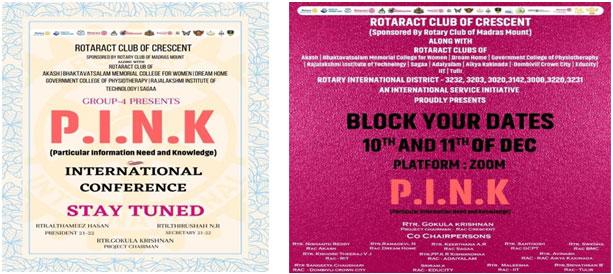
DAY-1
The first day is on 10th December 2021 where, 2 eminent speakers Rtn/Rtr. PDRR. Subhadra Marimuthu Karthik and Rtn.Saradha Ramani took sessions on Gender Equality and Menstrual Health & Hygiene.The speakers made the topic very clear and the sessions were enlightening. Total number of beneficiaries were 115.
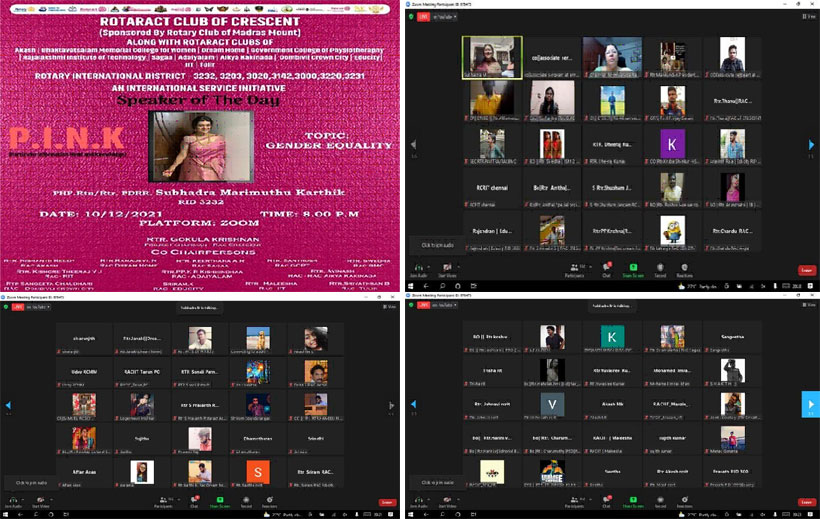
DAY- 2
The second day is on 11th December 2021 where Rtn/Rtr. PDRR. Girish E took a session about the future of rotaract “ELEVATE ROTARACT”. His session was so knowledgeable that made everyone understandable. Total number of beneficiaries were 75.

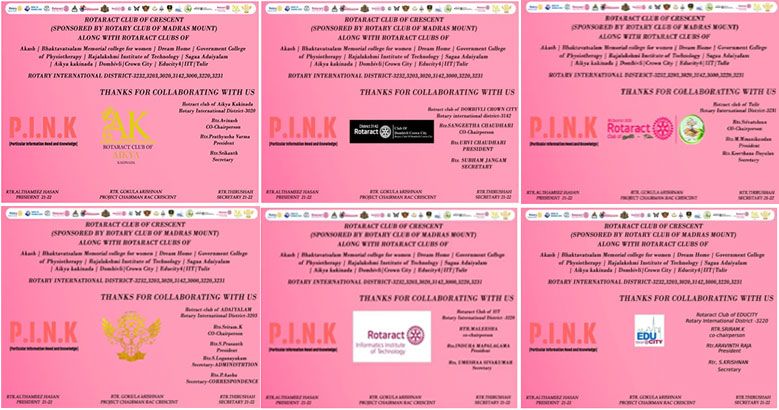
 |  |
Crescent School, Vandalur, Chennai (16.03.2022)
Career guidance and quiz programme for the Plus Two students were also organized by EEE department of B.S.Abdur Rahman Crescent institute of science and technology on 16.3.2022. The event started with formal inaugural address by the Vice Principal of the School followed by the career guidance speech delivered by Dr. Jennathu Beevi AP(Sr.Grade)/EEE. Later on Dr.Shafeeque Ahamed AP/EEE delivered a lecture on “Electrostatics” to plus two students. Then quiz competition was conducted by Mr.S.Suresh, AP/EEE and Dr.K.Shafeeque Ahamed AP/EEE . Around 60 students participated enthusiastically in the quiz competition . Finally the students with top score were awarded with cash prizes.
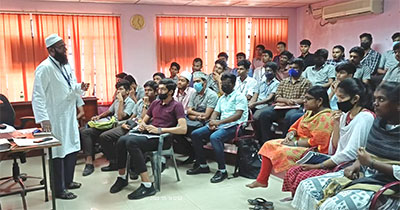
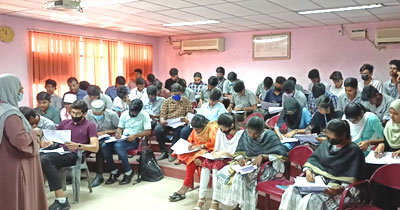


Academic Year 2020-21
| Name of the Eminent Speaker | Topics |
|---|---|
| Dr. DP Agarwal Ex-Chairman, UPSC, New Delhi | Evolution of NEP in India & their impacts |
| Dr. Dinesh K. Paliwal Former Member Secretary, NBA, New Delhi | Benefits of NEP 2020 to the Stakeholders |
| Prof. S. P. Thyagarajan Chancellor, Avinashilingam Institute of Home Science & Higher Education for Women, Coimbatore | Overview of NEP 2020 – The HEIs Perspective |
| Dr. S. J. Thiruvengadam Dean – Academic Process Thiagarajar College of Engineering, Madurai | Revamping of Curriculum aligning with NEP 2020 |
| Dr. Siby John Director (Ad- Interim) Punjab Engineering College, Chandigarh | Implementation of NEP 2020 in HEIs |
- Around 650 participants including Vice Chancellors, Directors, Deans, Head of the Departments from various colleges / institutes across the Country have participated.
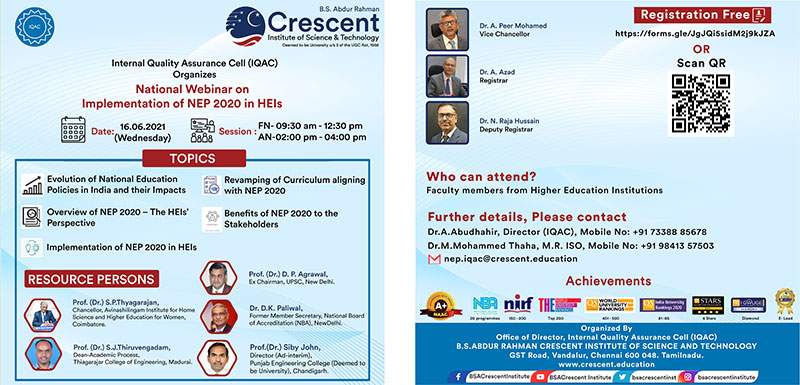

Conducted on 14th June 2021,
Organized by School of Computer, Information and Mathematical Sciences (SCIMS), Department of Computer Applications
Faculty Coordinators: Dr. A.K. Reshmy, AP/CA, Dr. Sudha Rajesh AP/CA, HoD/CA Ms. S. Sabaria, AP/CA
Conveners: Dr. Venkatesan Selvam, Dean/SCIMS, Dr. S. Pakkir Mohideen
Webinar on Development with Environment was held on 14th June 2021, during 11 am – 12.30 pm. The Department of Computer Applications, School of Computer, Information and Mathematical Sciences organized it. The main objective of this webinar is to create awareness among the students to reduce the generation of hazardous wastes.
The Resource Person of the webinar was Ms. Pallavi Rampati, Technical Consultant, Paul-Edu Technology and Management Services, Chennai.
The report discusses about the following aspects of the programme:
![]()
- Course Content and Online Delivery Mode of the Webinar on Development with Environment
- Online Participants Registration Process for the Webinar on Development with
- Certification for the Webinar on Development with Environment
- Analysis of Participants Feedback for the Webinar on Development with Environment
- Sample Screenshots taken during on Development with Environment
This webinar provided the participants with interesting things about environment for healthy living. Resource person started the session with the importance of environment for role in healthy living and the existence of life on planet earth. The speaker explained about the different types of pollution, and its causes and how to live with good environment. Ms. Pallavi, imparted her knowledge on the various initiatives and policies at National and international levels taken in environmental sector. At end of the session, the participants gained knowledge on how to improve the environmental efficiency at global level. The participants were provided with the course content and slides, which were shared online.
The Brochure highlighting the necessary information about the Webinar on Development with Environment was designed and circulated. The Brochure is displayed below:
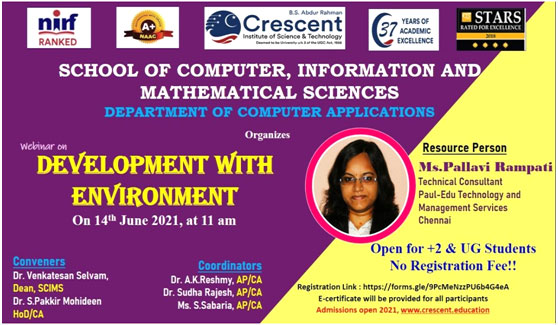
| Summary of Participants | Total No. of Institutions | 06 |
| Participants from other state | 09 | |
| Participants within TamilNadu | 44 |
The details of confirmed participants are given in Annexure A
The certificate was made available to the active participants.
The sample certificate issued to the participants is given in Annexure B
The feedback about the webinar was collected from the participants in order to improve the further conduct of these types of events
| Feedback Points | Analysis | Inference |
|---|---|---|
| How satisfied were you with the event? | 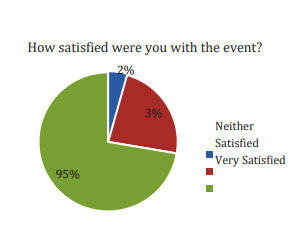 | 95% of the participants were fully satisfied and 3% felt it was very good. Almost 98% of the participants are satisfied with the event. |
| How relevant and helpful do you think it was for your knowledge gaining? | 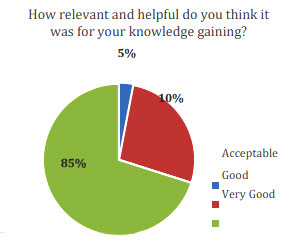 | The session was extremely relevant and helpful to 85% of the participants, and 10% of the participants felt it was very much helpful. Overall 95% participants gained knowledge through this event. |
| How satisfied were you with the session content? | 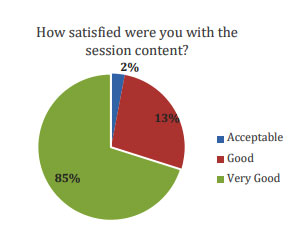 | 85% of the participants felt the session was excellent and 13% felt good. Almost 98% of the participants were very much satisfied with the event. |
| How did you rate the overall assessment of the event? | 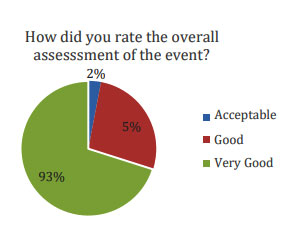 | 93% participants felt it was very good. % of the participants felt overall event is very satisfactory. |
The overall organization and deliverance was satisfying to 95% of participants. Also, the session which was deliberated and given to the participants would really make them to keep and protect their environment for future.
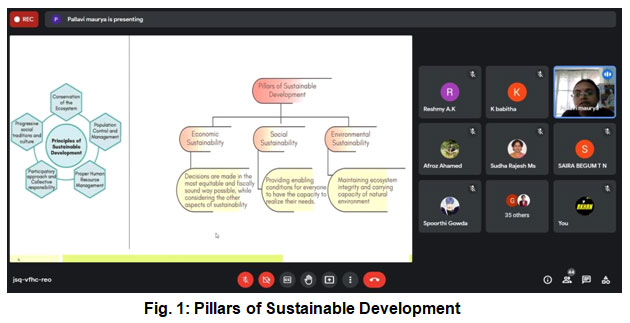
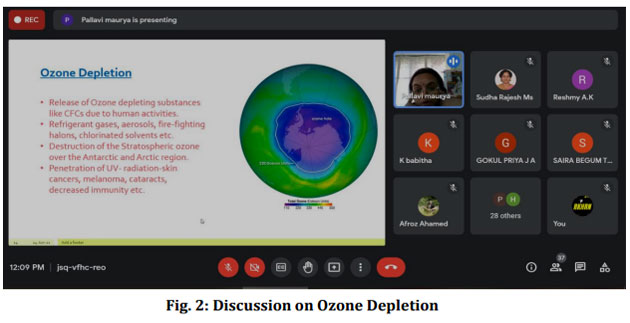
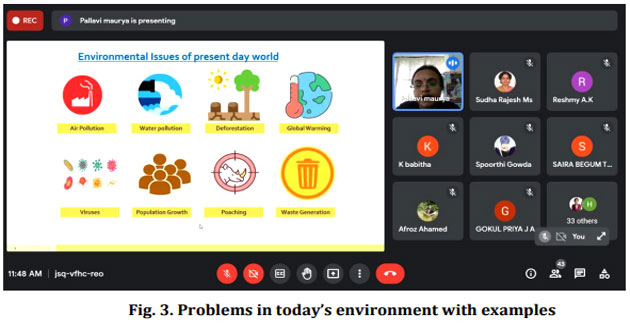
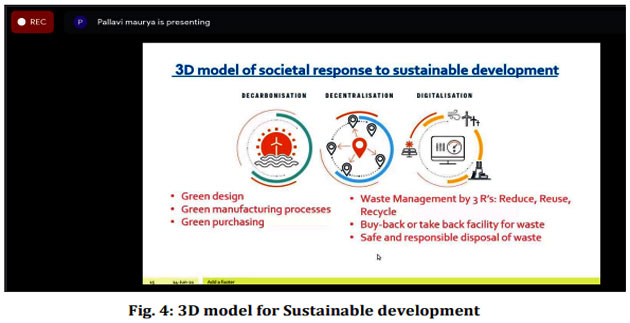
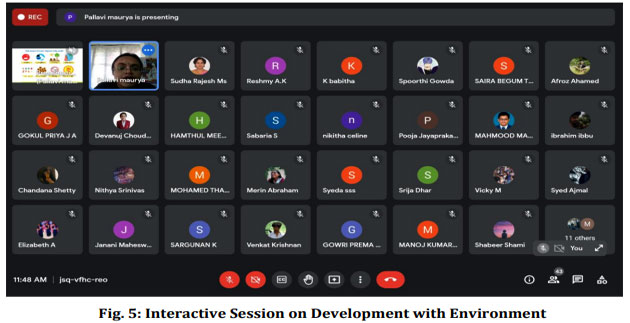
| S.No | Participant Name | Designation | Institution / Organization / School Name | |
|---|---|---|---|---|
| 1 | Mr. Syed Ajmal | Student | B.S. Abdur Rahman Crescent Institute of Science and Technology | syedajmal052000@gmail.com |
| 2 | Mrs. K. Krishna | Assistant Professor | Vivekananda College | krishnaarunphd@gmail.com |
| 3 | Ms. S. Nithya | Student | Mount Carmel College | nithyasrinivas1602@gmail.com |
| 4 | Ms. S. Sabaunnisa | Student | Mount Carmel College | syedsabashabana123@gmail.com |
| 5 | Mr. A. Mohamed Thareek | Student | B.S. Abdur Rahman Crescent Institute of Science and Technology | thareek0711@gmail.com |
| 6 | Mr. S. Akshay Kumar | Student | B.S. Abdur Rahman Crescent Institute of Science and Technology | akshaysubramanian064@gmail.com |
| 7 | Mr. Ibrahim | Student | B.S. Abdur Rahman Crescent Institute of Science and Technology | ibrahim7ibbu7@gmail.com |
| 8 | Mrs. P. S. Sujatha | Assistant Professor | Vivekananda College | brahassujathaps@gmail.com |
| 9 | Mr. Venkatakrishnan | Student | B.S. Abdur Rahman Crescent Institute of Science and Technology | ashokvenkat102@gmail.com |
| 10 | Ms. T. N. Saira Begum | Student | B.S. Abdur Rahman Crescent Institute of Science and Technology | sairabegum2306@gmail.com |
| 11 | Mr. Mahmood Mabrook | Student | B.S. Abdur Rahman Crescent Institute of Science and Technology | mahmoodking26@gmail.com |
| 12 | Ms. R. Surabhi | Student | Mount Carmel College, Bangalore. | surabhirajgopal13@gmail.com |
| 13 | Mr. E. Sharun Pandi | Student | B.S. Abdur Rahman Crescent Institute of Science and Technology | sharunpandi301@gmail.com |
| 14 | Ms. S. Hamthul Meera | Student | B.S. Abdur Rahman Crescent Institute of Science and Technology | meerasp2002@gmail.com |
| 15 | Ms. Gokul Priya | Student | B.S. Abdur Rahman Crescent Institute of Science and Technology | gokulpriyaja@gmail.com |
| 16 | Ms. H. Vazeerunnisha | Student | B.S. Abdur Rahman Crescent Institute of Science and Technology | Vazeerunnisha@gmail.com |
| 17 | Mr. Sargunan | Student | B.S. Abdur Rahman Crescent Institute of Science and Technology | sargudhoni30@gmail.com |
| 18 | Mr. A. Afroz | Student | B.S. Abdur Rahman Crescent Institute of Science and Technology | afrozahamed2017@gmail.com |
| 19 | Ms. K. Sneha | Student | Mount Carmel College Autonomous | snehakarunanidhi26@gmail.com |
| 20 | Ms. Merin Abraham | Student | Mount Carmel College, Bangalore | merinabraham83@gmail.com |
| 21 | Mr. Hariram Narayanan | Student | B.S. Abdur Rahman Crescent Institute of Science and Technology | rkhrn2k@gmail.com |
| 22 | Mr. T. Deepak | Student | B.S. Abdur Rahman Crescent Institute of Science and Technology | deepakthulasingam2001@gma il.com |
| 23 | Mr. R. Gokul | Student | B.S. Abdur Rahman Crescent Institute of Science and Technology | gk1846416@gmail.com |
| 24 | Ms. D. Vinodhini | Student | B.S. Abdur Rahman Crescent Institute of Science and Technology | 02vinodhini06@gimal.com |
| 25 | Ms. J. Poojashree | Student | St. Josephs College of Commerce | poojjayaprakash@gmail.com |
| 26 | Ms. H. Vazeerunnisha | Student | B.S. Abdur Rahman Crescent Institute of Science and Technology | h.vazeerunnisha@gmail.com |
| 27 | Mr. M. Vignesh | Student | B.S. Abdur Rahman Crescent Institute of Science and Technology | vicky.mv311@gmail.com |
| 28 | Ms. K. Sneha | Student | Mount Carmel College Autonomous, Bangalore | snehakarunanidhi26@gmail.com |
| 29 | Mr. K. Ibrahim | Student | B. S. Abdur Rahman Crescent Institute of Science and Technology | ibrahim7ibbu7@gmail.com |
| 30 | Mr. M. K. Aamir Malick | Student | B. S. Abdur Rahman Crescent Institute of Science and Technology | m.aamirmalick@gmail.com |
| 31 | Mr. Jhalak Dutta | Assistant Professor | Heritage Institute of Technology | jhalak.dutta@heritageit.edu |
| 32 | Ms. A. Arshiya Sultana | Student | B. S. Abdur Rahman Crescent Institute of Science and Technology | sultu9242arshiya@gmail.com |
| 33 | Mr. S. Mohan Raj | Student | B. S. Abdur Rahman Crescent Institute of Science and Technology | mohan.cubcads2018@gmail.co m |
| 34 | Ms. R. Hemalatha | Student | B. S. Abdur Rahman Crescent Institute of Science and Technology | hemaram1118@gmail.com |
| 35 | Mr. Mahmood Mabrook | Student | B. S. Abdur Rahman Crescent Institute of Science and Technology | mahmoodking26@gmail.com |
| 36 | Mr. G. Faizal Rahuman | Student | B. S. Abdur Rahman Crescent Institute of Science and Technology | faizalrahuman8@gmail.com |
| 37 | Mr. S. S. Hudaifa Fabin | Student | B. S. Abdur Rahman Crescent Institute of Science and Technology | fabin.cubcads2018@gmail.com |
| 38 | Mr. S. Mohammed Shabeer | Student | B. S. Abdur Rahman Crescent Institute of Science and Technology | shabeershami728@gmail.com |
| 39 | Mr. M. K. R. Thameem Ansari | Student | B. S. Abdur Rahman Crescent Institute of Science and Technology | thameem892148@gmail.com |
| 40 | Mr. A. Kesavan | Student | B. S. Abdur Rahman Crescent Institute of Science and Technology | Kesavankesav14@gmail.com |
| 41 | Mr. M. Vignesh | Student | B. S. Abdur Rahman Crescent Institute of Science and Technology | vicky.mv311@gmail.com |
| 42 | Mr. E. Sharun Pandi | Student | B. S. Abdur Rahman Crescent Institute of Science and Technology | sharunpandi301@gmail.com |
| 43 | Mr.S. M. Abdul Basith | Student | B. S. Abdur Rahman Crescent Institute of Science and Technology | abdulbasithshaha@gmail.com |
| 44 | Ms. Thulashini | Student | B. S. Abdur Rahman Crescent Institute of Science and Technology | thulash297@gmail.com |
| 45 | Mr. Danish Ahmed | Student | B. S. Abdur Rahman Crescent Institute of Science and Technology | danishahamed498@gmail.com |
| 46 | Mr. A. Mohamed Thareek | Student | B. S. Abdur Rahman Crescent Institute of Science and Technology | thareek0711@gmail.com |
| 47 | Ms. K. Latha | Student | B. S. Abdur Rahman Crescent Institute of Science and Technology | latha.cubcads2018@gmail.com |
| 48 | Ms. M. Lavanya | Student | B. S. Abdur Rahman Crescent Institute of Science and Technology | lavanyamahendiran24@gmail.c om |
| 49 | Ms. V. Kiruthika | Student | B. S. Abdur Rahman Crescent Institute of Science and Technology | kikiv070@gmail.com |
| 50 | Ms. S. Divya | Student | B. S. Abdur Rahman Crescent Institute of Science and Technology | divi.saravanan024@gmail.com |
| 51 | Ms. P. Malathi | Assistant Professor | Saveetha School of Engineering | maludhurkka@gmail.com |
| 52 | Dr. N. Noor Alleema | Assistant Professor | SRM Institute of Science and Technology | nooralln@srmist.edu.in |
| 53 | Mr. Jhalak Dutta | Assistant Professor | Heritage Institute of Technology | jhalak.dutta@heritageit.edu |
Sample Participation Certificates:
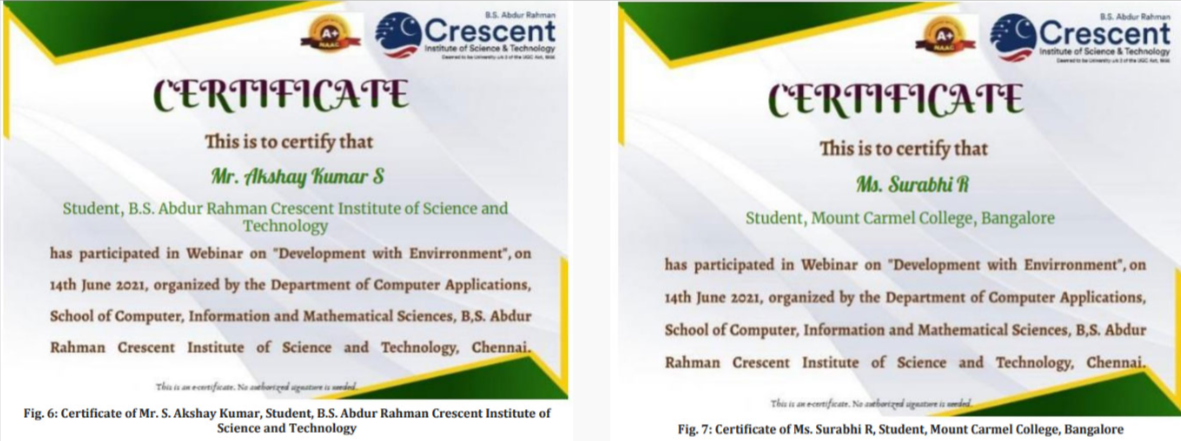
Career Opportunity and Skill Development Strategies
Conducted on 12th June 2021
Organized by School of Computer, Information and Mathematical Sciences (SCIMS), Department of Computer Applications
Faculty Coordinators: Dr. Sudha Rajesh, AP/CA, Dr. P.Amudhavalli, AP/CA
Conveners: Dr. Venkatesan Selvam. Prof & Dean-SCIMS, Dr. S.Pakkir Mohideen, Asso.Prof & Head, CA
Webinar on Career Opportunity and Skill Development Strategies was held on 12th June 2021, during 10.30 am – 12 pm. The Department of Computer Applications, School of Computer, Information and Mathematical Sciences organized the event.
The Resource person of this webinar was, Mr.S.Muthu Kumar, Technology Lead, Infosys Ltd, Chennai
The report discusses about the following aspects of the programme:
![]()
- Course Content and Online Delivery Mode of the Webinar on Career Opportunity and Skill Development
- Online Participants Registration Process for the Career Opportunity and Skill Development
- Certification for the Webinar on Career Opportunity and Skill Development
- Analysis of Feedback from participants for the Webinar on Career Opportunity and Skill Development
- Sample Screenshots taken during Webinar on Career Opportunity and Skill Development
This webinar provided the participants with increasing the present knowledge about the preparation towards the Industry needs. This webinar specially designed for the betterment of student’s career. It helped them to gain knowledge on preparing for an interview and to improve skills.
The Brochure highlighting the necessary information about the Webinar on Career Opportunity and Skill Development Strategies was designed and circulated. The Brochure is displayed below:
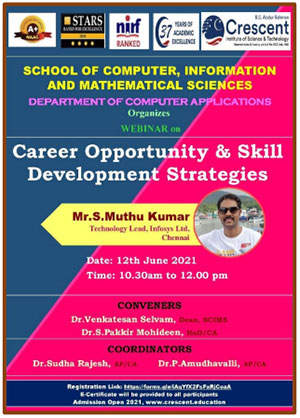
There was no Registration Fee for the participants attending the Webinar on Career Opportunity and Skill Development Strategies, Interested participants were requested to register their details in a google forms which was shared through the link: https://forms.gle/iAqYfX2FsFaRjCoaA. A total of 138 participants have registered for the event and 60 participants attended this Webinar.
| Summary of Participants | 60 students from various Colleges and Universities |
The details of confirmed participants are given below:
| Sl.No. | Name | Designation | Institute name | Mail id |
|---|---|---|---|---|
| 1. | Mr.Abdul Rahman S | Student | B.S. Abdur Rahman Crescent Institute of Science and Technology | abdulrahman74013@gmail.com |
| 2. | Mr Abdullah | Student | Noorul Islam College of Arts and Science | abdullahaboobacker02@gmail.com |
| 3. | Mr Abilash.B | Student | Noorul Islam College of Arts And Science | abilash9381@gmail.com |
| 4. | Mr Abin K | Student | Noorul Islam Collage of Arts and Science | abinksa46@gmail.com |
| 5. | Mr Abinesh. A | Student | Dhanalaksmi Srinivasan Engineering College | abineshanbu6@gmail.com |
| 6. | D.Arunesh | Student | Egs Pillay Engineering College | arunesh14112000@gmail.com |
| 7. | Mr.Dhachanamoorthy V | Student | B.S. Abdur Rahman Crescent Institute of Science & Technology | dhachu.venkatesan@gmail.com |
| 8. | Mr.Dinesh Kumar Purushothaman | Student | Easwari Engineering College | dksuriya009@gmail.com |
| 9. | Mr.Gopi M | Student | B.S. Abdur Rahman Crescent Institute of Science & Technology | gopim2323@gmail.com |
| 10. | Mr.Hareesh Kumar S | Student | B.S. Abdur Rahman Crescent Institute of Science & Technology | hareeshkumar8837@gmail.com |
| 11. | Mr.Kalaiselvan. M | Student | B.S. Abdur Rahman Crescent Institute of Science & Technology | kalaiselvankalai777@gmail.com |
| 12. | Mr.Kesavan A | Student | B.S. Abdur Rahman Crescent Institute of Science & Technology | Kesavankesav14@gmail.com |
| 13. | Mr.Krishna K | Assistant Professor | B.S. Abdur Rahman Crescent Institute of Science & Technology | krishnaarunphd@gmail.com |
| 14. | Mr.Mohamed Haris S | Student | Vivekananda College | 201371601338@crescent.education |
| 15. | Mr.Mohamed Uvais.S | Student | B.S. Abdur Rahman Crescent Institute of Science & Technology | mdys6364@gmail.com |
| 16. | Mr.Mohamed Zubair | Student | University College Of Engineering Bit Campus | smohamedzubair8@gmail.com |
| 17. | Mr.Mugesh | Student | Noorul Islam Collage of Arts and Science | massmugesh97@gmail.com |
| 18. | Mr.Navaneethakrishnan.S | Student | Noorul Islam College of Arts and Science | navaneethakrishnanselvadurai@gmail.com |
| 19. | Mr.Rasith Riswan | Student | Dhanalakshmi Srinivasan Engineering College | rasithriswan@gmail.com |
| 20. | Mr.Shanmugarajeshwaran | Student | Mohamed Sathak Engineering College | Shanmugarajeshwaran4@gmail.com. |
| 21. | Mr.Srinath S | Student | Noorul Islam College of Arts and Science | srinathsrinivasan2017@gmail.com |
| 22. | Mr.Vijay M | Student | Dr.Mahalingam College Of Engineering And Technology | vijayvicky21494@gmail.com |
| 23. | Mr.Vijay V | Student | Dhanalakshmi Srinivasan Engineering College | vijay01nov29@gmail.com |
| 24. | Mr.Vijayanand M | Student | B.S. Abdur Rahman Crescent Institute of Science & Technology | vijayanandmurughan@gmail.com |
| 25. | Ms.Aafreen Shan .A | Student | B.S. Abdur Rahman Crescent Institute of Science & Technology | aafeeluv786@gmail.com |
| 26. | Ms.Ashvika R | Student | B.S. Abdur Rahman Crescent Institute of Science & Technology | ashvika2908@gmail.com |
| 27. | Ms.Bharathi. S. T | Assistant Professor | B.S. Abdur Rahman Crescent Institute of Science & Technology | bharuaswanthi@gmail.com |
| 28. | Ms.Chitra T T | Assistant Professor | Vivekananda College | chitrathirumal25@gmail.com |
| 29. | Ms.Divya.S | Student | Vivekananda College | divi.saravanan024@gmail.com |
| 30. | Ms.Habeeba Begam | Student | B.S. Abdur Rahman Crescent Institute of Science & Technology | habeebabegam10@gmail.com |
| 31. | Ms.Hemalatha R | Student | Noorul Islam College of Arts and Science | hemaram1118@gmail.com |
| 32. | Ms.Jeya Shyla N S | Student | B.S. Abdur Rahman Crescent Institute of Science & Technology | nsjs_shyla@yahoo.com |
| 33. | Ms.Kathren Sopiya A | Student | Nesamony Memorial Christian College | aronkathren@gmail.com |
| 34. | Ms.Krithika. R | Student | B.S. Abdur Rahman Crescent Institute of Science & Technology | krithikazest2003@gmail.com |
| 35. | Ms.Lalitha G | Student | B.S. Abdur Rahman Crescent Institute of Science & Technology | 200282601043@crescent.education |
| 36. | Ms.Latha D | Student | B.S. Abdur Rahman Crescent Institute of Science & Technology | dlathasatheesh@gmail.com |
| 37. | Ms.Malathi P | Assistant Professor | Nesamony Memorial Christian College | maludhurkka@gmail.com |
| 38. | Ms.Radha S | Student | Saveetha School of Engineering | kradhai87@gmail.com |
| 39. | Ms.Ramaneeswari | Student | Kalasalingam Academy of Research and Education | 19ifte075@ldc.edu.im |
| 40. | Ms.Shini Lawrance | Assistant Professor | Ladydoak College | jessiesashni@gmail.com |
| 41. | Ms.Sowmya S | Student | Nesamony Memorial Christian College | sowmiyas81807@gmail.com |
| 42. | Ms.Steffi J | Assistant Professor | Anand Institute of Higher Technology | stefficsc88@gmail.com |
| 43. | Ms.Sujatha P S | Assistant Professor | Sarah Tucker College | brahassujathaps@gmail.com |
| 44. | Ms.Vetha Dharshilin V M | Student | Vivekananda College | vedhadharshilin123@gmail.com |
| 45. | Mr.Jabakar Philipson S | Student | Kvcet | jabakarphilipson25@gmail.com |
| 46. | Mr.Jabinson S | Student | NICAS | jebinsunil@gmail.com |
| 47. | Mr.Jeeva R S | Student | Dr.Mahalingam College of Engineering And Technology, Pollachi | jeeva.sivasubramaniam@gmail.com |
| 48. | Ms.Jency Magdalene J | Student | College of Engineering Guindy | jencymagdalene@gmail.com |
| 49. | Mr.Jenitt.A | Student | Karapaga Vinayaga College of Engineering And Technology | jenittjenitt2128@gmail.com |
| 50. | Mr. Ramkumar | Student | A.M.Jain College | ramkumardhanapandiyan112@gmail.com |
| 51. | Ms.Sonaa R | Student | Jeppiaar SRR Engineering College | sonaaraj156@gmail.com |
| 52. | Ms.Sowmya | Student | Anand Institute of Higher Technology | sowmiyas81807@gmail.com |
| 53. | Ms.Sowmya P | Student | Srm Ist | sowmyapasupathi1011@gmail.com |
| 54. | Ms.Sri Varsha.G | Student | B.S. Abdur Rahman Crescent Institute of Science & Technology | srivarsha865@gmail.com |
| 55. | Ms.Vidavaluru Keerthana | Student | Sree Venkateshwara College Of Engineering | V.keerthanakeerhana@gmail.com |
| 56. | Mr.Saktheeswaran. M | Student | SRM University Ramapuran | Sm3768@srmist edu.in |
| 57. | Ms.Vinosha V. R | Student | Noorul Islam College Of Arts And Science | vinoshavinod2000@gmail.com |
| 58. | Mr.Vinothkrishnan R | Student | B.S.Abdur Rahman Crescent Institute of Science & Technology | vinothkrish1998@gmail.com |
| 59. | Mr.Wahid Basha U | Student | B.S.Abdur Rahman Crescent Institute of Science & Technology | wahidbasha98@gmail.com |
| 60. | Ms.Yamini E | Student | Jeppiaar SRR Engineering College | yamini0331@gmail.com |
The certificate was made available to the active participants. The sample certificate issued to the participants after the successful completion of online test is given below:
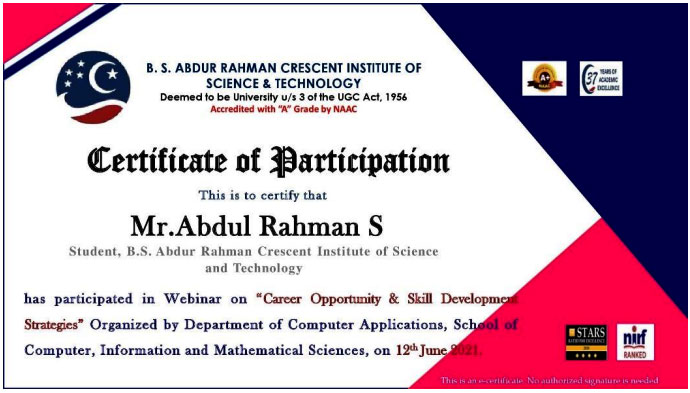
The feedback about the webinar was collected from the participants in order to improve the further conduct of these types of events
| Feedback Points | Analysis | Inference |
| Please rate the speaker’s knowledge of the topic: | 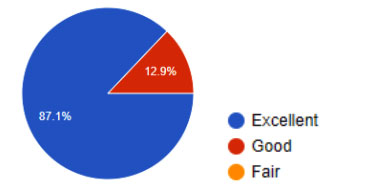 | 87.1% of the participants were fully satisfied and 12.9% felt it was good. |
| Did the session is up to your expectations? | 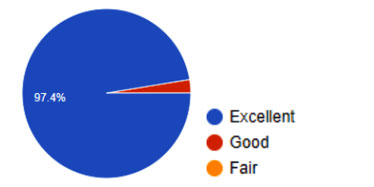 | The session was extremely relevant and helpful to 97.4% of the participants, and only 2.6% of participants felt it was fair. |
| The duration of the event was just right? | 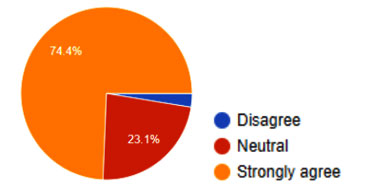 | 74.4% of participants are strongly agreed for the duration, 23.1% were neutral and 2.6% only disagree with the duration. |
| Overall session evaluation | 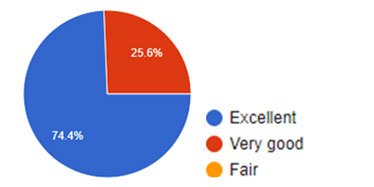 | 74.4% of participants are rated excellent and 25.6% rated as very good. |
| Would you like to join any event like this in future? | 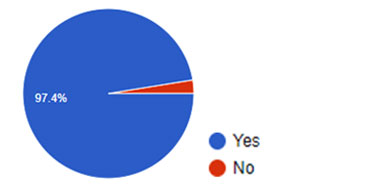 | 97.4% of the participants were eager to participate in the future event, and only 2.6% of participants felt it was fair. |
The overall organization and deliverance was satisfying to 95% of participants. Also, the session which was deliberated and given to the participants can be applied for the career opportunity.
| Date | Name of the Event |
|---|---|
| 26.06.2021 | Cres-Festo 21 |
| 14.06.2021 | Webinar on “Development with Environment” |
| 12.06.2021 | Webinar on “Career Opportunity and Skill Development Strategies” |
| 05.06.2021 | Webinar on Digital learning |
| 03.06.2021 | World Environment Day Celebrations |
| 27.05.2021 | Webinar on “Smartphone Security” |
| (21.05.2021 to 22.05.2021) | First Two day Virtual International Conference on Language, Literature and Cultural Studies in the 21st Century |
| (26.04.2021 to 30.04.2021) | Five Day Online STTP on “Artificial Intelligence and its Impact on Industry 4.0” |
| 27.03.2021 | CIIC 2nd Foundation Day and Demo Day |
22nd October 2022
B.S. Abdur Rahman Crescent Institute of Science and Technology is keen in increasing the number of youth and adults who have relevant skills, including technical and vocational skills, for employment, decent jobs and entrepreneurship. As an initiation, the NSS and Unnath Barath Abhiyan of our institute in collaboration with IIT Bombay Spoken tutorial, has organized three-day Training Program on Basic Computer Education to the Primary School Students of Panchayat union primary school, Thundalkazhani, Karsangal from 19 to 21 October 2022 in our Crescent Campus.
The Training Program was coordinated by Dr. M.S. Haji Sheik Mohammed Dean, Academic Affairs, Dr. Ayub Khan Dawood NSS Coordinator, UBA Coordinators – Dr. Aisha Banu W and Dr. S Sharon Priya and Program Coordinators – Dr. Srinivasan, Dr. Noushad and Ms. Anitha.
DAY 1 – Fadhil Ahmed Abdul Kadar UG Student, explained the basics of using a computer, the understanding of hardware and software components and also various components of a computer to the students. Students were provided with chart presentation tasks for deeper understanding of the concepts to the students.
DAY 2 – Arshad Pervez UG Student, gave a hands-on demo on how to use the internet, the working of a search engine also various tools provided by Google like Gmail, Gdrive, Sheets, Slides and Docs.
DAY 3 – Arun S R UG Student, demonstrated about KTurtle an educational programming platform. The students were taught basic syntax and were given mini tasks to create simple shapes.
A book drive was organized in the institute to populate the school’s library with informative books for the students. Also, the 2nd year students of the CSE department raised funds to provide the school students with new school bags, rain coats and various other stationery items.
The brochure of the programme is given below:
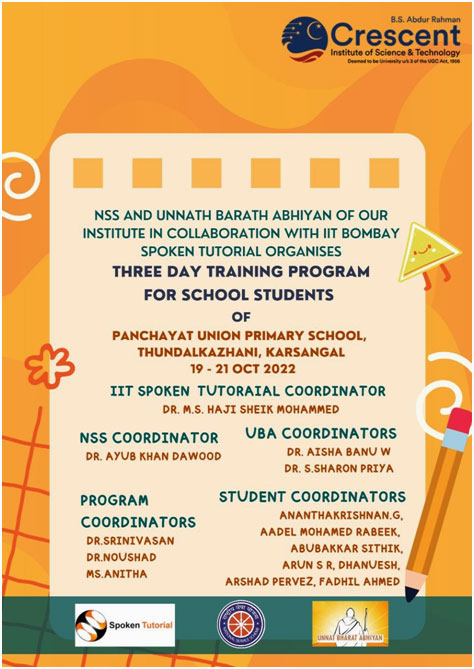
A total of 20 school students benefitted from this Training Program. The details of the participants are given in Annexure A. The certificate was made available to the participants who attended the entire session. The sample certificates issued to the participants are given in Annexure B.
| S.No | Ad.No | Name | B/G | Class |
|---|---|---|---|---|
| 1 | 841 | P. Nisanth | B | 5th Std. |
| 2 | 679 | M.Deepak Kumar | B | 5th Std. |
| 3 | 856 | V. Hemanth | B | 5th Std. |
| 4 | 683 | T. Suriya | B | 5th Std. |
| 5 | 681 | M.Iyappan | B | 5th Std. |
| 6 | 752 | M.Dharshan | B | 5th Std. |
| 7 | 797 | M. Mohammed Satik | B | 5th Std. |
| 8 | 684 | J. Jesin Raj | B | 5th Std. |
| 9 | 838 | K. Farhan Khaif | B | 5th Std. |
| 10 | 839 | K. Fahin Khaif | B | 5th Std. |
| 11 | 677 | M. Varsha | G | 5th Std. |
| 12 | 756 | P.Dharshika Shree | G | 5th Std. |
| 13 | 757 | S.Dhanushka | G | 5th Std. |
| 14 | 754 | A. Sahira Banu | G | 5th Std. |
| 15 | 746 | A. Gajalakshmi | G | 5th Std. |
| 16 | 675 | S. Kalaivani | G | 5th Std. |
| 17 | 849 | S. Kalaivani | G | 5th Std. |
| 18 | 771 | S. Afra | G | 6th Std. |
| 19 | 712 | M. Vaishali | G | 6th Std. |
| 20 | 799 | D. Kalaivani | G | 6th Std. |
The sample certificate issued to the participants after the successful completion of online test:
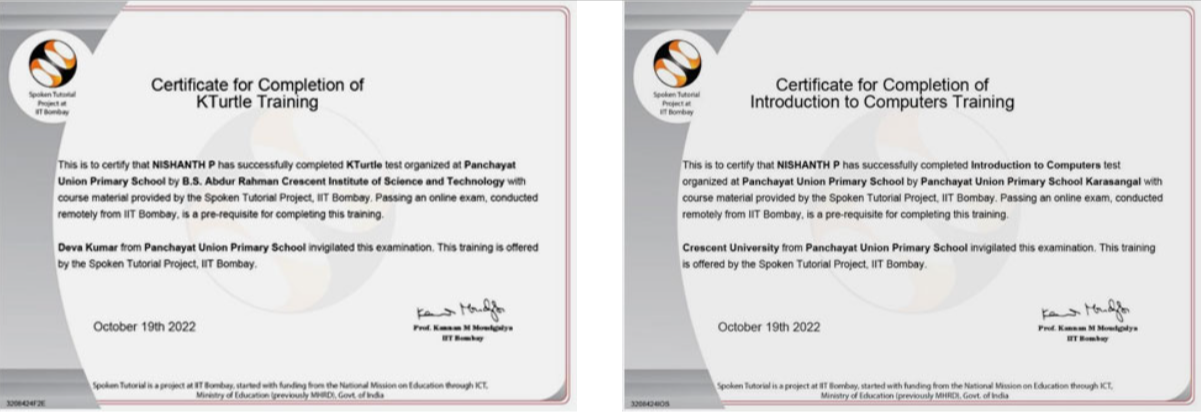
Annexure C shows the pictures of the workshop.
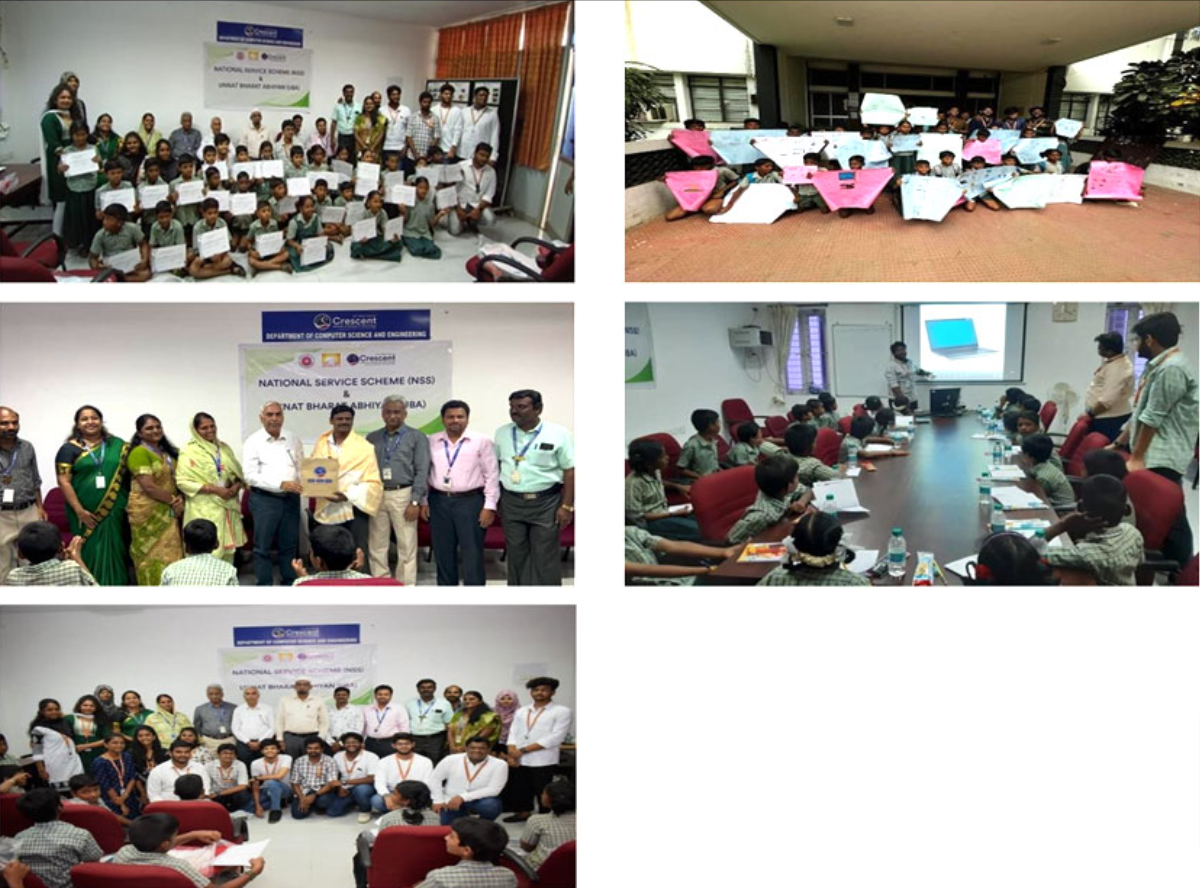
STTP on Artificial Intelligence and its Impact on Industry 4.0
Report for Five Day Online Short Term Training Programme on Artificial Intelligence and its Impact on Industry 4.0
(Technologies and Solution Methodologies for Real-world Scenarios) 26.04.2021 to 30.04.2021
Conducted during 26th – 30th April 2021 Organized by School of Computer, Information and Mathematical Sciences, BSACIST in association with Computer Society of India (CSI) and ICT Academy
| Convenor Dr. Venkatesan Selvam, Dean, SCIMS | Coordinators Dr. Gufran Ahmad Ansari, Prof./CA & Director (CFSC) Dr. S. Revathi, Prof./CSE Dr. N. Ayyanathan, Assoc. Prof/CA | Co-Coordinators Mr. N. Rajendran, AP(Sr.Gr)/IT Dr. A. Ramachandran, AP/CSE Mr. V.M. Niaz Ahamed, AP/CA |
A Five Day Online Short Term Training Programme on Artificial Intelligence and its Impact on Industry 4.0 (Technologies and Solution Methodologies for Real-world Scenarios) 26.04.2021 to 30.04.2021 was organized by School of Computer, Information and Mathematical Sciences, in association with Computer Society of India (CSI) and ICT Academy, through Zoom platform.
The inaugural function was attended by the participants from various institutions and organizations along with faculty members and Heads of the various departments of this prestigious institution of repute with 36 years of academic excellence.
Inaugural Session started with Qirath, followed by Welcome Address by STTP Coordinator, Dr. Gufran Ahamed Ansari, Prof/CA & Director (CFSC). Presidential Address was delivered by Dr. Venkatesan Selvam, Dean, SCIMS. The Chief Guest of the Inaugural function, Dr. Lalith Kumar Singh, Nuclear Scientist, NPCIL (BARC), Department of Atomic Energy, Govt. of India, delivered Keynote address on “Artificial Intelligence for Reliability Analysis of Safety-Critical Systems”. He explained the Markov models on reliability of systems and Petri Nets, which explains about the reliability prediction of safety critical systems. The second session was handled by Dr. Mohanraj Vengadachalam, Data Scientist, Standard Chartered, Chennai, on the topic “Introduction to Industry 4.0 & AI and Industry 4.0 Applications in Image Processing”. Dr. Mohanraj, gave a brief introduction about Computer Vision and he gave several real time applications of Computer Vision.
Post inauguration, after session was started by 2.00 p.m. on 26th April 2021. The title of the invited talk was “Role of Industry 4.0 in Digital Marketing”. The resource person for the session was Mr. V. J. Saravanan, Digital Marketing Strategist, Founder – Managing Director, Four steps Training Solutions.
The second day of the STTP program started with a session on “IoT Powered Energy Analytics” at 10.30. The session was handled by Dr. M.P. Selvan, Professor NIT Trichy. The session started with the Intrusion of Communication Technology in Power Sector. Ms. R. Ramakala, IoT Trainer, Skill Technica handled the second session, on the topic “IoT for computational Intelligence”. She gave a brief introduction about IoT, AI and ML and explained several real time applications of Artificial Intelligence and Machine Learning.
Day 3 forenoon session was delivered by Mr. Siva Prasath. CEO, Jothana Software Pvt. Ltd, Chennai, on “Advanced Machine Learning Techniques Data Science, Data Analytics, AI & Python Basics”. He gave introduction about python with hands on using Jupyter Notebook. He continued with post lunch session on “Introduction to NumPy and Pandas, Predictive analysis, Linear Regression, Logistic Regression and Model Creation”.
Day 4, session started with “Cyber Security Attacks Detection and Mitigation” by Dr.S.Sibi Chakkaravarthy, Cyber Security Consultant. He took over the post lunch session on the topic “AI Powered Malware Analysis”.
The last day of the STTP Programme Day 5, Resource person was Mr. Arshad Sarfarz Ariff, Senior Technology Architect, Infosys Ltd., on the topic “Introduction to Blockchain Technology”. Later on, Quiz was conducted to the participants followed by feedback. The last session of STTP ended with valedictory function.
The Chief Guest for the Valedictory function Mr. Raj Kapoor, Founder, India Blockchain Alliance and delivered Keynote address on “Blockchain Technology in Industry 4.0” was presided by Dr. Venkatesan Selvam, Dean (SCIMS).
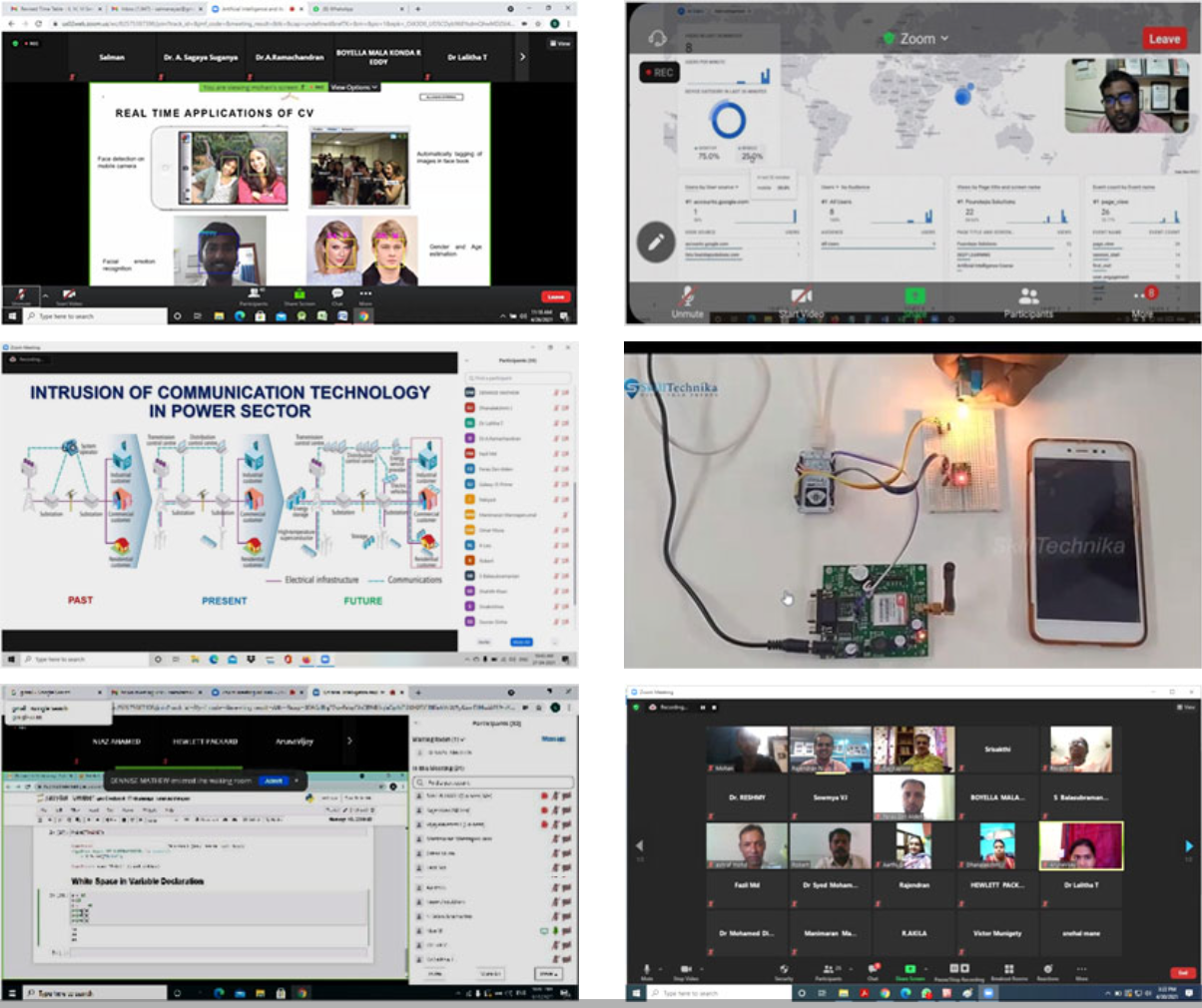
Academic Year 2020-21
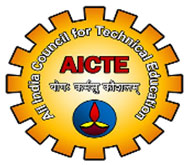
| Programme schedule | ||
| 07.09.2020 (Day – 1) | ||
| 10.00 AM-10.30 AM | Inauguration | |
| 10.30AM -11.30 AM | Inaugural Address – Climate change adaptation: Challenges | Dr.K.PALANIVELU Professor & Director Centre for Climate Change and Disaster Management, College of Engineering Guindy, Anna University |
| 11.45 AM – 01.00 PM | Landslide risk reduction strategies | Dr.G.P.GANAPATHY Professor& Director, Centre for Disaster Mitigation and Management, Vellore Institute of Technology, Vellore |
| 01.00 PM-02.00 PM | Lunch Break | |
| 02.00 PM-03.15 PM | First response for water, wastewater & waste management during disaster | MR.VARUN SRIDHARAN, CEO, M/S. Greenevironment, Chennai |
| 08.09.2020 (Day – 2) | ||
| 10.00 AM-11.30 AM | Role of Geomatics in Disaster mitigation and management | DR.S.VASANTHA KUMAR Associate Professor, Department of Civil Engineering,VIT, Vellore |
| 11.45 AM – 01.00 PM | Disaster management for coastal structures during cyclonic events | MR.PARAMESAWARA PANDIAN S Technical Director, BMT Consultant India |
| 01.00 PM-02.00 PM | Lunch Break | |
| 02.00 PM-03.15 PM | Earthquake disaster mitigation | Dr.MUTHUMANI K (Former Director ASTAR Lab – CSIR-SERC) Professor, Dean, School of Civil Engineering,VIT University, Chennai |
| 09.09.2020 (Day – 3) | ||
| 10.00 AM-11.30 AM | Disaster management for industrial pollution | Dr.ARYA V, Assistant Professor, Department of Civil Engineering, IIT Delhi |
| 11.45 AM – 01.00 PM | Adaptation as coastal disaster preparedness to changing climate and rising sea levels | Dr.A.SALEEM KHAN Postdoctoral Fellow and Fulbright Scholar, IIT Madras |
| 01.00 PM-02.00 PM | Lunch Break | |
| 02.00 PM-03.15 PM | Extreme weather events and climate change: Lessons from Kerala | Mr.NIDHIN DAVIS K Former Hazard Analyst- Kerala State Disaster Management Authority. Technical expert Climate Change –GIZ India |
| 10.09.2020 (Day – 4) | ||
| 10.00 AM-11.30 AM | Vulnerability assessment and ERP- Water treatment plant | Prof.K.S.LOKESH Professor &Former Registrar, JSS Scientific and Technical university, Mysuru. |
| 11.45 AM-01.00 PM | Computing Tools, Techniques and Methods for Natural Calamities warning and Response system | Dr. SUDALAI MUTHU T, Associate Professor, Department of Computer Sciences and Engineering HITS, Chennai |
| 01.00 PM-02.00 PM | Lunch Break | |
| 02.00 PM-03.15 PM | Role of Environmental management, types of disaster and mitigation | Dr.LAKSHMI C Associate Professor Department of Civil Engineering SJB Institute of Technology, Bengaluru, Karnataka |
| 11.09.2020 (Day – 5) | ||
| 10.00 AM-11.30 AM | Water shed management during disaster | Dr.S.V.MURUGAN Director, National Agro Foundation, Chennai |
| 11.45 AM – 01.00 PM | Scientific technology for coastal disaster management | Dr.SISIR KUMAR DASH Scientist E, National Centre for Coastal Research (NCCR), Chennai |
| 01.00 PM-02.00 PM | Lunch Break | |
| 02.00 PM-03.15 PM | Geotechnical aspects in seismic design of foundation and hazard mitigation | Dr.PREMALATHA K Professor, Department of Civil Engineering, College of Engineering Guindy, Anna University |
| 12.09.2020 (Day – 6) | ||
| 10.00 AM-11.30 AM | Disaster Risk Reduction Strategies- An Overview | Dr.J.S.SUDHARSHAN Assistant Professor, NICMAR, Pune |
| 11.30 AM- 1.30 PM | Certificate Examination for the participants | Conducted by Department of Civil Engineering |
| 1.30 PM – 2.30 PM | Lunch Break | |
| 02.30 PM-03.00 PM | Valedictory and Feedback session | |
Dr.K.PALANIVELU
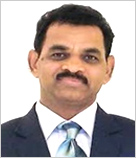 Dr.Palanivelu delivered a lecture on Climate Change Adaptation: challenges and way forward. Disaster and its classification was elaborated. The disaster preparedness and its management principles was elaborated . Climate change and the reasons for global warming effects were highlighted in the session. The global average surface temperature change and its scenario were forecasted.
Dr.Palanivelu delivered a lecture on Climate Change Adaptation: challenges and way forward. Disaster and its classification was elaborated. The disaster preparedness and its management principles was elaborated . Climate change and the reasons for global warming effects were highlighted in the session. The global average surface temperature change and its scenario were forecasted.
Dr.G.P.Ganapathy
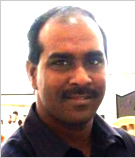 Dr. G.P.Ganapathy, delivered a lecture on landslides risk reduction strategies. Case study on different landslides like Darjeeling, Malpa, Mumbai, Amboori, Kedarnath and Malin was highlited in the session. Landslide, its causes and types were also elaborated. Technological tools for evaluation of landslides was discussed.
Dr. G.P.Ganapathy, delivered a lecture on landslides risk reduction strategies. Case study on different landslides like Darjeeling, Malpa, Mumbai, Amboori, Kedarnath and Malin was highlited in the session. Landslide, its causes and types were also elaborated. Technological tools for evaluation of landslides was discussed.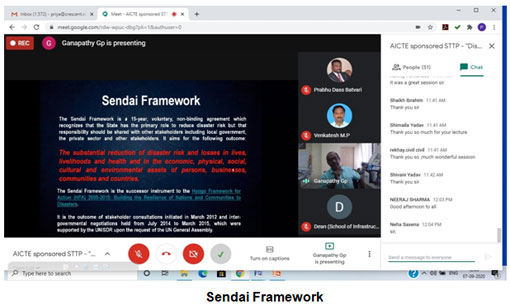
Mr.Varun Sridharan
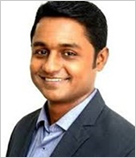 Varun Sridharan delivered a lecture on “First response for water, wastewater & waste management during disaster”. The immediate response after the disaster with no potable water, sanitation and hygiene was elaborated. The significance of WASH(Water, Sanitation and Hygiene) in emergencies was discussed.
Varun Sridharan delivered a lecture on “First response for water, wastewater & waste management during disaster”. The immediate response after the disaster with no potable water, sanitation and hygiene was elaborated. The significance of WASH(Water, Sanitation and Hygiene) in emergencies was discussed.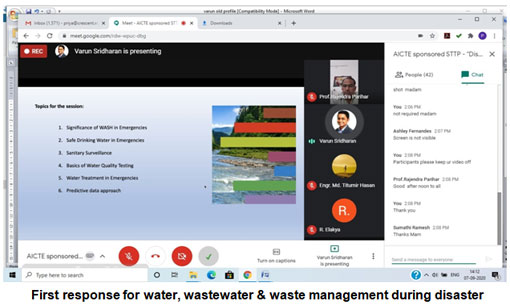
DR.S.VASANTHA KUMAR
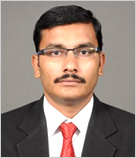 Dr.S.Vasantha Kumar presented a topic on “Role of Geomatics in Disaster Mitigation and Management”. He presented a case study on landslides, flood, soil pollution and accident related studies. Landslide in nilgiris and its frequency and its impacts were discussed. Case study on extraction of topographic and morphometric features for ooty- Mettupalayam highway was discussed.
Dr.S.Vasantha Kumar presented a topic on “Role of Geomatics in Disaster Mitigation and Management”. He presented a case study on landslides, flood, soil pollution and accident related studies. Landslide in nilgiris and its frequency and its impacts were discussed. Case study on extraction of topographic and morphometric features for ooty- Mettupalayam highway was discussed.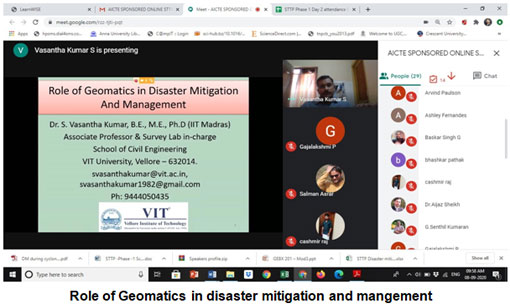
PARAMESWARA PANDIAN S
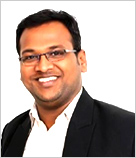 Parameswara Pandian delivered a lecture on “Disaster Management for Coastal structures during cyclonic events”. Initially the various terms related to coastal structures was briefed along with photographs. Different waves generated during cyclones and its pattern was discussed. Cyclone modeling and monitoring after warning was also elaborated.
Parameswara Pandian delivered a lecture on “Disaster Management for Coastal structures during cyclonic events”. Initially the various terms related to coastal structures was briefed along with photographs. Different waves generated during cyclones and its pattern was discussed. Cyclone modeling and monitoring after warning was also elaborated.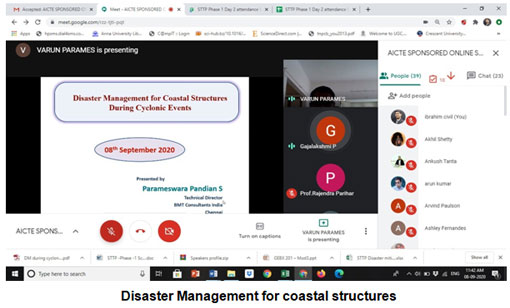
Dr.K.MUTHUMANI
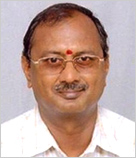

Dr.Arya V
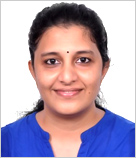 Dr.V.Arya delivered a lecture on “Disaster Management for Industrial Pollution”. Different industrial accidents like Minamata accident, Bhopal gas tragedy and Baia Marie cyanide spills were described. Prevention methods for industrial disaster was listed. Major polluting industries and chemical pollutants were elaborated.
Dr.V.Arya delivered a lecture on “Disaster Management for Industrial Pollution”. Different industrial accidents like Minamata accident, Bhopal gas tragedy and Baia Marie cyanide spills were described. Prevention methods for industrial disaster was listed. Major polluting industries and chemical pollutants were elaborated.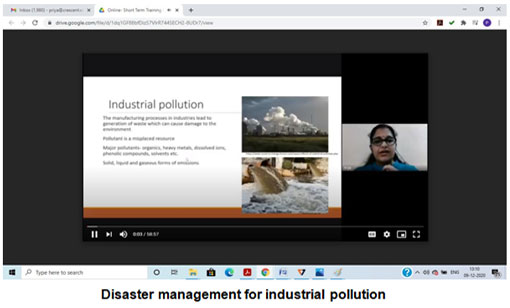
Dr. A. SALEEM KHAN
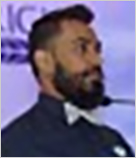

NIDHIN DAVIS K
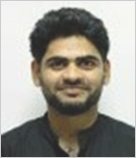

Prof.Dr. K.S.LOKESH
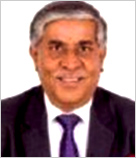 Prof. K.S. Lokesh delivered a lecture on “Vulnerability assessment and ERP- Water treatment plant”. He elaborated the Vulnerability assessment and emergency response plan. Vulnerability assessment checklist is designed to identify potential areas of vulnerability associated with these assets and appropriate actions that can be taken to minimize the vulnerabilities identified.
Prof. K.S. Lokesh delivered a lecture on “Vulnerability assessment and ERP- Water treatment plant”. He elaborated the Vulnerability assessment and emergency response plan. Vulnerability assessment checklist is designed to identify potential areas of vulnerability associated with these assets and appropriate actions that can be taken to minimize the vulnerabilities identified.
Dr. SudalaiMuthu T
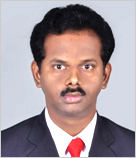 Dr. Sudalai Muthu T delivered a lecture on “Computing tools, techniques and methods for natural calamities warning and response system”. Different natural and man- made calamities or disasters were elaborated. The various disaster preparedness tools were listed. The application of geographic information systems for disaster management were also elaborated.
Dr. Sudalai Muthu T delivered a lecture on “Computing tools, techniques and methods for natural calamities warning and response system”. Different natural and man- made calamities or disasters were elaborated. The various disaster preparedness tools were listed. The application of geographic information systems for disaster management were also elaborated.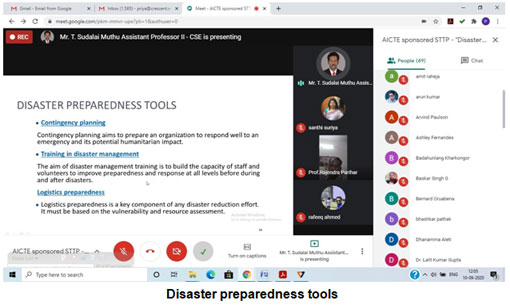
Dr.Lakshmi.C
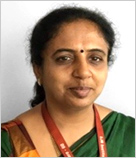 Dr. Lakshmi.C delivered a lecture on “Role of environmental management: types of disaster and mitigation”. The process of environmental management plan was described. Environmental disaster management was elaborated along with goals and principles. Environmental disasters along with the direct and indirect damages were also briefed.
Dr. Lakshmi.C delivered a lecture on “Role of environmental management: types of disaster and mitigation”. The process of environmental management plan was described. Environmental disaster management was elaborated along with goals and principles. Environmental disasters along with the direct and indirect damages were also briefed.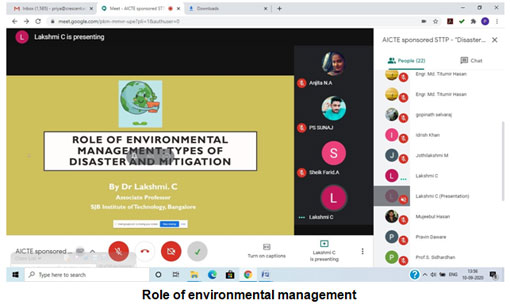
Dr S V Murugan
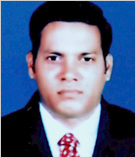 Dr.S.V Murugan delivered a lecture on “watershed management during disaster”. Watershed concept and its importance was explained. It was followed by the evolution of watershed and principles of watershed. Water related Disasters in the world was elaborated. Strategies of IWM towards disaster management were discussed.
Dr.S.V Murugan delivered a lecture on “watershed management during disaster”. Watershed concept and its importance was explained. It was followed by the evolution of watershed and principles of watershed. Water related Disasters in the world was elaborated. Strategies of IWM towards disaster management were discussed.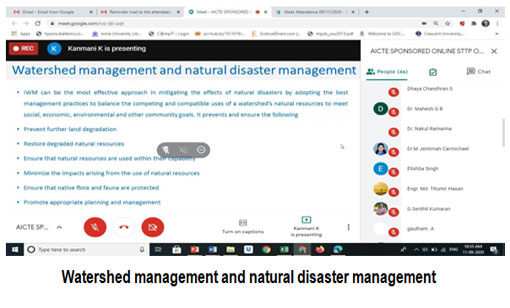
Sisir Kumar Dash
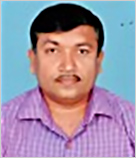 Sisir Kumar Dash delivered a lecture on “Scientific technology for coastal disaster management”. He elaborated on different application of technology in coastal disaster management. He also elaborated in detail about the GIS and remote sensing. GIS provides a tool for effective and efficient storage and manipulation of remotely sensed data and other spatial and non-spatial data types for both scientific management and policy oriented information.
Sisir Kumar Dash delivered a lecture on “Scientific technology for coastal disaster management”. He elaborated on different application of technology in coastal disaster management. He also elaborated in detail about the GIS and remote sensing. GIS provides a tool for effective and efficient storage and manipulation of remotely sensed data and other spatial and non-spatial data types for both scientific management and policy oriented information.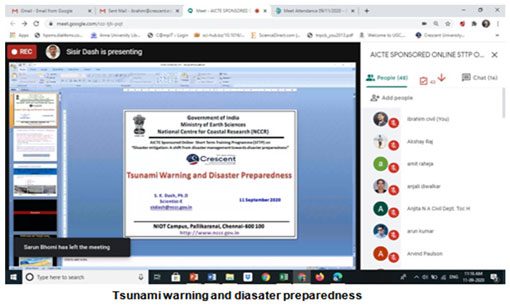
Dr.PREMALATHA K
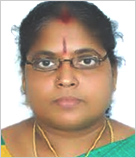 Dr.K, Premalatha delivered a lecture on “Geotechnical aspects in seismic design of foundation and hazard mitigation”. She explained about the seismological features of the earth and also about the seismic events. She also elaborated about the theory of plate tectonics and the evidence for its movement.
Dr.K, Premalatha delivered a lecture on “Geotechnical aspects in seismic design of foundation and hazard mitigation”. She explained about the seismological features of the earth and also about the seismic events. She also elaborated about the theory of plate tectonics and the evidence for its movement.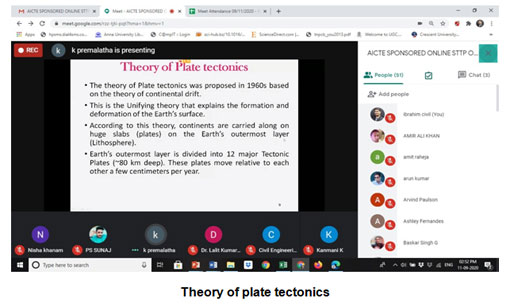
Dr.J.S.SUDHARSHAN
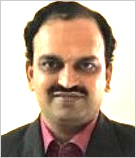 Dr. J.S.Sudharshan delivered a lecture on “Disaster Risk Reduction Strategies- An Overview “. He explained the concepts of disaster risk and key components of risk. He also elaborated on key disaster trends and the underlying driving factors. Actions involved in disaster risk reduction were also explained.
Dr. J.S.Sudharshan delivered a lecture on “Disaster Risk Reduction Strategies- An Overview “. He explained the concepts of disaster risk and key components of risk. He also elaborated on key disaster trends and the underlying driving factors. Actions involved in disaster risk reduction were also explained.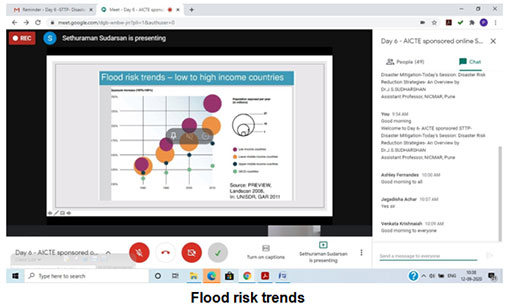
Feedback Analysis Report Feedbacks about the STTP were collected from the participants through Google forms for carrying out improvement in the upcoming STTP. The analyses of the report are given below. Regarding the effectiveness of the webinar, nearly 85.9% of the participants found that the webinar to be excellent and more than 12.7% of the participants registered that the webinar was good. Overall 98.6% found that the STTP was effective. CERTIFICATE OF PARTICIPATION The sample participation certificate for the participants is given below

AICTE sponsored Short Term Training Programme (STTP) –“Disaster mitigation: A shift from disaster management towards disaster preparedness”- Phase II was conducted through online mode with the speakers as listed in the below table using Zoom video conferencing platform.
| Programme schedule | ||
|---|---|---|
| 19.10.2020 (Day – 1) | ||
| 10.00AM -11.30 AM | Role of remote sensing and GIS in Disaster management | Prof P K GARG Civil Engg Deptt IIT Rorrke, Roorkee (Uttarakhand) & Former Vice Chancellor Uttarakhand Technical University, Dehradun |
| 11.30 AM – 01.00 PM | Impact of Waste disposal on Climate Change and mitigation options | Dr.S.V. Srinivasan Principal Scientist Central Leather Research Institute, Adyar, Chennai – |
| 01.00 PM-02.00 PM | Lunch Break | |
| 02.00 PM-03.30 PM | A practical demonstration on the role of remote sensing and GIS in Disaster management | DR.S.VASANTHA KUMAR Associate Professor, Department of Civil Engineering,VIT, Vellore |
| 20.10.2020 (Day – 2) | ||
| 10.00 AM-11.30 AM | Transportation Planning and Management for Disasters, Emergencies and related events | Dr. P. Partheeban Dean – Planning and Development Chennai Institute of Technology Kundrathur, Chennai – 600 069. |
| 11.30 AM – 01.00 PM | Hazards and disaster management | Dr.K.P.Jaya Director-Centre for Research, Division of Structural Engineering Department of Civil Engineering Anna University Chennai |
| 01.00 PM-02.00 PM | Lunch Break | |
| 02.00 PM-03.30 PM | Activities of National Disaster Management Authority | Prof. Dr. S. GANAPATHY VENKATASUBRAMANIAN, Professor (Environmental Law And Management) Anna University Chennai |
| 21.10.2020 (Day – 3) | ||
| 10.00 AM-11.30 AM | Water shed management In Tsunami affected areas using GIS | Dr. S. POONGOTHAI,Professor, Department Of Civil Engineering, Annamalai University, Chidambaram. |
| 11.30 AM – 01.00 PM | Disaster due to Nuclear radiation | Mr.J.Rooby,Scientist – H, Nuclear power corporation of India Limited, Kalpakkam |
| 01.00 PM-02.00 PM | Lunch Break | |
| 02.00 PM-03.30 PM | Disaster Management and preparedness in Seawater Reverse Osmosis Desalination Plant | Mr. Syed Amir Basha, Chief Technology Officer, Desalination & Head, Nemmelli Desalination Plant Operation, VA Tech WABAG. |
| 22.10.2020 (Day – 4) | ||
| 10.00 AM-11.30 AM | Chennai flood 2015: Lesson learned and way forward | Er.G.R.RadhaKrishna, Assistant Executive Engineer,WRD.,PWD., Lower Palar Basin Sub Division, Chengalpattu |
| 11.30 AM-01.00 PM | Design of Commercial Buildings with Disaster mitigation measures – a case study | Mr.Velan, City Head – Chennai Operations & PAN Indu Head – property Management, Capitaland Indo Limited, Taramani, Chennai |
| 01.00 PM-02.00 PM | Lunch Break | |
| 02.00 PM-03.30 PM | Role of Advanced survey in Disaster management | Ms.V.S.Kalaranjini, FT research Scholar, Institute of Remote sensing . CEG campus, Anna university, Guindy |
| 23.10.2020 (Day – 5) | ||
| 10.00 AM-11.30 AM | Important structural elements to protect the steel structures from cyclone | Dr. R. BASKAR, Professor, Department Of Civil And Structural Engineering, Annamalai University, Chidambaram |
| 11.45 AM – 01.00 PM | Solid waste management during disaster | Dr.R.Rajamanikam, Project coordinator, Centre for Environment and Humanity, Kodaikanal International school, Kodaikanal |
| 01.00 PM-02.00 PM | Lunch Break | |
| 02.00 PM-03.15 PM | Applications of 3D Mapping in Disaster Management. | Mr.Allah Pitchai K, Senior Engineer, Application sales and support Allterragulf, Doha, Qatar |
| 24.10.2020 (Day – 6) | ||
| 10.00 AM-11.30 AM | Keeping Schools safe in Earthquakes | Prof. Dr. S. KOTHANDARAMAN, Principal, Pondicherry Engineering College, Pudhucherry. |
| 11.30 AM- 1.30 PM | Certificate Examination for the participants and Valedictory and Feedback session | Conducted by Department of Civil Engineering |
Dr. Prof Pradeep Kumar Garg
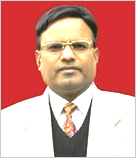 Dr.P.K. Garg delivered a lecture on role of remote sensing and GIS in disaster management. He discussed about Disaster Information and Monitoring Systems which make use of remote sensing data in the operative process of early warning, mitigation and management of natural disasters.
Dr.P.K. Garg delivered a lecture on role of remote sensing and GIS in disaster management. He discussed about Disaster Information and Monitoring Systems which make use of remote sensing data in the operative process of early warning, mitigation and management of natural disasters.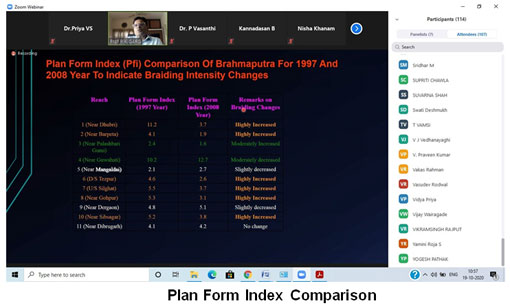
Dr. S. V. Srinivasan
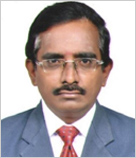 Dr. S. V. Srinivasan, delivered a lecture on Impact of Waste disposal on Climate Change and mitigation options. He clearly explains how most of the rubbish ends up in dumpsites or in landfills. When organic waste decomposes, carbon dioxide and methane gas is created.
Dr. S. V. Srinivasan, delivered a lecture on Impact of Waste disposal on Climate Change and mitigation options. He clearly explains how most of the rubbish ends up in dumpsites or in landfills. When organic waste decomposes, carbon dioxide and methane gas is created.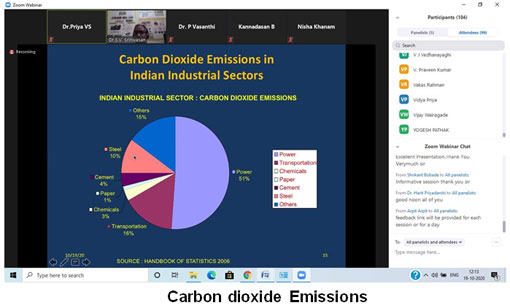
DR.S.VASANTHA KUMAR
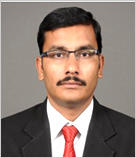 Dr.S.Vasantha Kumar presented a topic on, “A practical demonstration on the role of remote sensing and GIS in Disaster management”. He explains how GIS and remote sensing are incredibly useful and effective tools in disaster management.
Dr.S.Vasantha Kumar presented a topic on, “A practical demonstration on the role of remote sensing and GIS in Disaster management”. He explains how GIS and remote sensing are incredibly useful and effective tools in disaster management.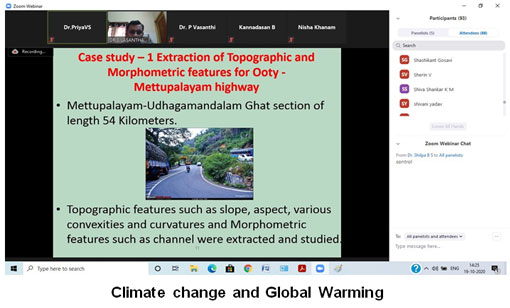
DR. P. PARTHEEBAN
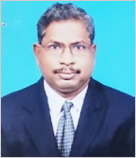

Dr.K.P.Jaya
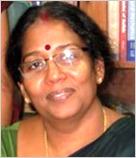 Dr. K.P. Jaya delivered lecture on, ”Earthquake hazards”. In which she explained what are the major earthquake hazards, risk of earthquake, and Importance of studying earthquake hazards. She elaborates that In any given earthquake produced by slip along a fault can produce a number of hazards including ground shaking, liquefaction, ground displacement, fires, and tsunamis.
Dr. K.P. Jaya delivered lecture on, ”Earthquake hazards”. In which she explained what are the major earthquake hazards, risk of earthquake, and Importance of studying earthquake hazards. She elaborates that In any given earthquake produced by slip along a fault can produce a number of hazards including ground shaking, liquefaction, ground displacement, fires, and tsunamis.
Dr. S. GANAPATHY VENKATASUBRAMANIAN
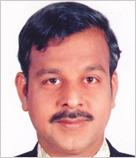 Dr S Ganapathy venkatasubramanian delivered lecture on, “Activities of National Disaster Management Authority”. In which he describes about National Disaster Management Authority, and the activities carried out by them. He explains that the policies, plans and guidelines for Disaster Management to ensure timely and effective response to disasters.
Dr S Ganapathy venkatasubramanian delivered lecture on, “Activities of National Disaster Management Authority”. In which he describes about National Disaster Management Authority, and the activities carried out by them. He explains that the policies, plans and guidelines for Disaster Management to ensure timely and effective response to disasters.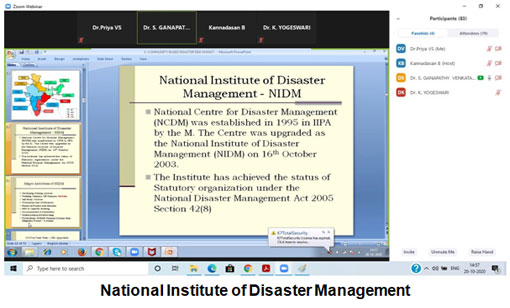
Dr. S. POONGOTHAI
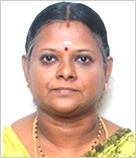 Dr. S. Poongothai delivered lecture on, “Water shed management In Tsunami affected areas using GIS”. In which she explained Watershed management is used to describe the process of implementing land use practices and water management practices to protect and improve the quality of the water and other natural resources within a watershed by managing the use of those land and water resources in a comprehensive manner.
Dr. S. Poongothai delivered lecture on, “Water shed management In Tsunami affected areas using GIS”. In which she explained Watershed management is used to describe the process of implementing land use practices and water management practices to protect and improve the quality of the water and other natural resources within a watershed by managing the use of those land and water resources in a comprehensive manner.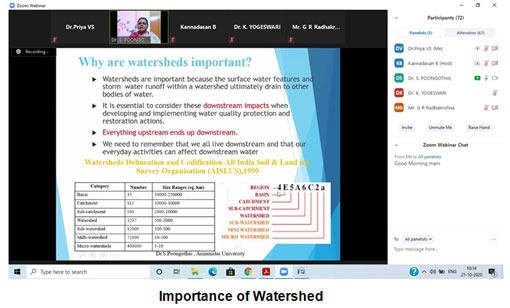
Mr. J. Rooby
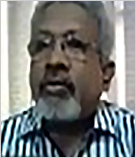 Mr. J. Rooby delivered lecture on, “Disaster due to Nuclear radiation” in which he explains about Disaster Management Guidelines: Management of Nuclear and Radiological Emergencies. He describes how Radiation can either kill cells or damage the DNA within them, which damages their ability to reproduce and can eventually lead to cancer.
Mr. J. Rooby delivered lecture on, “Disaster due to Nuclear radiation” in which he explains about Disaster Management Guidelines: Management of Nuclear and Radiological Emergencies. He describes how Radiation can either kill cells or damage the DNA within them, which damages their ability to reproduce and can eventually lead to cancer.
K. SYED AMIR BASHA
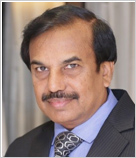 K. Syed Amir Basha delivered lecture on,” Disaster Management and preparedness in Seawater Reverse Osmosis Desalination Plant” in which he explains how is reverse osmosis used in desalination and also explained types of membrane process used for desalination: reverse osmosis (RO) and electro dialysis (ED).
K. Syed Amir Basha delivered lecture on,” Disaster Management and preparedness in Seawater Reverse Osmosis Desalination Plant” in which he explains how is reverse osmosis used in desalination and also explained types of membrane process used for desalination: reverse osmosis (RO) and electro dialysis (ED).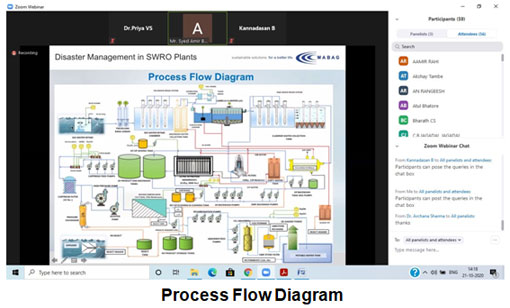
Er. G.R. RADHA KRISHNA
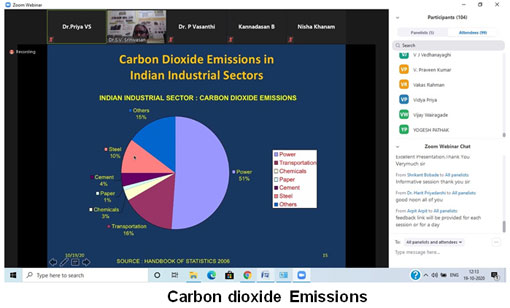 Er. G.R. Radha Krishna delivered lecture on,” Chennai flood 2015: Lesson learned and way forward” in which he explains about storm water drainage system. He emphasized that the area of the Corporation was expanded from 176 sq.km to 426 sq.km in the year 2011. The Population of the Chennai city is fast approaching 1 crore. The Greater Chennai Corporation has taken various steps to provide necessary infrastructure facilities in the newly added areas of the City.
Er. G.R. Radha Krishna delivered lecture on,” Chennai flood 2015: Lesson learned and way forward” in which he explains about storm water drainage system. He emphasized that the area of the Corporation was expanded from 176 sq.km to 426 sq.km in the year 2011. The Population of the Chennai city is fast approaching 1 crore. The Greater Chennai Corporation has taken various steps to provide necessary infrastructure facilities in the newly added areas of the City.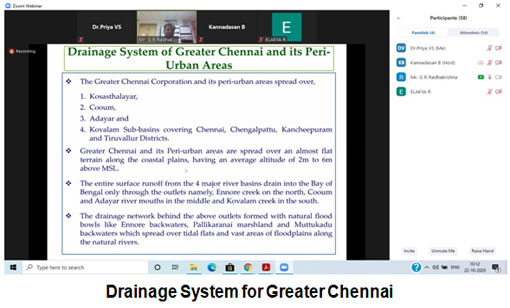
Dr. C. VELAN
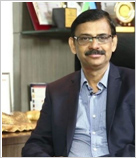 Dr C. Velan delivered lecture on,” Design of Commercial Buildings with Disaster mitigation measures – a case study” in which he explains about Disaster Management which can be defined as the organization and management of resources and responsibilities for dealing with all humanitarian aspects of emergencies, in particular preparedness, response and recovery in order to lessen the impact of disasters.
Dr C. Velan delivered lecture on,” Design of Commercial Buildings with Disaster mitigation measures – a case study” in which he explains about Disaster Management which can be defined as the organization and management of resources and responsibilities for dealing with all humanitarian aspects of emergencies, in particular preparedness, response and recovery in order to lessen the impact of disasters.
V. S. KALARANJINI
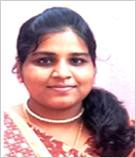 V.S. Kalaranjani is a full time research scholar in the Institute of Remote Sensing (Anna University) with accepted synopsis. Her research interests include Disaster Assessment with Geospatial techniques with particular focus on Space-based SAR data and InSAR technique.
V.S. Kalaranjani is a full time research scholar in the Institute of Remote Sensing (Anna University) with accepted synopsis. Her research interests include Disaster Assessment with Geospatial techniques with particular focus on Space-based SAR data and InSAR technique.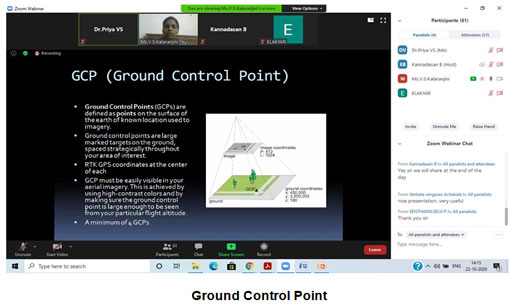
Dr. R. BASKAR
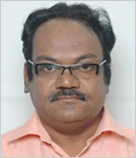 Dr. R. Baskar delivered lecture on, “Important structural elements to protect the steel structures from cyclone” in which he explains about the shape of new buildings and shape is the most important single factor in determining the performance of buildings in cyclones. Simple, compact, symmetrical shapes are best.
Dr. R. Baskar delivered lecture on, “Important structural elements to protect the steel structures from cyclone” in which he explains about the shape of new buildings and shape is the most important single factor in determining the performance of buildings in cyclones. Simple, compact, symmetrical shapes are best.
Dr. R. RAJAMANIKAM
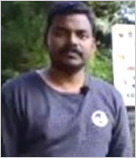 Dr. R. Rajamanikam delivered lecture on,” Solid waste management during disaster” in which he explains about solid waste, objectives of managing solid waste. He emphasized that Disaster waste is a well-recognized threat to health, safety and the environment, and can also be a major impediment to post-disaster rescue operations.
Dr. R. Rajamanikam delivered lecture on,” Solid waste management during disaster” in which he explains about solid waste, objectives of managing solid waste. He emphasized that Disaster waste is a well-recognized threat to health, safety and the environment, and can also be a major impediment to post-disaster rescue operations.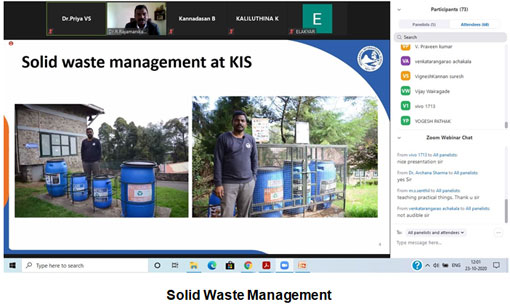
Mr. ALLAH PITCHAI K
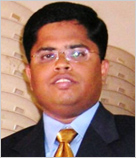 Mr. Allah Pitchai K delivered lecture on,” Applications of 3D Mapping in Disaster Management” in which he explains about the different dimensions of mapping in disaster management such as human dimensions, physical dimensions. He also explains about monitoring, control AND Resource Management, analysis and assessment studies etc.
Mr. Allah Pitchai K delivered lecture on,” Applications of 3D Mapping in Disaster Management” in which he explains about the different dimensions of mapping in disaster management such as human dimensions, physical dimensions. He also explains about monitoring, control AND Resource Management, analysis and assessment studies etc.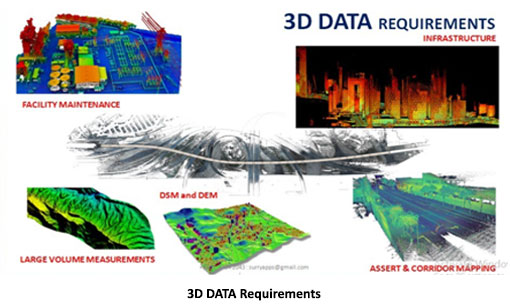
Dr. S. KOTHANDARAMAN
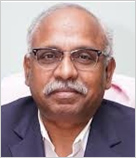 Dr. S. Kothandaraman delivered lecture on,” Keeping Schools safe in Earthquakes” in which he clearly explains about earthquake-prone communities that need earthquake-resistant schools. He elaborated that earthquakes cause the collapse of school buildings and the injury and death of staff and students.
Dr. S. Kothandaraman delivered lecture on,” Keeping Schools safe in Earthquakes” in which he clearly explains about earthquake-prone communities that need earthquake-resistant schools. He elaborated that earthquakes cause the collapse of school buildings and the injury and death of staff and students.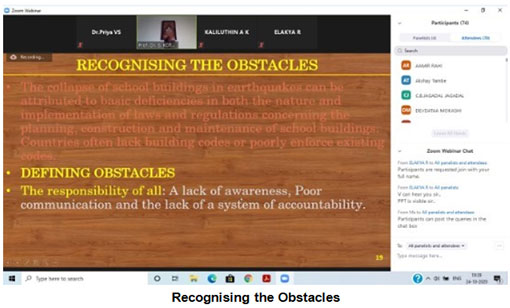
Feedback Analysis Report Feedbacks about the STTP were collected from the participants through Google forms for carrying out improvement in the upcoming STTP. Regarding the overall experience of the STTP, nearly 83.3% of the participants found that the training programme was excellent and more than 16.7% of the participants registered that the training programme was good. Certificate of Participation The sample participation certificate for the participants is given below

AICTE sponsored Short Term Training Programme (STTP)–“Disaster mitigation: A shift from disaster management towards disaster preparedness”- Phase-3 was conducted from 16.11.2020 to 21.11.2020 through online mode with the speakers as listed in the below table using Microsoft teams meeting.
| Programme Schedule | ||
|---|---|---|
| 16.11.2020 (Day – 1) | ||
| 10.00AM -11.30 AM | Impact of Urbanization on flooding | Dr. B.V. Mudgal Professor, Centre for Water Resources, Anna University |
| 11.30 AM- 01.00 PM | Understanding Disasters and Resilience: Concepts, Perspectives, Concerns and Experiences | Dr.S.Janakarajan Professional Consultant, MIDS President, SaciWATRs, Chennai |
| 01.00 PM-02.00 PM | Lunch Break | |
| 02.00 PM-03.30PM | Intelligent Transportation systems for Disaster management | Dr. S.Moses Santhakumar, Professor Civil engineering department NIT Trichy |
| 17.11.2020 (Day – 2) | ||
| 10.00 AM-11.30 AM | Mitigation strategies of hydrogen sulphide emission | Dr. V.Preethi Associate Professor Hindustan Institute of Science and Technology, Chennai |
| 11.30 AM – 01.00 PM | GIS Applications in Disaster Management | Dr E.S.M Suresh, Professor & Head, Dept. of Civil and Environmental Engineering National Institute of Technical Teachers Training and Research (Ministry of Education, Govt. of India) Taramani,Chennai. |
| Lunch Break | ||
| 02.00 PM-03.30 PM | Soil Nailing Techniques to encounter land slide Hazards in Hilly area with a case study. | Mr. Karthikeyan A M/S. Karthikeyan Associates Arumbakkam Chennai |
| 18.11.2020 (Day – 3) | ||
| 10.00 AM-11.30 AM | Prevention and control of corrosion in RC structures: Preparedness to avoid major disasters | Dr. M.S. Haji Sheik Mohammed Professor of Civil Engineering, Dean – Academic Affairs, Director – Centre for Prevention and Control of Corrosion in Concrete Structures (PC3S) BSACIST, Chennai |
| 11.30 AM – 01.00 PM | Geospatial technology for urban flood modeling and management | Dr.K.Srinivasaraju Associate Professor, IRS, Anna University |
| 01.00 PM-02.00 PM | Lunch Break | |
| 02.00 PM-03.30 PM | Potential impacts of climate change on reservoir services: Specific reference to Quantity and Quality | Dr. E. Arun Babu Assistant Professor (Sl.Gr) Centre for Water Resources Anna University, Chennai |
| 19.11.2020 (Day – 4) | ||
| 10.00 AM-11.30 AM | Geospatial Technology for Hazard Mapping and Disaster Management. | Dr. R. Jaganathan, Dean, Research Professor and Head Department of Geography School of Earth and Atmospheric Sciences University of Madras,Guindy Campus, Chennai |
| 11.30 AM-01.00 PM | Disaster mitigation of structures | Dr.S.Senthil Selvan Professor, Department of Civil Engineering SRM University, Kattankulathur, Chennai |
| 01.00 PM-02.00 PM | Lunch Break | |
| 02.00 PM-03.30 PM | Early warning systems of IMD: An overview | Dr. S. Balachandran, Scientist F & Head, Regional Meteorological Centre, College Road, Chennai-6. |
| 20.11.2020 (Day – 5) | ||
| 10.00 AM-11.30 AM | Pandemic and Sustainability | Dr. Ambika S Assistant Professor, Environmental Engineering, Civil Engineering Department C-214G, Indian Institute of Technology Hyderabad, Telangana |
| 11.30 AM – 01.00 PM | Impact of Covid-19 Pandemic | Dr. A.Sadhana Rajkumar Nutritionist , Diet and Fitness Consultant |
| 01.00 PM-02.00 PM | Lunch Break | |
| 02.30 PM-04.00 PM | Climate Change: New Dimensions in Disaster Management | Dr. Athira P, Assistant Professor, Department of Civil Engineering, IIT Palakkad |
| 21.11.2020 (Day – 6) | ||
| 10.00 AM-11.30 AM | NDMA guidelines for landslide mitigation | Dr.Vasanthi Padmanabhan Dean School of Infrastructure BSACIST |
Dr. B.V. Mudgal
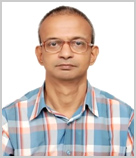 Dr Basavaraj Veeranna Mudgal, deliverd on Impact of Urbanization on flooding. The need for Disaster Preparedness and Flood Assessment in Urban Areas was highlighted in thesession. The need for real time flood modeling and the Emergency Action Plan for Dam Safety was also explained during the session
Dr Basavaraj Veeranna Mudgal, deliverd on Impact of Urbanization on flooding. The need for Disaster Preparedness and Flood Assessment in Urban Areas was highlighted in thesession. The need for real time flood modeling and the Emergency Action Plan for Dam Safety was also explained during the session
Dr.S.Janakarajan
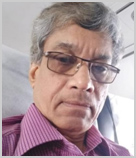 Professor Janakarajan delivered a lecture on Understanding Disasters and Resilience: Concepts, Perspectives, Concerns and Experiences. Professor Janakarajan highlighted the need for Disaster management and discussed the biggest limitation that is the lack of data base.
Professor Janakarajan delivered a lecture on Understanding Disasters and Resilience: Concepts, Perspectives, Concerns and Experiences. Professor Janakarajan highlighted the need for Disaster management and discussed the biggest limitation that is the lack of data base.
Dr. S. Moses Santhakumar
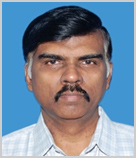 Dr. S. Moses Santhakumar delivered the lecture on the Intelligent Transportation System. The key points discussed during the session includes, the enabling Technologies related to ITS, Geographical Information Systems, GPS. The need for Interface in Transportation Data Acquisition, the importance of Pneumatic road tubes, Traffic Flow Sensors – Non-Intrusive Detectors, Video Image Vehicle Detection System (VIVDS), Automatic Vehicle Identification (AVI) System and Incident Management System with Variable Message Signs was highlighted in the session
Dr. S. Moses Santhakumar delivered the lecture on the Intelligent Transportation System. The key points discussed during the session includes, the enabling Technologies related to ITS, Geographical Information Systems, GPS. The need for Interface in Transportation Data Acquisition, the importance of Pneumatic road tubes, Traffic Flow Sensors – Non-Intrusive Detectors, Video Image Vehicle Detection System (VIVDS), Automatic Vehicle Identification (AVI) System and Incident Management System with Variable Message Signs was highlighted in the session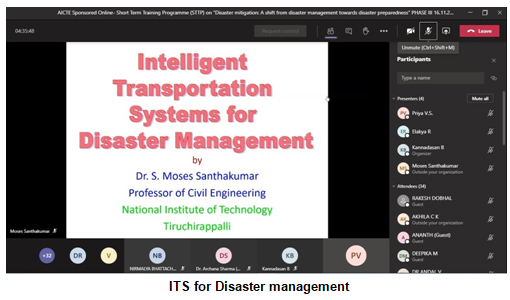
Dr. V.Preethi
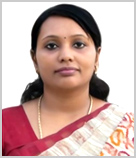 Dr.V.Preethi delivered lecture on Mitigation strategies of hydrogen sulphide emission. Some of the key points discussed in the session includes Sources of H2S, Environmental effects of H2S and s2 , Detection of H2S, Conventional techniques for H2S removal Mechanical/operational H2S mitigation techniques, Chemical H2S mitigation techniques etc.
Dr.V.Preethi delivered lecture on Mitigation strategies of hydrogen sulphide emission. Some of the key points discussed in the session includes Sources of H2S, Environmental effects of H2S and s2 , Detection of H2S, Conventional techniques for H2S removal Mechanical/operational H2S mitigation techniques, Chemical H2S mitigation techniques etc.
Prof. Dr. E.S.M. SURESH
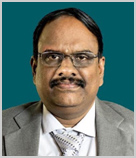 He has conducted more than 300 training programs for Polytechnic College faculty and More than 200 for Engineering College, 10 International Training Programs sponsored by ITEC/TCS/SCAAP (5 in Civil Engineering and 5 in Educational Media).
He has conducted more than 300 training programs for Polytechnic College faculty and More than 200 for Engineering College, 10 International Training Programs sponsored by ITEC/TCS/SCAAP (5 in Civil Engineering and 5 in Educational Media).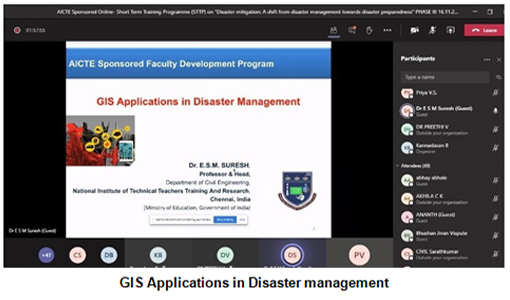
Mr A.Karthikeyan
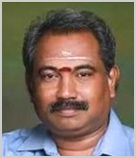 Mr A.Karthikeyan Post Graduated, M.E- Soil Mechanics and Foundation Engineering in College of Engineering Guindy, Anna University, Chennai from 1998 to 2000. During school days, Mr A.Karthikeyan received award from “President of India” for the service in The Bharat Scouts & Guides in 1989.
Mr A.Karthikeyan Post Graduated, M.E- Soil Mechanics and Foundation Engineering in College of Engineering Guindy, Anna University, Chennai from 1998 to 2000. During school days, Mr A.Karthikeyan received award from “President of India” for the service in The Bharat Scouts & Guides in 1989.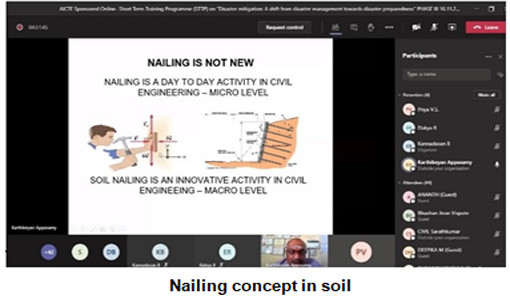
Dr. M.S. Haji Sheik Mohammed
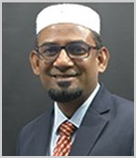 His immense passion in teaching and ethusiasim raised him to the positions of Professor of Civil Engineering and currently serving as the Dean – Academic Affairs, BS Abdur Rahman Crescent Institute of Science and Technology.
His immense passion in teaching and ethusiasim raised him to the positions of Professor of Civil Engineering and currently serving as the Dean – Academic Affairs, BS Abdur Rahman Crescent Institute of Science and Technology.
Dr.K.Srinivasaraju
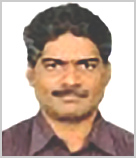 A few key points discussed:
Geomatics, Urban flooding, Mobile laser scanner, 3D city model mapping
A few key points discussed:
Geomatics, Urban flooding, Mobile laser scanner, 3D city model mapping
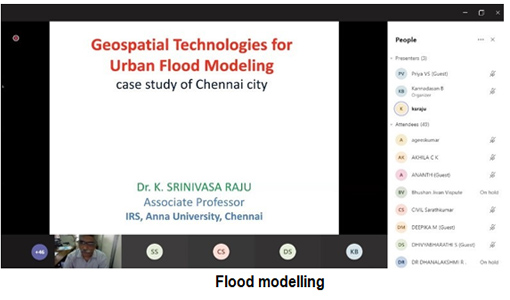
Dr. E. Arun Babu
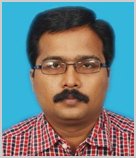 A few key points discussed:
Reservoir Services, Climate Change, Quantity of Reservoir Water, Impact of climate change on Reservoir services, Mathematical and statistical tools used to study impacts of climate change on reservoirs, Case studies and SWAT Modelling
A few key points discussed:
Reservoir Services, Climate Change, Quantity of Reservoir Water, Impact of climate change on Reservoir services, Mathematical and statistical tools used to study impacts of climate change on reservoirs, Case studies and SWAT Modelling

Dr.S.Senthil Selvan
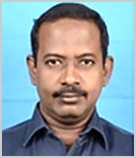 The key points discussed: Why is seismic engineering not widespread?, Cyclones affect houses because of enormously powerful winds, Design and maintenance of house, Basic Design Concepts #1 to #8, Behaviour of RC buildings during earthquake, Structural Design procedure, Disaster and Mitigation of Steel buildings during earthquake
The key points discussed: Why is seismic engineering not widespread?, Cyclones affect houses because of enormously powerful winds, Design and maintenance of house, Basic Design Concepts #1 to #8, Behaviour of RC buildings during earthquake, Structural Design procedure, Disaster and Mitigation of Steel buildings during earthquake
Dr. S. Balachandran
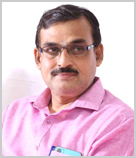 Dr. S.Balachandran joined the India Meteorological Department as operational forecaster in 1992 at Pune. During last 28 years he served in various capacities at different units like Instrumentation, Research, and Operational units of IMD at Pune, Delhi and Chennai. He is a faculty member of training centres of IMD.
Dr. S.Balachandran joined the India Meteorological Department as operational forecaster in 1992 at Pune. During last 28 years he served in various capacities at different units like Instrumentation, Research, and Operational units of IMD at Pune, Delhi and Chennai. He is a faculty member of training centres of IMD.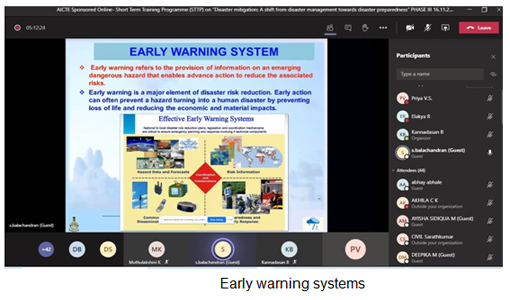
Dr. Ambika S
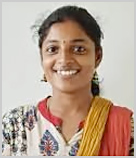 A few key points discussed:
COVID – 19 in India, Preventive measures of COVID – 19 in India, Triple Bottom line aspects, Impact of air pollution on pandemic, Pandemic and sustainability
A few key points discussed:
COVID – 19 in India, Preventive measures of COVID – 19 in India, Triple Bottom line aspects, Impact of air pollution on pandemic, Pandemic and sustainability

Dr. A.Sadhana Rajkumar
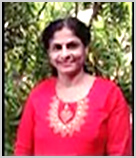 A few key points discussed:
COVID – 19 in India, Preventive measures of COVID – 19 in India, Need for a healthy diet systems, Impact of pollution on pandemic and its impact on health, Sustainability in health
A few key points discussed:
COVID – 19 in India, Preventive measures of COVID – 19 in India, Need for a healthy diet systems, Impact of pollution on pandemic and its impact on health, Sustainability in health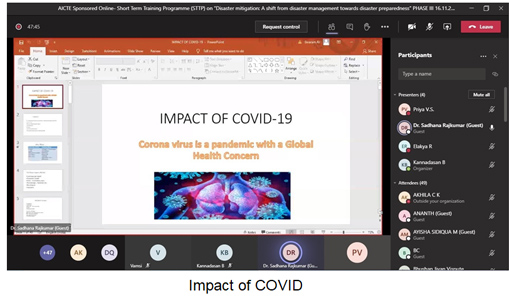
Dr. Athira P
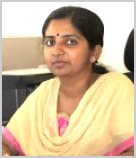 A few key points discussed:
The Human Cost of Disasters 2000-2019, Disaster Risk and Disaster Risk Management Disaster, Risk Drivers, Possible Disaster Risks, Climate Change, DRR and Climate Change Adaptation
A few key points discussed:
The Human Cost of Disasters 2000-2019, Disaster Risk and Disaster Risk Management Disaster, Risk Drivers, Possible Disaster Risks, Climate Change, DRR and Climate Change Adaptation
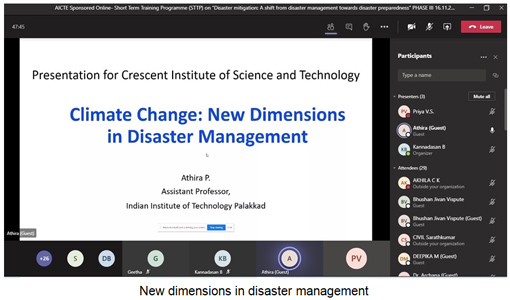
Dr.Vasanthi Padmanabhan
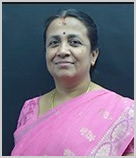 The key points discussed:
Land slide and effects, Landslide effects, Landslides mitigation techniques, Capacity building, PM’s 10 Point agenda
The key points discussed:
Land slide and effects, Landslide effects, Landslides mitigation techniques, Capacity building, PM’s 10 Point agenda

Feedback Analysis Report Feedbacks about the STTP were collected from the participants through Google forms for carrying out improvement in the upcoming STTP. The analyses of the report are given below. Regarding the effectiveness of the webinar, nearly 86% of the participants found that the webinar to be excellent and more than 14% of the participants registered that the webinar was good. Overall 98 % found that the STTP was effective. Certificate of Participation The sample participation certificate for the participants is given below

Sponsored by AICTE
Slot -1: 24th August 2020 to 29th August 2020
Session – Report
Programme Co-ordinator: Dr.S.Revathi, Professor, CSE, BSACIST, Dr.Sabiyath Fatima, CSE Dr.V.Muthu Priya, CA
Conveners: Dr. Venkatesan Selvam, Dean, SCIMS Dr. E. Syed Mohamed, Prof. & Head, CSE
The department of Computer Science and Engineering, B.S.Abdur Rahman Crescent Institute of Science and Technology, Chennai organized a Short Term Training Programme on Internet of Things – Everything Future in association with AICTE from 24th August 2020 to 29th August 2020. This programme was successfully conducted and coordinated through the online portal with dedicated sessions. The STTP program received an overwhelming response with 160 participants from various institutions/colleges approved by AICTE and affiliated to various Universities across India. This STTP is conducted for one week which comprised of technical session and hands on training session on different spectrum of IoT. Everyday three sessions were conducted to ensure the participants received the effective knowledge through this programme. Those people who develop the ability to continuously acquire new and better forms of knowledge that they can apply to their work and to their lives will be the movers and shakers in our society for the indefinite future.
Day-1 (24.08.2020)
Inauguration Session and Session 1 :
STTP was inaugurated at 9.30 am on 24th August 2020 by Dr. A.Peer Mohamed, Pro Vice Chancellor and Dr. A. Azad, Registrar, BSACIST, Chennai along with Mr. Amirtha Swamy, Keynote speaker, Founder & CMD – Theju Technologies, Bangalore and Founder & CTO – Watt-On technologies, Hyderabad. Dr.S.Revathi, Professor & Co-ordinator of the STTP has briefed the objective of the Short Term Training Program and the overall schedule of the STTP. Dr.V.Muthu Priya, Asst. Professor(Sl. Gr.), Computer Applications Department, BSACIST has introduced the chief guest. Mr. Amirtha Swamy gave an introduction on how IoT interrelate with various devices and how it could be applied in real time applications along with case studies like smart farming, smart charging, etc. Vote of Thanks was delivered by Dr.N.Sabiyath Fatima, Associate Professor, CSE Department, BSACIST, in which she paid her gratitude towards all the dignitaries.
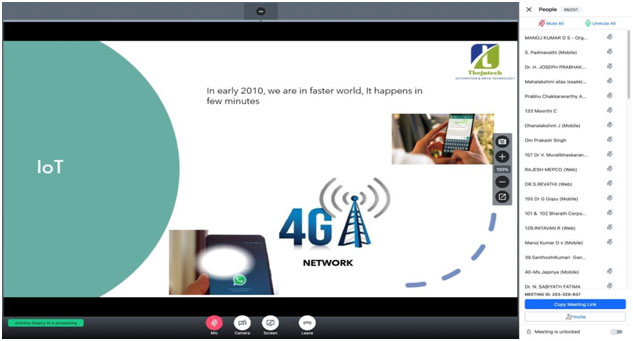
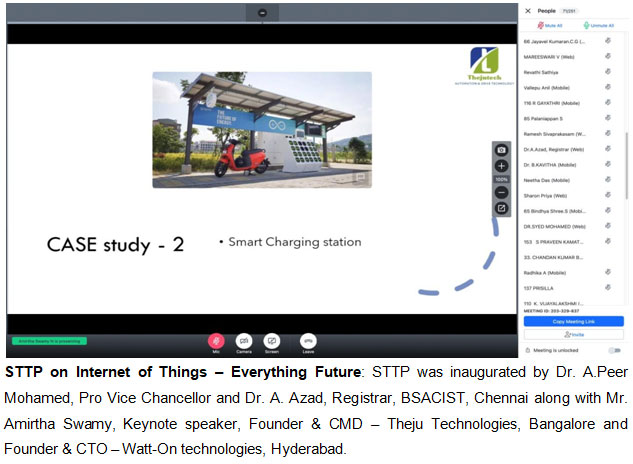
On Session 2:
Topic: Introduction to Internet of Things and Architecture
Resource Person: Dr.K.Muneeswaran, Sr. Professor and HOD, Computer Science and Engineering, Mepco Schlenk Engineering College, Sivakasi.
Dr. Revathi, Professor, BSACIST, Chennai has commenced the session by welcoming the resource person. After that, the resource person of this session, Dr.K.Muneeswaran, equipped the participants with the objective, importance and various sources of literature collection relating to IoT. He delivered the introduction about IoT and clearly explained the concept that connects the devices to the internet and how they communicate with each other over the internet. He projected a clear understanding of the importance of IoT and its functional Sub- System. He discussed the basic concepts used in the technology relating with best suitable real life examples which are essential for the understanding of technology.

On Session 3:
Topic: Sensors, actuators & Interfacing
Resource Person: Dr.Malleswaran, Professor & Head incharge, ECE Department, Anna University, Kancheepuram.
The Speaker of the Session Dr.M.Malleswaran shared his knowledge on internal operations of sensors and need for it in IoT. Also, he presented more on different types of sensors and actuators for IoT application. He explained the architecture diagram of computer process control system. He further added to it, the importance of interfacing in IoT process where it involves the communication between the device and computer networks. He detailed the process of Analog to Digital convertor and Digital to Analog convertor in the interfacing process.

Day-2 (25.08.2020)
On Session 1:
Topic: IoT Data Link Layer protocols & IoT Network Layer Protocols Resource Person: Dr.Pushpalatha, Professor, SRM Institute of Science and Technology, Chennai.
The Speaker of the Session Dr.Pushpalatha presented topics related to “IoT Data Link Layer protocols & IoT Network Layer Protocols”. She projected a clear understanding of the importance of LoRaWAN and future problems in the real world. She emphasized on Applications of Zigbee Technology through a hands-on project. She projected on comprehending the theoretical concepts and relating to the practical aspects of Industrial Automation, Home Automation, Smart Metering and Smart Grid monitoring. She insisted on Bluetooth Low Energy (BLE) which is a low power wireless technology used for connecting devices with each other.She also added on concepts relating to Network Layer- Encapsulation Protocols-LoWPAN.
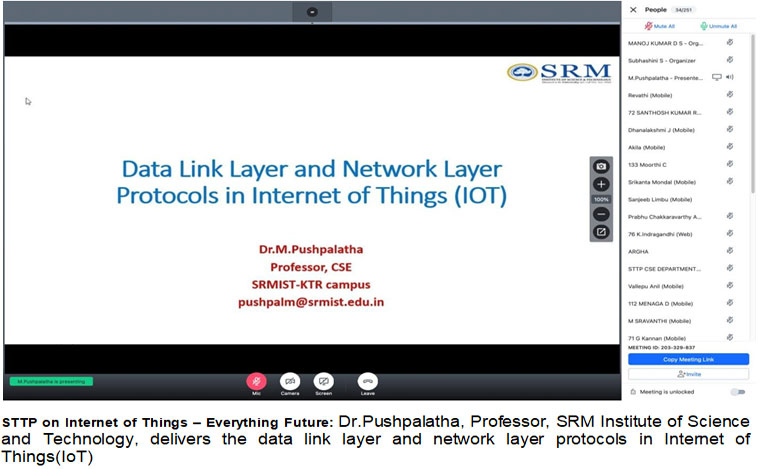

On Session 2 & 3:
Topics:
- Virtual Hands on Training session of IoT Applications Automation
- IoT devices, dashboard automation using Node Red simulation
Resource Person: Dr.Maheswari R, Associate Professor, School of Computer Science and Engineering, VIT, Chennai.
The Speaker of the Session Dr.Maheswari R presented topics related to Virtual Hands on Training Session on IoT Applications Automation. She gave a brief introduction about the IoT Protocol Contained application protocol (CoAP), Message Queuing Telemetry Transport MQTT, Extensible Messaging and Presence Protocol (XMPP), Advanced Message Queuing Protocol (AMQP). Step by step installation guidance on Node Red was given by Dr. Maheswari to all the participants, during which lot of queries asked by the participants were addressed by her then and there.
On session 3, she explained the key features and benefits of Node Red. Followed by which she explained how to access the editor in a web browser, how to drag one node on to the workspace from the palette, how to add debug node, function node deployment. She also showed how to connect the wire from the output port of one to input port of another.
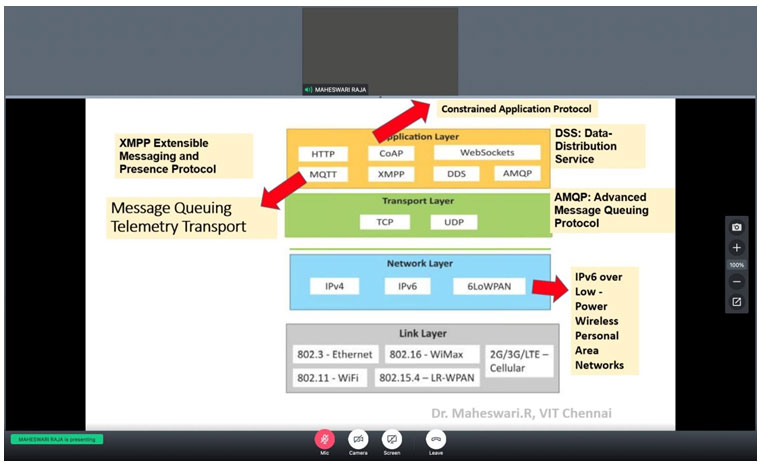
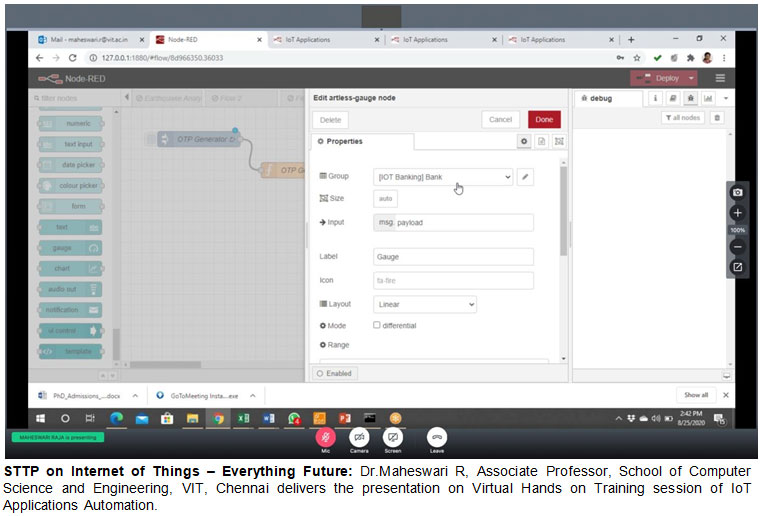
Day-3 (26.08.2020)
On Session 1,2 & 3:
Topics Covered :
- Applications of IoT
- Hands on Training using Tinker card- Arduino Programming and Sensors interfacing
- Hands on Training using Tinker card
Resource Person: Dr.Sabura Banu, Founder & CEO, Intellectz Tech For All, Chennai.
The speaker of the session Dr. Sabura Banu started with brief introduction of IoT. How IoT works and the structure of the IoT. She forecasted the Global IoT Market. She clearly discussed the massive potential of IoT. And then listed out the application of IoT. The ultimate goal of IoT is to automate human Life has explained briefly. She gave many interesting applications of IoT like smart Garbage Cans and smart mirror. She focused with Technological challenges of IoT, Criticisms and controversies of IoT.
On Session 2 and 3, Dr. Sabura Banu started Hands on Training using Tinker card- Arduino Programming and Sensors interfacing. Few latest addition of Arduino projects were demonstrated and described about ARDUINO and discussed about its features in detail. She gave hands on session on Tinker card and how to use the features and tools in it. It was a very interactive session and all the faculties and the research scholars were involved with real interest in the hands on session.
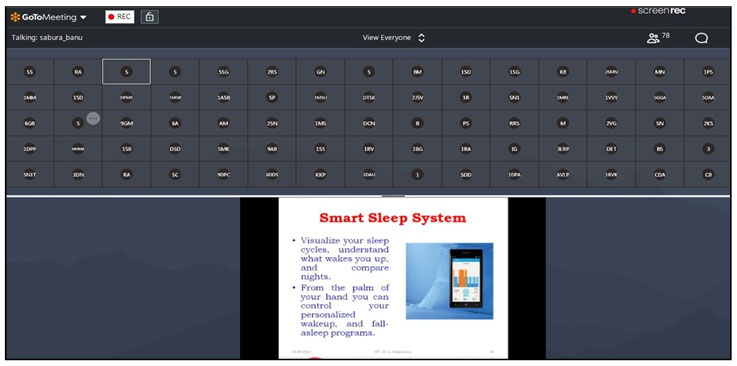
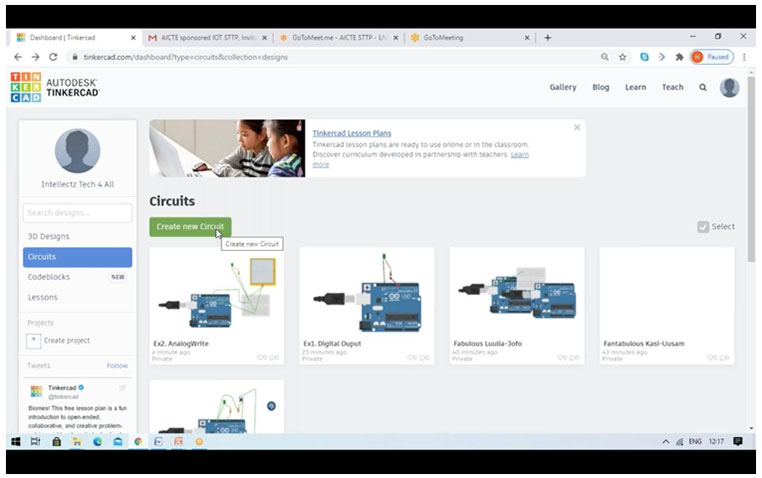

Day-4 (27.08.2020)
On Session 1 & 2:
Topic: Internet of Things – Cloud Integration
Resource Person: Mr.Revanth Kumar, CEO, Unturtle Technologies,Hyderabad.
The Speaker of the Session Mr.Revanth Kumar presented topics related to “IoT Cloud Integration”. He projected a clear understanding of the Greater usage of the IoT in cloud that has acted as a catalyst for the development and deployment of scalable Internet of Things applications and business models. He clearly explained that the cloud computing and IoT have become two very closely affiliated future internet technologies with one providing the other a platform for success. He explained IoT in cloud offers public cloud services which can easily help the IoT area, by providing third party access to the infrastructure. He explained IoT devices need a lot of storage to share information for valuable purposes.
He described that IoT in cloud, like the StoneFly, Cloud Connect to Microsoft Azure can provide customers with greater space which can increase as per the users demand, helping to resolve the storage needs of customers. He described that IoT in cloud provides the connectivity which is necessary to share information between the devices and make meaning from it at a fast pace. He insisted that Internet Cloud Computing infrastructures help IoT to give meaning to the greater amount of data generated.
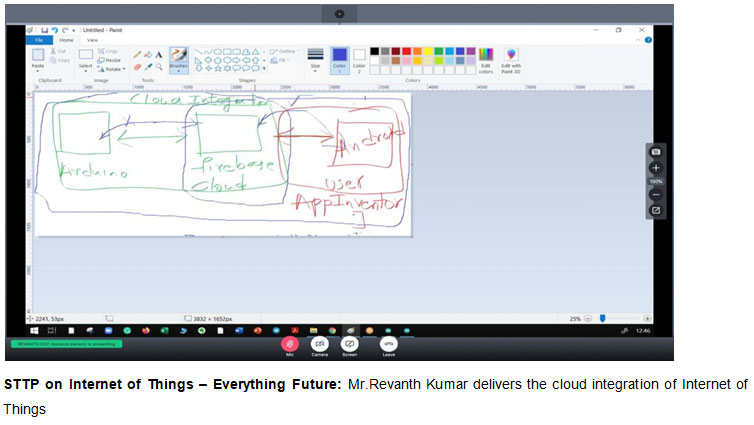
On Session 3:
Topic: Industrial 4.0 with additive manufacturing
Resource Person : Mr.J.K.Rohith, Director, Madras Scientific Research Foundation, Chennai.
The Speaker of the Session Mr.J.K.Rohith presented topics related to “Industry 4.0 Additive Manufacturing”. He explained how the Fourth Industrial Revolution (or Industry 4.0) is changing the traditional manufacturing and industrial practices, using modern smart technology. He discussed the concept of additive manufacturing relating with best suitable real life examples with the 3D printing which are essential for the understanding of technology. He projected a live demo on manufacturing of face shield for COVID -19 protection through additive manufacturing technology.
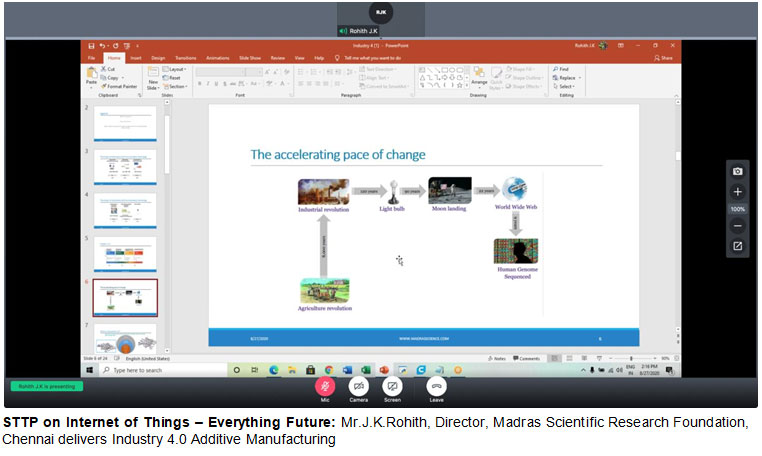
Day-5 (28.08.2020)
On Session 1:
Topic : Road ahead on the connected vehicles with IoE Resource Person: Mr.S. Vijay Anand,
Director, aLTRAN, Chennai.
He started with today’s transportation challenges and need of connected vehicles. He explained how digital transformation takes place from M2M to Internet of Vehicle (IoV). Next he explained the different use cases/applications of car and bike. Apple car play, Google android auto, mirror link – car connectivity consortium, connected car concepts(in-car connectivity, in-car scenarios), digital License Plate for connected Car, Mobile phone Centric Telematics were discussed by him. He also explained what Amazon Alexa can do for connected car. He also explain how Kia Motors India become the leader in connected cars.
He also make clear the Adaptive Media Streaming” from cloud Network. He took example for the connected car meets home. He took an example of Ethernet AVB for connected car. In the title “Edge computing “ vehicle telematics, how the different sensors are used in connected car. He also gave details of need of edge computing in connected vehicles. He explained the data management and security risk foreseen in the connected car. Vehicle Data Analytics at Edge with Machine learning concept was dealt by him with challenges and key features of data analytics.

On Session 2 & 3:
Topics:
- Software Defined Networking (SDN)
- Software Defined Networking(SDN) based IoT
Resource Person: Dr.Azka Wani, Wani Systems, Dubai.
The Speaker of the Session Dr.Azka Wani presented topics related to “Software Defined Networking(SDN) based IoT”. She inspired the audience by explaining an environment where each object is having an unique identifier and has ability to transfer data over a network without the need of human-to-human or human-to-computer interaction. She discussed about the borderless system architecture which raises extra threat to the system access control. She emphasized on the new systems administration, the Software Defined Networking (SDN), offers numerous chances to secure the system in a more productive and adaptable way. She added that a SDN based model is also proposed for securing the IoT against the identified attacks. She described that the Security mechanism is contained in the control plane or Controller and the security policies are enforced in to the IoT gateways as flow rules.
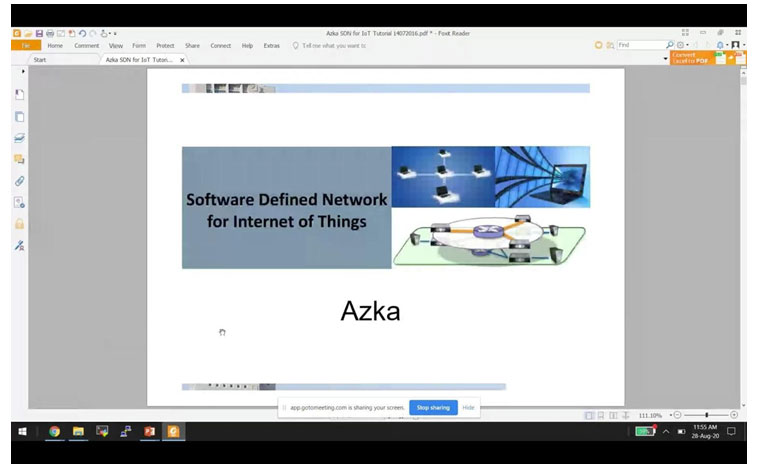
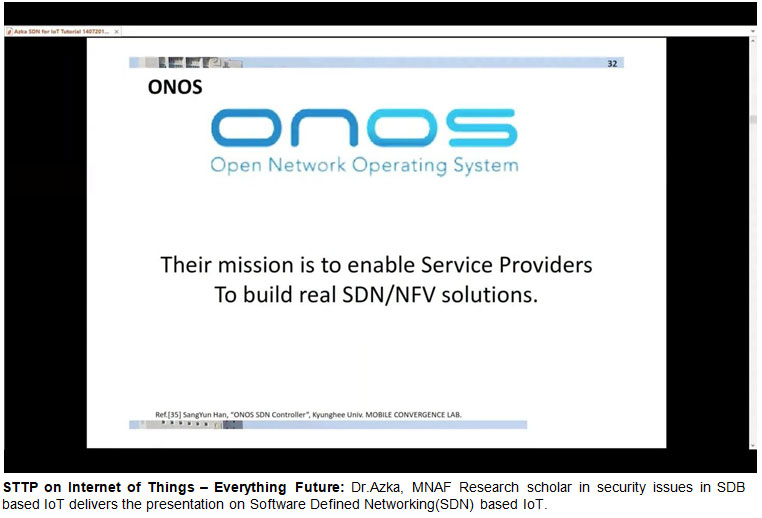
Day-6 (29.08.2020)
On Session 1 & 2:
Topics:
- MQTT protocol overview
- Blockchain Overview and its adoption in IoT
Resource Person: Mr.Manikandan, Principal Systems Engineer, Aricent Technology, Chennai.
The Speaker of the Session Mr.Manikandan presented topics related to “MQTT protocol overview and Blockchain Overview and its adoption in IoT”. He explained how to work on assets –range from tangible to intangible, Chaincode – software for business logic, Ledger features, Privacy through channels, Security and membership services.

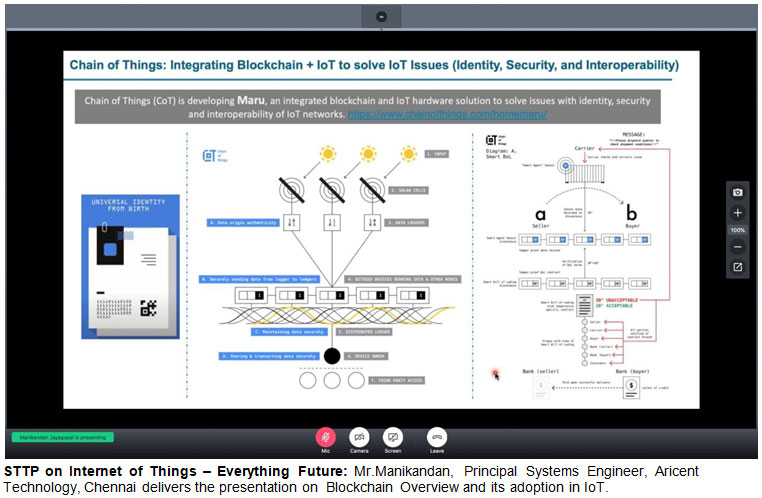
Valedictory Session & Session III :
Receiving an overwhelming response from participants, a week long short term training programme STTP on Internet of Things – Everything Future came to an end with the Valedictory Session. Dr. S. Revathi, Professor CSE Department, BSACIST explained the outcome of STTP Programme and introduced the chief guest of valedictory session Mr.Khuzema Siam Wala, Director, Siam Computing, Chennai. He delivered the speech related to IoT and its applications. He explained how The Internet of Things (IoT) works as a network of physical objects or “things” embedded with – Electronics – Software – Sensors – Network connectivity which enables these objects to collect and exchange data. He enumerated few applications of IoT like building and home automation, manufacturing, medical and healthcare systems.

This distinctive user friendly programme cumulates together the real-world industry experience, practical hands-on session and exposed faculties and researchers to the Internet of Things. The technological update on this topic helped the institution in updating the curriculum according to the disciplines of subjects. B.Tech CSE with specialization in IoT educates the students about the effective use of Internet of Things (IoT) technology for solving real-life multi-disciplinary problems that cater to the need of society and are economically feasible.
The oral feedback received from the audience and online link was posted for collecting the participants’ observation/feedback which is critical in improving the quality of the future session. Vote of Thanks was delivered by Dr.E.Syed Mohamed, Professor & HOD, CSE Department, BSACIST, in which he paid his gratitude towards all the dignitaries who has spared their time to share their expertise with the participants. Nevertheless, he has given thanks to AICTE for their continuous support and financial assistance to successfully organize this short term training programme.
Session Video Links
![]()
- https://cfs.crescent.education/index.php/s/y6n9w9zzQzDZgPM
- https://cfs.crescent.education/index.php/s/jsNENt4fMMfGC7r
- https://cfs.crescent.education/index.php/s/tBnbzc26E3Sqkm8
- https://cfs.crescent.education/index.php/s/ifJcXc8SQedy2Ln
- https://cfs.crescent.education/index.php/s/4qGfrCqdryCyEag
- https://cfs.crescent.education/index.php/s/j4omH2gtnbzGkSt
- https://cfs.crescent.education/index.php/s/238Ck7YTckCqMr2
- https://cfs.crescent.education/index.php/s/LFWprBTRZqFpcoX
Cancer Awareness Programme – 21-04-2022
National Service Scheme (NSS) of B.S.A. Crescent institute of Science and Technology in association with Adayar Cancer Institute conducted a Cancer Awareness Programme in Karasangal village to make village community more aware of cancer, its symptoms and its prevention, on April 21st ,2022 in Karasangal village premise. The awareness programme inaugurated by the Dakshimamurthy, Karsangal panchayat union president. The NSS programme officers Dr.C.Srinivasan and Dr.Noushad was present the function.
The main purpose of this event was to create awareness among the village community about cancer’s disease, its causes and effects. They were also informed about how to fight with this disease. The team members from Adayar cancer centre arranged various awareness programme for the village people. 54 village members participated in the awareness programme and benefited from this event.




Free Medical Camp
National Service Scheme (NSS) of B.S.A. Crescent institute of Science and technology jointly with Unnat Bharat Abhiyan (UBA) conducted a “FREE MEDICAL CAMP” in association with Tagore Medical College, Chennai for the benefits of school students of Panchayat Union Middle School, Keerapakkam Village.
The camp was inaugurated by Mrs.Selva Sundari Rajendran, President of Keerapakkam village and Mr.A.K.G.Balaji, Vice-President of Keerapakkam village. Ms. Shanthi, headmistress of panchayat union middle school appreciated the efforts taken by the NSS unit for the benefits of school children. Nearly, 200 school students undergone medical investigation and got benefited by this free medical camp.



Report on
BS Abdur Rahman Crescent Institute of Science and Technology, Chennai
National Service Scheme
7 Days Special Camp
Theme: Youth for Prevention and Mitigation of COVID 19
Date: March 16-22, 2022
Venue: Government High School, Karanai Puducherry Panchayat, Vandalur Taluk, Chengalpattu District
The seven days special camp has been organized by the NSS units of BS Abdur Rahman Crescent Institute of Science and Technology at Government High School, Karanai Puducherry Panchayat, Vandalur Taluk, Chengalpattu District of Tamil Nadu during the period of March 16-22, 2022.
The main objective of National Service Scheme Special Camping was to create a way for individuals to live with that community for seven days and experience their conditions and problems. It gives chances for group living, collective experience sharing, and continual connection with the community.The NSS volunteers are expected to dedicate their time to the development of the adopted village through Regular Activities.
There were various programmes and functions were organized under the leadership of the NSS units of the Crescent Institute. Programmes like cleaning of village and school premises, awareness of environment affecting factors, Awareness on health and hygiene, women empowerment, first aid awareness and various sports, funs and cultural programmes for the school children’s were organised. Around 110 volunteers from the three III units of the NSS Crescent Institute of Science and Technology including boys and girls were actively participated.
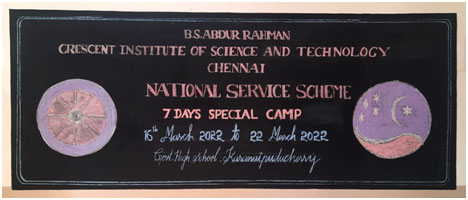
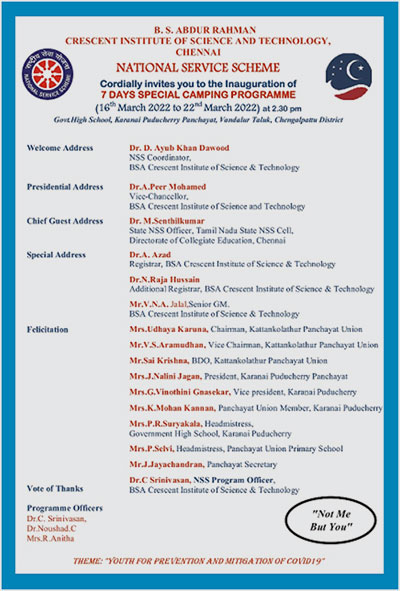
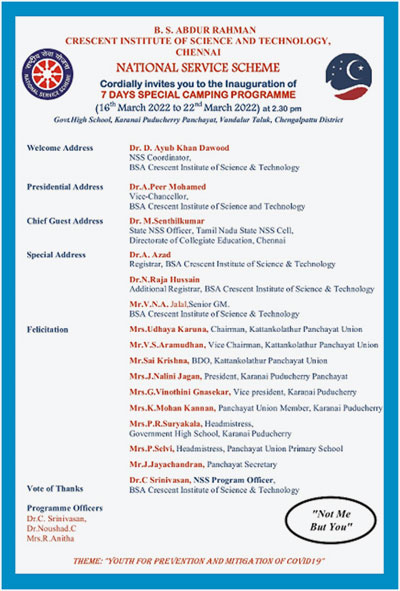
DAY-1 – 16.03.2022
The inaugural ceremony was held in Govt.High School,KaranaiPuducherry Panchayat at 2.00 p.m. Dr.V.M.N Jalal, General Manager of B.S.A Crescent Institute of science and Technology, Dr.N.Raja Hussain,Additional Registrar,BSA Crescent Institute of Science & Technology, Dr.M.Senthilkumar, State NSS Officer,Tamil Nadu State NSS Cell, Directorate of Collegiate Education, Chennai , Dr.Ayub Khan Dawood, NSS Coordinator,BSA Crescent Institute of Science & Technology graced the occasion. Nearly 110 NSS student volunteers participated in the inaugural function.
The inaugural ceremony was initally conducted in the renuvated school building. The renovation work in the school building was supported by the management of B.S.A. Crescent Institute of Science and technology. The school teachers and students welcomed the chief guest and other officials with sweets and students-made greeting card.
Inaugural ceremony of renovated building |
Mrs.P.R.Suryakala, Headmistress, Government High School, Karanai Puducherry Welcoming the chief guest |
NSS Student Volunteers |
Inaugural ceremony of NSS Special Camp |
Dr.Raja Hussain, Additional Registrar, BSA Crescent institute of Science and Technology honoring the chief guest Dr.M.Senthilkumar, State NSS Officer |
Dr.V.N.A. Jalal, General Manager of BSACIST addressed the gathering |
Dr.M.Senthilkumar, State NSS Officer addressing the gathering |
Mrs. P.R. Suryakala, School headmistress gave the gesture of happiness for conducting the special camp in their school. |
Figure IV – 27 (a): Few Snapshots of First Day activities of “Youth for Prevention and Mitigation of COVID 19” organised by NSS Unit at Government High School, Vandalur Taluk.
The programme was started by the reciting of the Qirat which was followed by the Tamil Thaivalthu. Dr.M.Senthilkumar, State NSS Officer, Tamil Nadu State NSS Cell, Directorate of Collegiate Education was the chief guest for the inaugral ceremony. Dr. Ayub Khan Dawood, NSS Coordinator, BSACIST welcomed the gathering. Dr.V.N.A. Jalal, General Manager of BSACIST addressed the gathering with his encouraging words and insisted the student’s responsibilities in serving the society. He requested the students to plant more saplings in the school campus and guide the school students in the right path. Dr.N.Raja Hussain, Additional Registrar, BSACIST delivered a motivational speech. He described the importance of NSS special camp and the motivated the student volunteers by sharing his personal NSS experience and the special awards received by him for his NSS activities. Followed by them, Dr.M.Senthilkumar, State NSS Officer gave the key tips to the student’s community for getting placed in government sectors with the help of NSS activities. His words were very much supportive to the entire NSS team.
Mrs.J.NaliniJagan, President, Karanai Puducherry Panchayat, Mrs.P.R.Suryakala, Headmistress, Government High School, Karanai Puducherry and Mrs.P.Selvi, Headmistress, Panchayat Union Primary School extended their thanks to management of BSACIST and to the entire NSS team for rendering great support for the school and village premises. Mrs. P.R. Suryakala gave the gesture of happiness for conducting the special camp in their school.
The programme was started by the reciting of the Qirat which was followed by the Tamil Thaivalthu. Dr.M.Senthilkumar, State NSS Officer, Tamil Nadu State NSS Cell, Directorate of Collegiate Education was the chief guest for the inaugral ceremony. Dr. Ayub Khan Dawood, NSS Coordinator, BSACIST welcomed the gathering. Dr.V.N.A. Jalal, General Manager of BSACIST addressed the gathering with his encouraging words and insisted the student’s responsibilities in serving the society. He requested the students to plant more saplings in the school campus and guide the school students in the right path. Dr.N.Raja Hussain, Additional Registrar, BSACIST delivered a motivational speech. He described the importance of NSS special camp and the motivated the student volunteers by sharing his personal NSS experience and the special awards received by him for his NSS activities. Followed by them, Dr.M.Senthilkumar, State NSS Officer gave the key tips to the student’s community for getting placed in government sectors with the help of NSS activities. His words were very much supportive to the entire NSS team.
Mrs.J.NaliniJagan, President, Karanai Puducherry Panchayat, Mrs.P.R.Suryakala, Headmistress, Government High School, Karanai Puducherry and Mrs.P.Selvi, Headmistress, Panchayat Union Primary School extended their thanks to management of BSACIST and to the entire NSS team for rendering great support for the school and village premises. Mrs. P.R. Suryakala gave the gesture of happiness for conducting the special camp in their school.
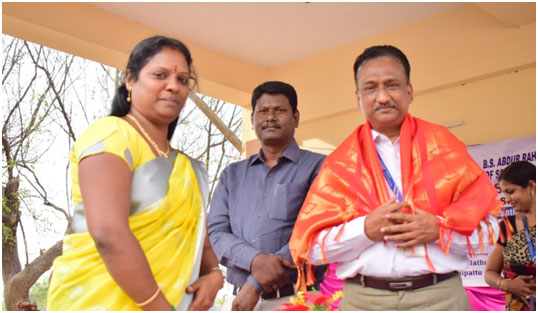
Followed by the inauguration, student volunteers were nominated for village survey. The survey was taken on male and female literacy rate in this particular village. Literacy lifts individuals out of poverty and also it empowers women and girls
DAY-2 – 17.03.2022
The second day started with the cleaning of village premises. NSS student volunteers were disseminated in teams and sent to various locations.

Followed this, Childline India Foundation gave a presentation on role of youth in child protection. CHILDLINE India Foundation (CIF) is the nodal agency of the Union Ministry of Women and Child Development for setting up, managing and monitoring the CHILDLINE 1098 service all over the country. Awareness on child protection was given to both NSS student volunteers and also to Govt. High school children. CIF gave awareness about child protection through various skits and presentations. They delivered messages on Child abuse and violence, child sexual abuse and child marriage.
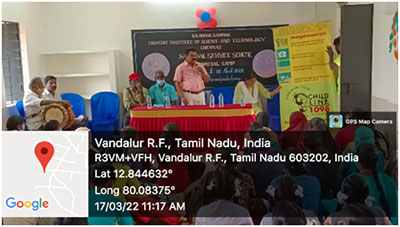
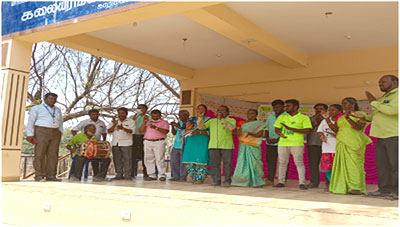
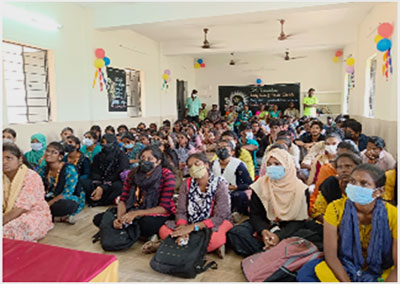
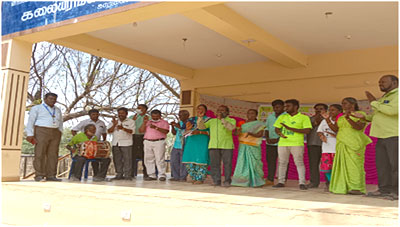
In afternoon session, students planted trees in the village premises
DAY 3 – 18.03.2022
The day started with field work in village premises for an hour. Cleaning work was continued in the village premises.
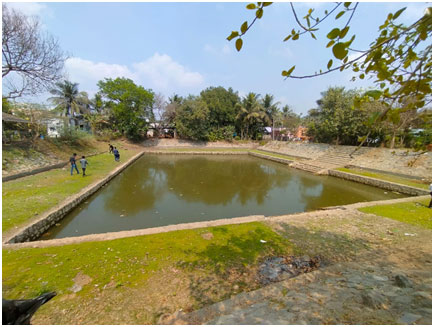
NSS volunteers cleaning the village premises
Followed by that, a wonderful presentation was given on health and hygiene by Dr.P.Arumugam, Professor and Head of Transfusion Medicine, TamilnaduDr.MGR Medical University, Chennai. He highlighted the importance of blood donation and hygiene that we have to follow for a healthy life. He elaborated the role of students in saving human life.
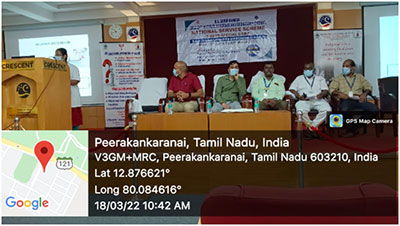
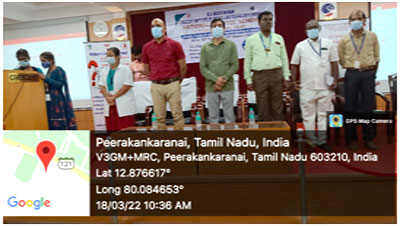
In the afternoon session, Mr. Umesh Subramanian, Senior Professional cyber security, Consultant of Ingram Micro, Chennai gave a presentation on environmental awareness. By profession he is a cyber security specialist but his major focus on society development. He is involved in many societal activities like lake renovation, environmental improvement plans etc., He insisted students role in the protection of environment and the sustainable development for future generations. He explained how the degradation in environment protection may lead a problem to all organisms in earth.

Mr.Umesh Subramanian addressing the gathering about environmental awareness
DAY 4 – 19.03.2022
Effective field work was done by NSS student volunteers in and around school premises. Clean and neat school environment may help the school students to create a good ambience for their education.
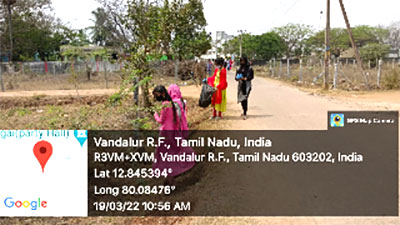
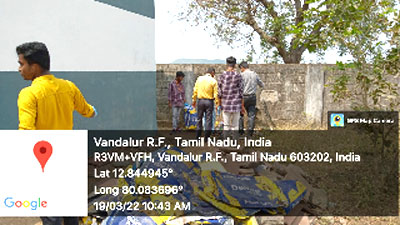
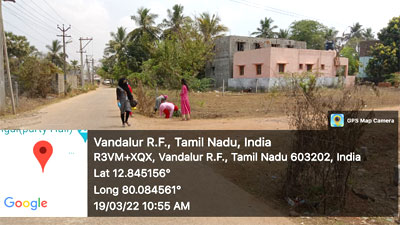
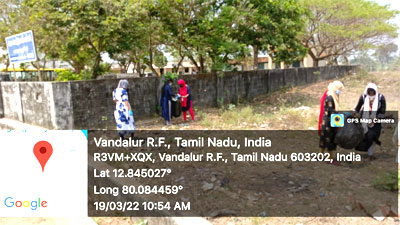
NSS volunteers cleaning the school and village premises
Three-fourth of the NSS team was involved in cleaning process and remaining members assisted in medical camp held in that village. Medical camp was supported by Tagore Medical College, Chennai.
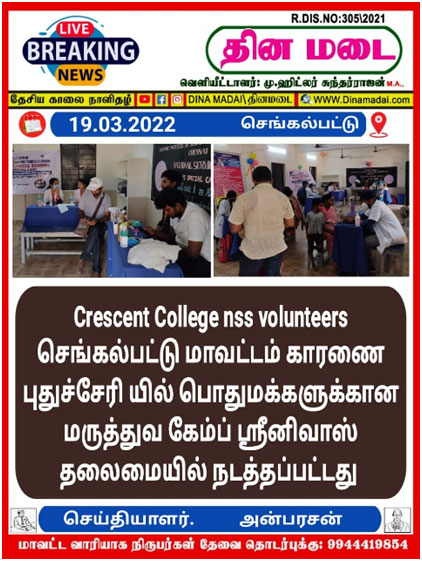
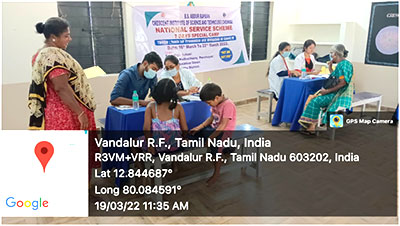
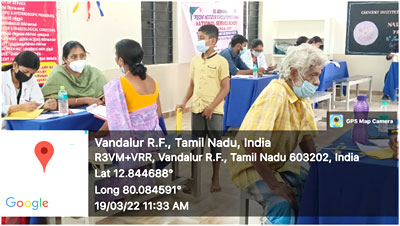
Medical Camp by Tagore Medical College supported by NSS volunteers
In the afternoon session, Dr.ZeenathZarina, Dr. ZeenathZarina, Assistant Professor of Commerce, MCC, Tambaram, delivered a guest lecture on the topic “Women Empowerment” for NSS Volunteers.
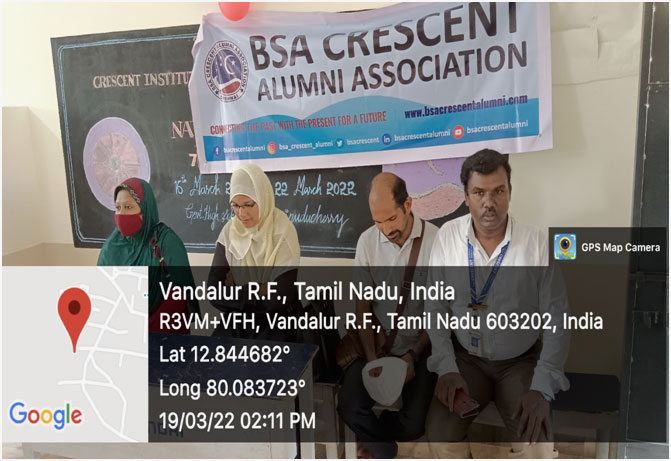
DAY 5 – 20.03.2022
A field work was done by NSS student volunteers in village and cleaned the various public places used by the community.
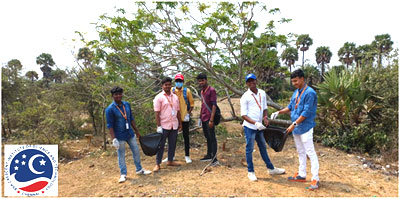
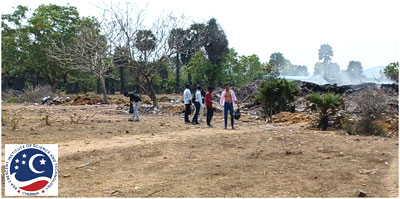
In the afternoon session, NSS volunteers conducted their filed work in BSA Crescent Institute campus. Students cleaned the water conservation area and other important area of crescent campus. All the volunteers including boys and girls actively participated in campus cleaning in the afternoon session.
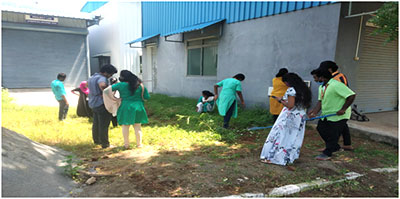
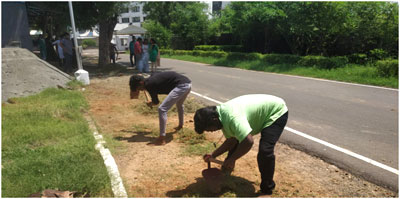
DAY 6 – 21.03.2022
A blood donation camp is conducted by the NSS unit as part of special camp with collaboration of The Tamil Nadu MGR Medical University, Chennai. The Vice Chancellor Dr. A. Peer Mohammed inaugurated the blood donation camp. Dr. A. Azad, Registrar, Dr. N.Raja Hussain, Additional Registrar and Mr. VNA Jalal, Senior General Manager Dr. D.Ayub Khan Dawood , NSS Coordinator BSACIST were present in the function. 90 unit of bloods donated by NSS volunteers to public cause through The Tamil Nadu MGR Medical University, Chennai.


In the afternoon session, a first Aid Awareness prgramme is conducted for NSS volunteers. Prof,.R.Manickam, District Secretary IRCS Chengalpettuexplained various lifesaving first aid techniques for the NSS volunteers. The session was very interactive and all the volunteers learned the first aid methods through a practical class conducted by resource person.
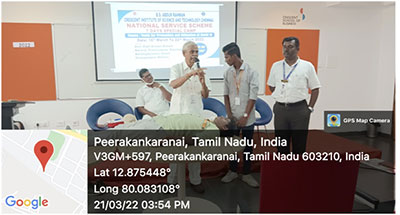
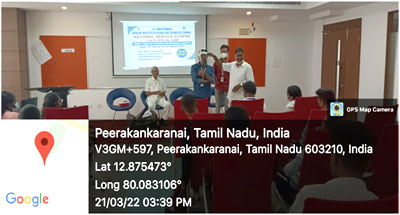
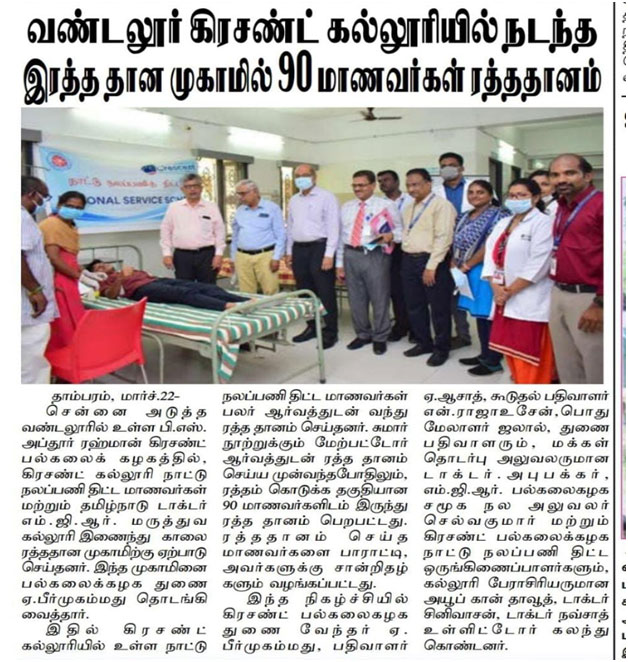
DAY 7 – 22.03.2022
Valedictory function was organized in the last day of the special camp at the Govt.High School, Karanai Puducherry Panchayat premises. The function was inaugurated by our Honourable registrar Dr. A. Azad of BSA Crescent Institute of Science and Technology. In his speech, he recollected the memory of his school days and delivered the speech on importance of conducting such special camps in the villages for the development of personality of the students particularly. He also promised to the villages such types of programmes will be conducting in the village in near future. Before, the welcome address given by the Dr. NoushadC , NSS Programme officer of the institute.The special address given by the Dr.N Raja Hussain, the Additional Registrar of the institute. Dr. Ayub Khan Dawood, NSS Coordinator of the institute and Mr. VNA Jalal Senior Manager felicitated in the function. Mrs.P.R.Suryakala, Headmistress, Government High School, Karanai Puducherrygave the gesture of happiness for conducting the special camp in their school.The NSS team distributed the sports items and dustbin for the School and Shoe and gloves distributed to village cleaning workers. Special prize distributed to the students in the school for those who have actively participated in sports completion and chess completion. The NSS special camp certificate were distributed to the volunteers. Finally, the vote of thanks given by the Ms. R.Anitha NSS programme Officer of the Crescent Institute of Science and Technology.
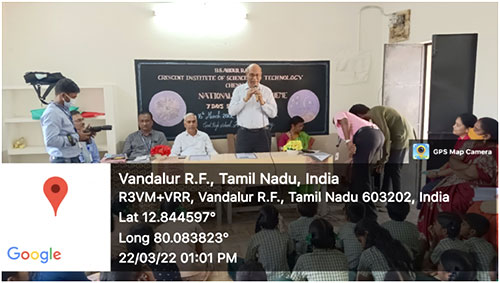
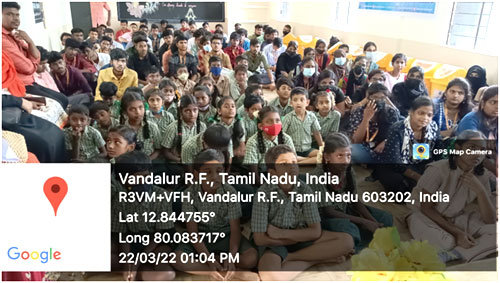

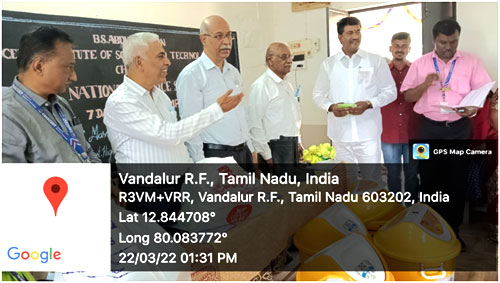
Academic Year 2020-21
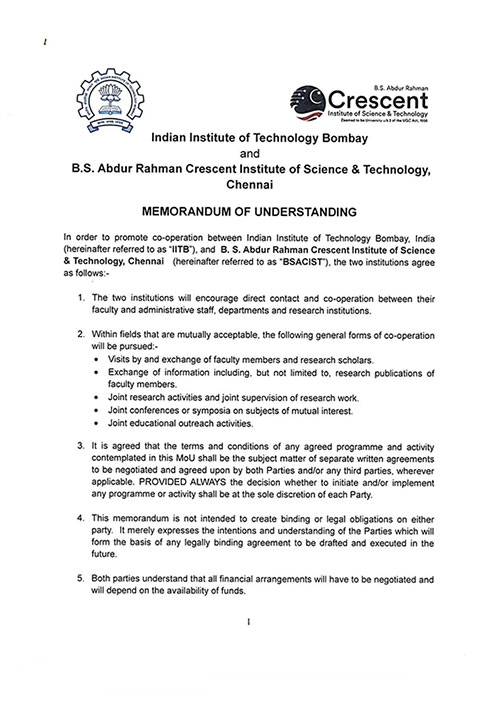

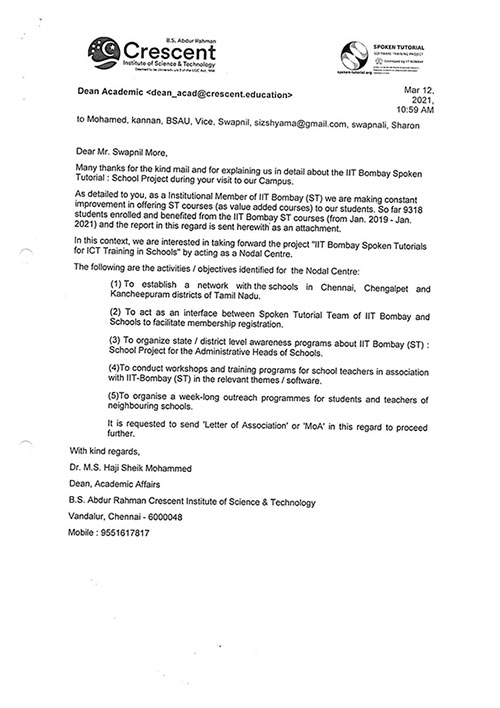
- Visits by and exchange of faculty members and research scholars
- Exchange of information including, but not limited to, research publications of faculty members.
- Joint research activities and joint supervision of research work.
- Joint conferences or symposia on subjects of mutual interest.
- Joint educational outreach activities.
- To establish a network with the schools in Chennai, Chengalpet and Kancheepuram districts of Tamil Nadu.
- To act as an interface between Spoken Tutorial Team of IIT Bombay and Schools to facilitate membership registration.
- To organize state / district level awareness programs about IIT Bombay (ST): School Project for the Administrative Heads of Schools.
- To conduct workshops and training programs for school teachers in association with IIT-Bombay (ST) in the relevant themes / software.
- To organise a week-long outreach programme for students and teachers of neighbouring schools.
- Three programmes in an academic year (September 2021 – June 2022)
- Schools targeted for each programme : 60 – 70
- The ratio of Higher secondary to Primary Schools will be 70 : 30
- Three senior administration members from each school will be invited for the programme.
- Total expected administrators per programme : 175 – 200
- Resource persons shall be from IIT B ST and our Institution.
- To facilitate schools completing the registration process by acting as a liaison. Target enrolment : Minimum 200 – 225 Schools
- Phase I (September – December, 2021) : 75 schools
- Phase II (January – March, 2022) : 75 schools
- Phase III : (April – June, 2022) : 50 schools
- To help schools in the course registration process, online examination etc.
- To motivate teachers and students to pursue ST courses by regular visit to schools and interaction with potential stakeholders.
- To conduct summer school for the students of neighbouring government schools to enhance their programming skills.
- At least 8 programmes in an Academic Year (1 programme per month)
- The Academic sessions will be conducted in the Institution by targeting minimum 25 schools with a teacher enrolment of at least 75 – 100.
- In case of a larger educational institution with an excellent IT infrastructure, the team from our Institution (BSACIST) will organize the programme in the school premises.
- The resource persons shall be our faculty members and IIT Bombay ST team.
- Issue of certificates jointly endorsed by IIT Bombay ST and Crescent (BSACIST).

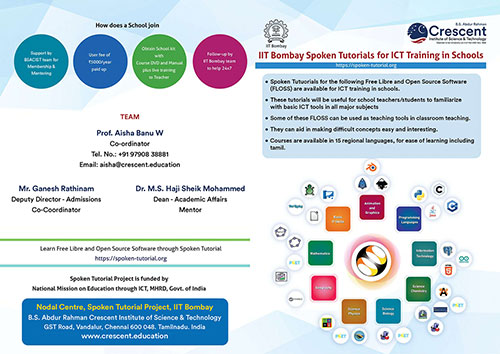
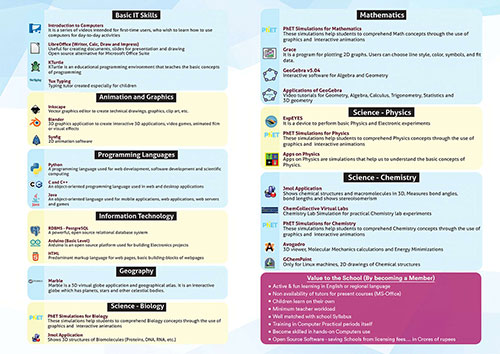
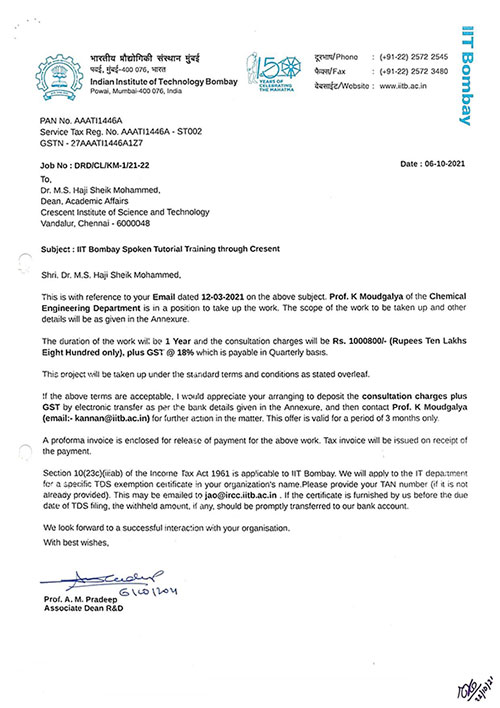
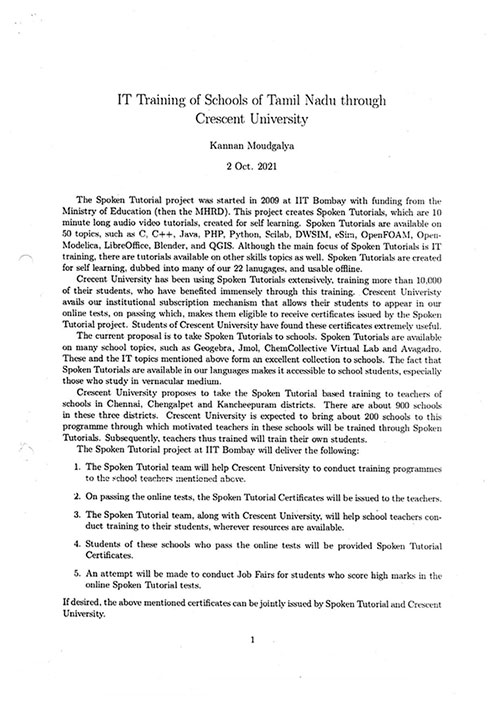
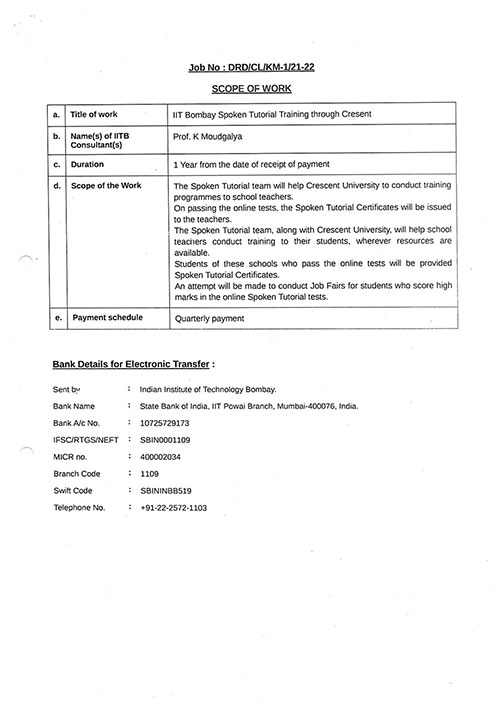
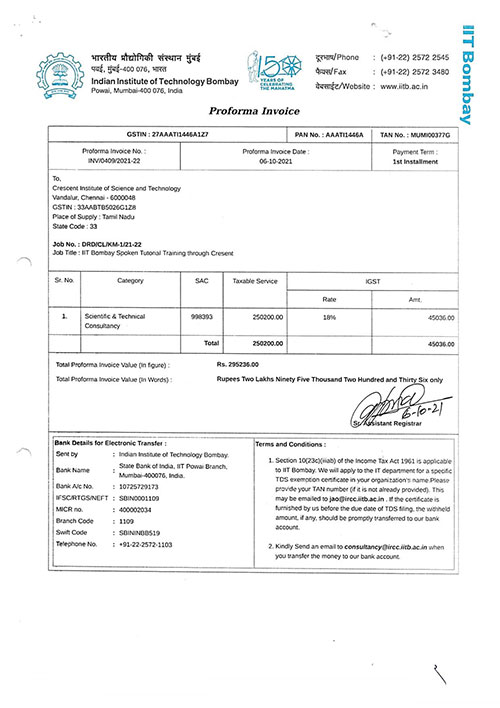

- Each course is designed in a simple and easy manner so that even a beginner can understand the content and also meet the growing needs of the learner. The digital content ensures that learning happens at all levels – Basic, Intermediate and Advanced
- The course contents mandates side-by-side practice thereby ensuring learners’ active participation.
- It provides excellent self-learning methodology since these courses are offered through regional and foreign languages, in addition to English.
- The courses can be learned at a convenient pace and time.
- The students shall be divided by Class wise (standard of study) and mapped with a course. The respective course teachers take care of enrolment, teaching-learning process and online examination.
- The ST courses are mapped to the relevant courses offered by the institution to improve the skill set of the students.
- At the End-of-Course, online tests and certificates are available for those who wish to test their expertise in the chosen software.
- These certificates will add value to students during placement.
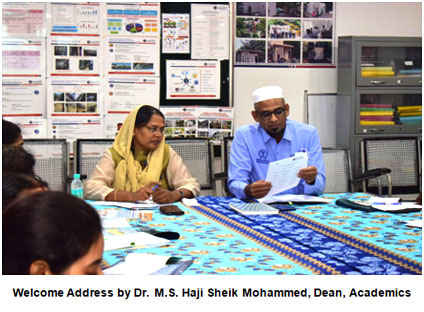


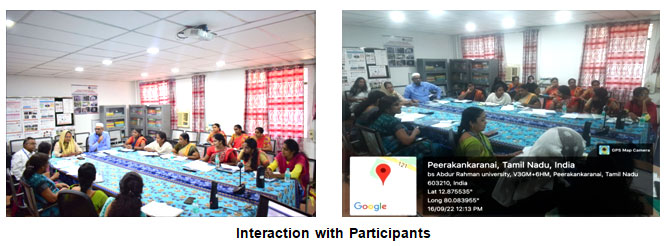
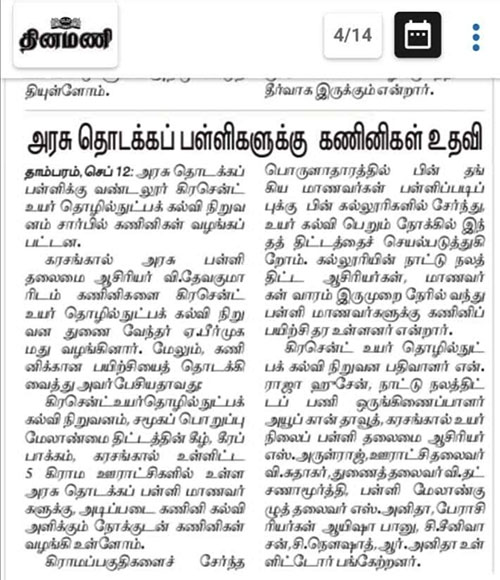
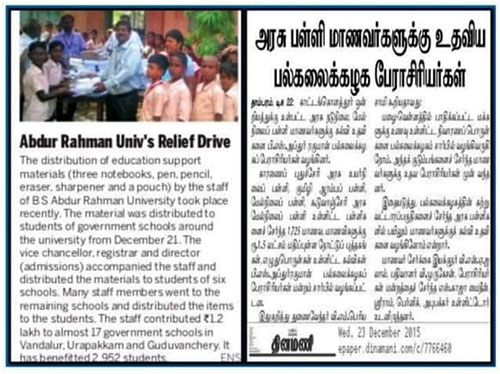
REPORT ON NATIONAL SERVICE SCHEME
SPECIAL CAMP
27.09.2021 to 01.10.2021
Venue: Panchayath Union Middle School Keerapakkam, kattankulathur Union Kancheepuram, District.
The Five days special camp has been organized by the NSS units of BS Abdur Rahman Crescent Institute of Science and Technology at Keerappakam, Arungal, and Murugamangalam panchayaths in the Kattankullathur union of Kanchipuram district of Tamil Nadu during the period of 27.09.2021 to 01.10.2021. There were various programmes and functions were organized under the leadership of the NSS units of the Crescent Institute. Programmes like cleaning of school premises, awareness of healthy food habits, importance of hygiene and sanitation, manuring and irrigation, importance of disaster management, farm pond, rainwater harvesting and conservation methods- and various sports, funs and cultural programmes for the school children’s and for NSS volunteers. The main motives for conducting the special camp is to develop the society , enlighten the villagers and NSS volunteers by giving awareness on various socio- economic issues facing by the downtrodden sections. Around 150 volunteers from the three III units of the NSS Crescent Institute of Science and Technology including boys and girls were actively participated each and every programme conducted in the village as part of special camp.
The inaugural function was organized at the panchayath Middle school Keerappakkam village. The very first day the swachh bharat mission programme was started with the welcome address of the Dr. Ayub Khan Dawood, NSS Coordinator of the institute. Earlier the programme was started by the reciting of the Qirat which was followed by the Tamil Thaivalthu. During the welcome address the Dr. Ayub Khan Dawood was discussed about the importance of conducting the swachh bharat mission in the village and what are the advantages getting by the villages while conducting the programme . The special address given by the Dr.N Raja Hussain, the deputy registrar of the institute. He showed the very interest and happy to conduct the cleaning programme in the village and explain the importance of NSS and various programmes to be conducted as part of the Swachh bharat mission. He stressed the functions and programmes of NSS for the development of society particularly and overall community generally. This will help the students from the schools for their mental and moral enrichments.
Mr. K Babu the headmaster of Keerapakkam panchyath middle school gave the gesture of happiness for conducting the special camp in their school. In his speech he stressed the importance of conducting such type of camps in the schools for the development of school generally and for the mental and moral well being for the students. Dr. Vijayprasad, Dean Crescent School of Phramacy, Mr. S Babu, BDO kattangaluathur, Mr. L Tamilselvan , VAO of Keerapakkam, Mr. D Harikrishnan ex-panchayath president of Keerapakkam, Mr. R Rajendran, ex panchayath president of Keerapakkam, were present in the inaugural function. NSS volunteers from the Crescent, school childrens, teachers from the school and general public were presented at the time of inaugural function.
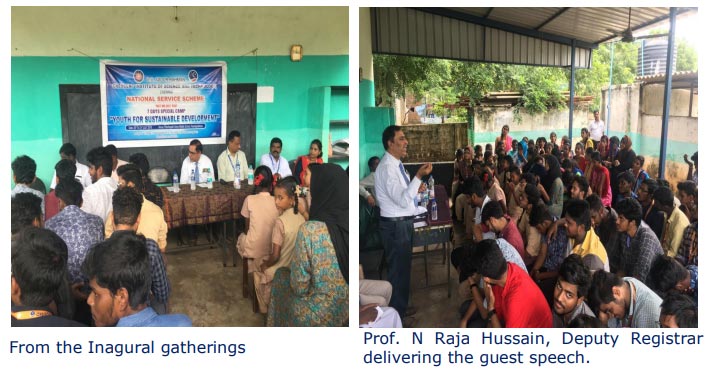

Day second started with the cleaning of both schools-Panchayath union middle school, Keerappkkam and another belong to the Arungal Panchayath Union primary school. The NSS boys volunteers were engaged in the white washing while the girls volunteers were involved in the cleaning of school ground. The school’s compound wall was not good enough to look, so Crescent NSS volunteers were initiated the cleaning of the walls by whitewashing.

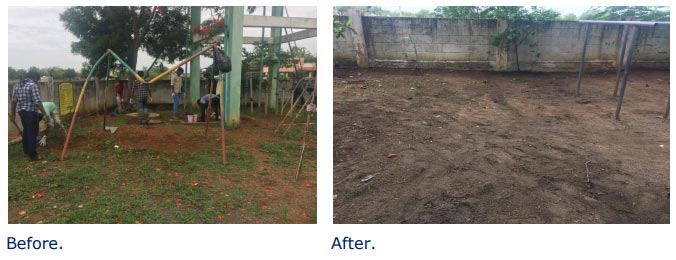
The day third started with cleaning of Crescent Institute of Science and Technology campus premises. As part of the programme boys and girls volunteers wholeheartedly participated the cleaning drive. The volunteers cleaned the areas of children’s park in the staff quarters, premises to the staff quarters, the way to the staff quarter which is near to the basketball quart and the way from the staff quarters to the college. More than 60 volunteers participated in the progamme.

The fourth day started with white washing of the two schools. Panchayath Union middle school, Keerappakkam and Panchayath primary school at Arungal. Both schools’ compound wall has been whitewashed by our volunteers. After the white washing Dr. Geetanjali, President of IWC, KK Nagar gave a guest lecture on healthy food habits. In her talk she gave an idea about the importance of healthy food among the teenagers especially among the girls. The talk was very interesting and thought provoking. Dr.
Parimala BSMS, PGDYM, Appolo Hospital Chennai had delivered the lecture on Importance of Hygiene and sanitation. The talk was very useful for the girls volunteers, especially they got awareness of importance of Hygiene during the menstrual period. After that Ms. Harini, Chairman, International service organization gave a talk on the evils of plastic. In her talk she gave wonderful narration about the disadvantages of usage of plastic in our society.
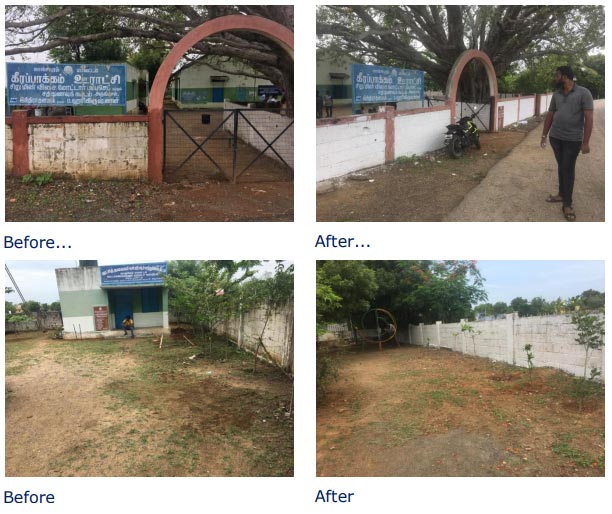

The Keerappakkam panchayath Union middle school’s was again engaged for cleaning the playground. Too much bushes and grasses were there in ground and due that it was unused for playing. So our Crescent NSS volunteers cleaned the entire area of the ground and makes it better and comfortable place to play. As part of the cleaning programme Crescent NSS donated one volleyball net and one volley ball to the students of the school. As tone of happiness Crescent Institute gifted two ceiling fans for the Panchayath Union Middle school and further offered four computers for giving computer awareness to the students in the school.
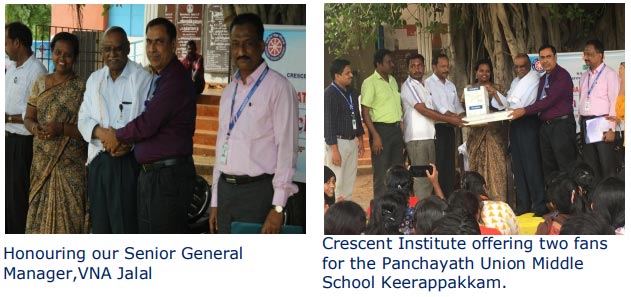
The tree plantation drive was arranged in the Keerappakkam panahcyatht premises. The tree sapling drive was inaugurated by our Honourable registrar Dr. A. Azad of BSA Crescent Institute of Science and Technology, by planting a tree. Followed by the tree plantation an awareness programme were organized among the villagers in order to provide an understanding about the tree plantation, manuring and watering the trees. More than 100 tree sapling were planted in the three villages of the special camp.

Valedictory function was organized in the last day of the special camp at the Keerapakkam panchayath middle school premises. The function was inaugurated by our Honourable registrar Dr. A. Azad of BSA Crescent Institute of Science and Technology. In his speech, he recollected the memory of his school days and delivered the speech on importance of conducting such special camps in the villages for the development of personality of the students particularly. He also promised to the villages such types of programmes will be conducting in the village in near future. Before, the welcome address given by the Dr. Ayub Khan Dawood, NSS Coordinator of the institute. Mr. K Babu the headmaster of Keerapakkam middle school gave the gesture of happiness for conducting the special camp in their school and Honored our Registrar with a shawl. NSS special camp certificate were distributed to the volunteers. Finally the vote of thanks given by the Ms. Sonya NSS programme Officer of the Crescent Institute of Science and Technology.
